

Sustainable Tourism in Thailand – Ecotourism, Wildlife and Culture Guide
- Last Updated: January 19, 2024
Thailand, the Land of Smiles, has firmly cemented itself as one of the most popular tourist destinations on the planet.
With 39 million people visiting the Southeast Asian nation in 2019 , the word is well and truly out on just how magical Thailand really is.
The international tourism industry in Thailand really started back in the 1970s, when travellers made their way here along the old ‘Hippie Trail’ from England.
This paradise was their reward after months of tough overlanding, with swaying palm trees, white-sand beaches, hospitable locals, and some of the tastiest food imaginable.
Today the magic is still alive and well in Thailand, and with so many incredible places to visit , it’s the kind of place you can visit again and again and always discover something new.
Locals welcome tourists with open arms, excited to show their local culture and customs to visitors and to improve their own livelihoods through businesses that cater to international travellers.
The impacts of the tourism industry on Thailand haven’t always been positive though, and with the growing number of people coming every year, there has been a number of issues arise.
As a responsible traveller , it’s important for us all to do our part to protect the countries we visit, including the environment, culture, local community, and wildlife.
READ MORE: Don’t miss our comprehensive guide to sustainable tourism .
Table of Contents
Closing Popular Tourist Destinations
‘no foam no plastic’, new heaven reef conservation, elephant nature park, the soi dog foundation, the gibbon project, phuket, bangkok tree house, soneva kiri – koh kood, rabeang pasak treehouse resort – chiang mai, always show respect to the king, do not turn your back towards buddha, watch where you point your feet, do not touch a person’s head, show respect to the monks, dress modestly, cover-up in temples, do not raise your voice, try to learn a few thai words, barter, but don’t be extreme, long-neck tribes, minimise your plastic use, do not litter, take public transport where possible, oceans and marine parks, travel off the beaten path, local community based tourism in thailand, sustainable tourism in thailand – the ultimate guide.
We’ve been fortunate enough to spend almost an entire year travelling and living in Thailand, and it is honestly one of our favourite countries in the world.
As part of our travels we’ve seen the best, and worst, of tourist behaviour and impacts here, which is why we have published this guide.
We are big advocates for sustainable tourism, and we are pleased to see it’s not just a global trend, but a movement that even the Thai government is taking very seriously.
Before you decide to travel to the Land of Smiles, make sure you read up on these tips and ideas on how to travel to Thailand responsibly.
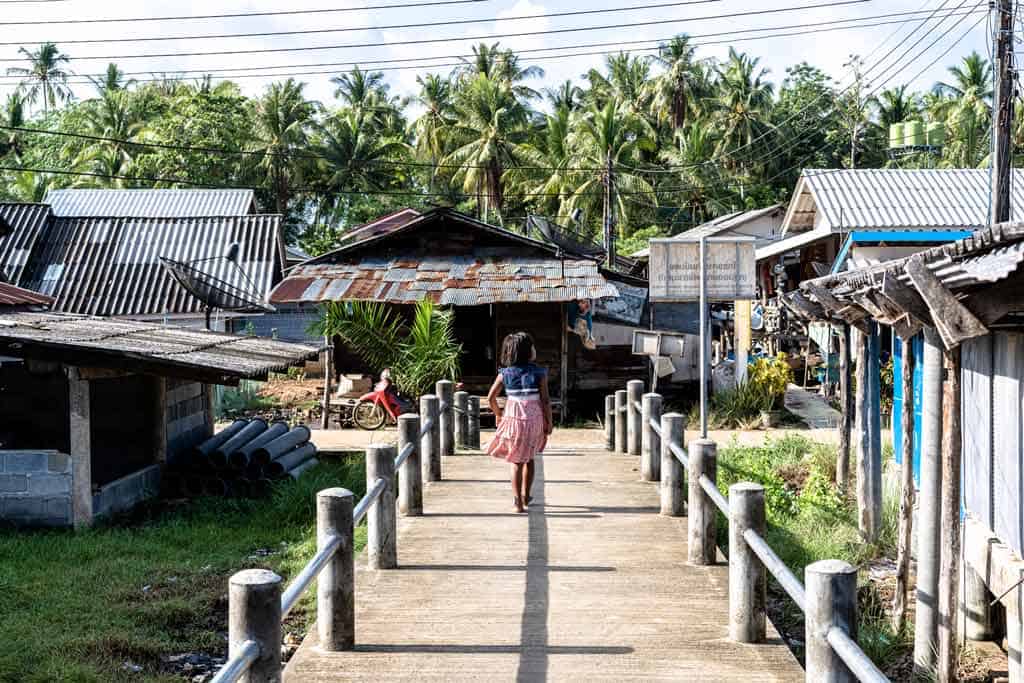
The Thai Government’s Own Initiatives
In recent years, the Thai government has seen the impacts of the tourism industry, both positive and negative, and has taken a firm stance to improve sustainability throughout the Kingdom.
It’s uplifting to see a government take what may seem like drastic measures to protect their own environment and local culture, and they have become an example to other Asian nations on how sustainable tourism can really be beneficial.
To read more about this, be sure to check out their dedicated website, 7 Greens .
Here are some examples of what they have done in recent years.
Every year the Department of National Parks, Wildlife and Plant Conservation takes extreme measures to protect the most heavily-visited regions of the country by closing them to tourists.
The biggest example of this when Thailand closed Maya Bay, the island close to Koh Phi Phi , which was made famous when featured in the movie The Beach.
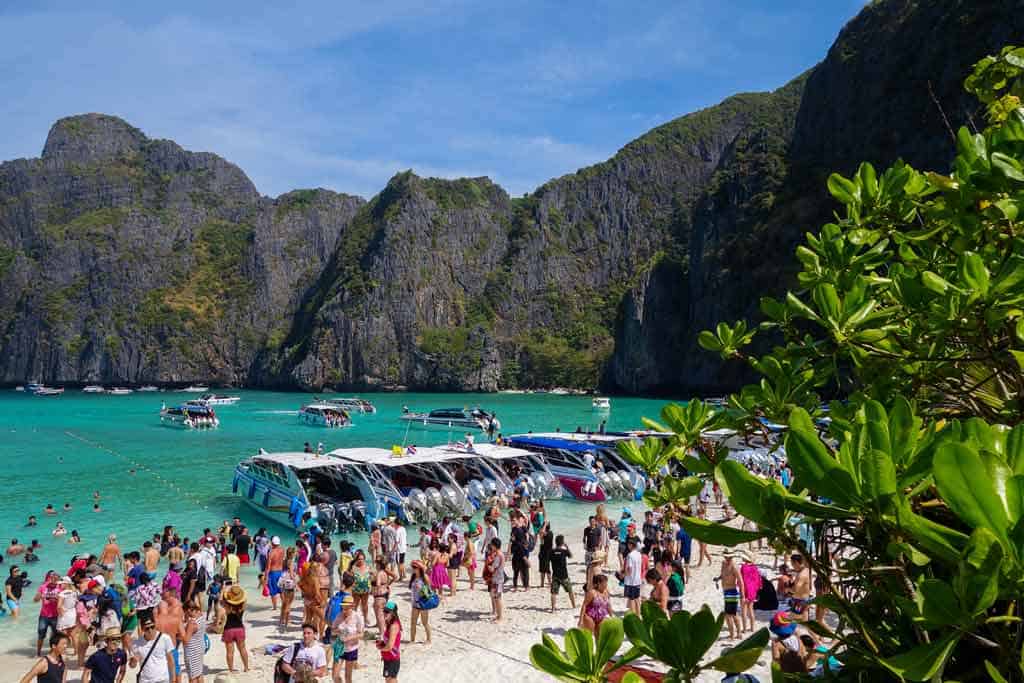
Over the years Maya Bay became a victim of its own beauty, with millions of tourists flocking into the narrow cove.
The huge numbers of people resulted in severe damage to the ecosystem, with marine life disappearing, waters becoming polluted and trash piling up.
The government closed access to the island in June 2018, citing the need for it to recover.
They are doing similar things to other popular destinations, often during the rainy season when the environment is at its most fragile, and are seeing excellent results.
On some of the most popular beaches in Thailand, the government has completely banned smoking.
They saw the damage cigarettes were doing, with tourists and locals leaving their butts on the ground, and the smoke causing health issues, and decided to remove the problem completely.
This ban is in effect in Phuket, Phang-nga, Krabi, Trang, Samui, Hua Hin, Cha-am, Chon Buri, Rayong and Trat.
The other big initiative that the Thai government and local businesses have introduced as of August 2018 is banning single-use plastics from all 154 national and regional parks around the country.
And in 2020 Thailand took it a step further by banning single-use plastic bags, with an aim to have these completely eradicated from all stores by 2021.
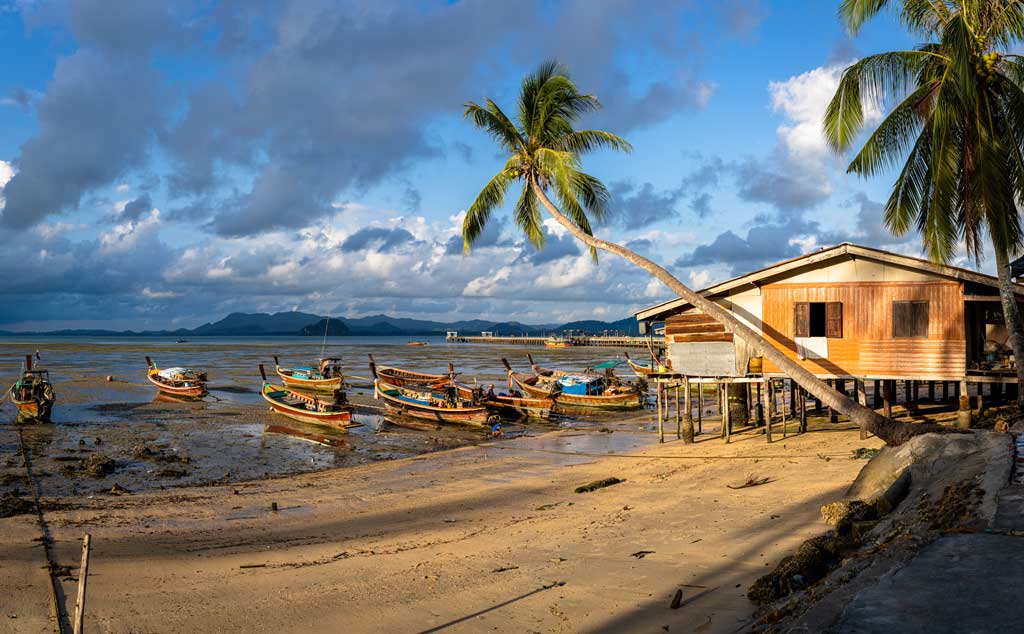
Ecotourism in Thailand
What is ecotourism? It is defined as: “tourism directed towards exotic, often threatened, natural environments, intended to support conservation efforts and observe wildlife.”
The concept of ecotourism in Thailand isn’t new, but it was always more of a niche offering compared to the typical resort-style travel that many visitors would do.
Today it is a different story though, and more and more businesses are incorporating ecotourism practices into their products.
You can find a variety of conservation projects in Thailand, focused on sustainable travel and environment and wildlife protection.
Environment Conservation Projects
Here are some of our favourite conservation projects focusing on sustainable travel and the environment:
Based on the spectacular island of Koh Tao, the New Heaven Reef Conservation , this organisation runs marine-specific courses and projects to protect and study the underwater world in the Gulf of Thailand.
Trash Hero is an initiative that has gone global but was started right in Bangkok.
According to their website, “TRASH HERO is an energetic, volunteer-led movement that drives change within communities around the world, motivating and supporting them to clean and prevent plastic waste.”
So next time you’re in Bangkok, get in touch with them and join the crew for a waste clean-up.
Wildlife Conservation Projects
We’ll go into the wildlife activities further below in the article, but there are some excellent wildlife conservation projects that you can support when practicing sustainable travel in Thailand.
By far the best elephant sanctuary and conservation project in Thailand, Elephant Nature Park has been committed to protecting elephants since 1998.
Founded in Chiang Mai by the incredible Thai lady, Lek, ENP now has a number of projects around the country, as well as in Cambodia and soon Myanmar.
You can visit Elephant Nature Park for a day, or even volunteer for up to a month.
The Soi Dog Foundation has made it their mission to protect the thousands of stray dogs that are found all over Thailand and to end the dog meat trade in Southeast Asia.
You can help out by donating to their cause, or volunteering when in Bangkok or Phuket.
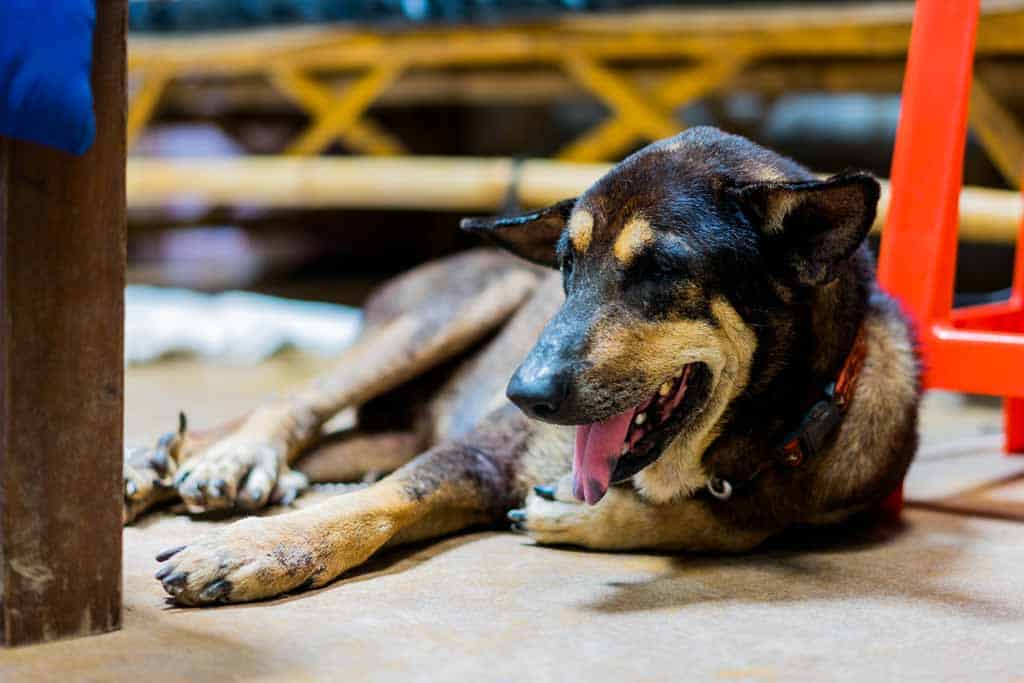
The Gibbon Project is a fantastic conservation initiative that can be found in the popular resort town of Phuket.
The project rescues and rehabilitates these gorgeous, yet endangered, monkeys and then reintroduces them into protected natural habitats.
You can visit their facility in Phuket if you book ahead.
Wildlife Activities
Thailand is home to several impressive wildlife species, which many tourists naturally want to see when they travel to the country.
In general, the best way to stay responsible when it comes to travelling in Thailand is to not take part in any activity that exploits wildlife.
Perhaps the main animal people would like to see in Thailand is an elephant.
These beautiful, intelligent, and enormous creatures live deep in the jungles of Thailand and have been a part of local culture for centuries.
But did you know there is an estimated 3800 captive elephants in Thailand, with perhaps less than 1000 in the wild ?
One popular activity is to ride an elephant in Thailand, however, this is actually a very irresponsible thing to do for several reasons.
- An elephant, while very strong, has not evolved to carry weight on its back.
- The process of ‘breaking’ an elephant in order for it to be safe around tourists is extremely distressing.
- Elephants used for riding are often overworked and malnourished in order to maximise their profit margin.
It is extremely important that you never ride an elephant, no matter how much you think it would be ‘fun’ or ‘cool’, and never visit an elephant show where they are forced to perform tricks.
Instead, it is much more wholesome to visit a reputable elephant sanctuary where the animals have been rescued and placed in a protected natural environment to live out their lives the way they were meant to.
Spending time around an elephant is an experience you will never forget, and is something you absolutely should do while visiting Thailand, but please do so in an ethical and responsible way.
We highly recommend the following sanctuaries:
- Elephant Nature Park in Chiang Mai
- Surin Project in Surin
- Elephant Haven in Kanchanaburi
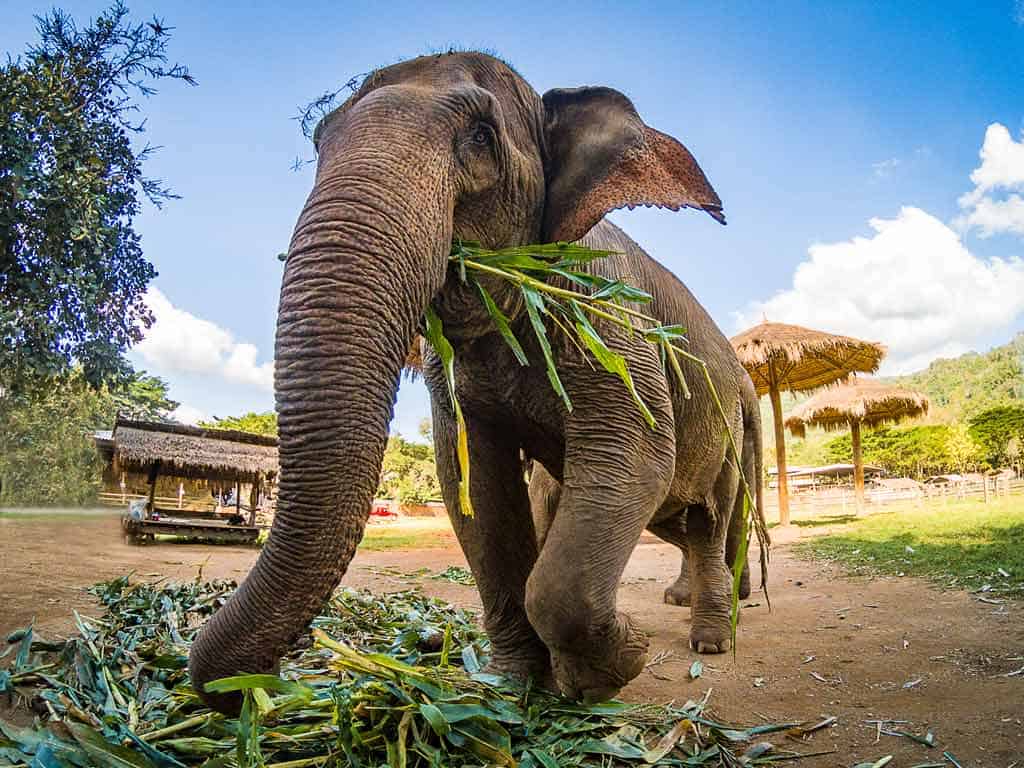
Another popular attraction for first-time visitors to Thailand are the ‘Tiger Temples’ that offer the chance to get up close and personal with a tiger.
As tempting as it is to get your selfie with a tiger, the truth is that what happens behind the scenes at these places doesn’t always have the tigers’ best interests at heart.
A tiger sanctuary in Kanchanaburi was raided in 2016 due to suspected trafficking and illegal breeding, and the Thai government ultimately seized all the animals that were on the property.
So where can you see a tiger in Thailand?
The World Wildlife Fund estimated that there are only 189 tigers in the wild , so unfortunately the chance of seeing one in the wild is very slim.
It’s not all bad news though. Tigers have recently been caught on tracking cameras in the far north of the country, showing that they are starting to make a comeback thanks to the Thai government’s restrictions on poaching and illegal logging.
There are currently no ethical tiger sanctuaries in Thailand.
There are five different types of monkeys in Thailand, and you will find them everywhere.
If you head to the south of the country they are extremely prominent around the islands, especially in places like Krabi.
Seeing them is always quite exciting, however, just like elephants, many macaques in Thailand have been captured and forced to perform tricks and shows for tourists.
Don’t support these shows, and instead hope to see some monkeys in the wild.
READ MORE: Be sure to read our comprehensive guide to travelling Thailand here .
Eco-friendly Accommodation in Thailand
Thailand has every style of accommodation you could ever imagine, from world-class 5-star resorts to basic bamboo shacks.
When it comes to choosing the level of luxury you want, the limit really is only your wallet.
However, on an eco level, the 5-star resort might be worse than the bamboo shack when it comes to looking after the environment.
This can be for a number of reasons, whether it is due to overtourism, large resorts not being able to control their environmental footprint properly, or putting an emphasis on profits.
And the larger the resort, the larger the impact. That’s why it’s important to look for eco-friendly accommodation when you practice sustainable travel in Thailand.
So what makes a hotel or guesthouse eco-friendly?
We wrote a dedicated post on how to choose sustainable accommodation here , but let us give the main pointers again.
This is what a hotel can do to try and focus more on sustainable travel:
- Limiting energy consumption
- Limiting water consumption
- Reducing waste production
- Using renewable energy
- Promoting environmental education
- Contributing profits to green charities
- Using recycled and locally-sourced products
It seems pretty straightforward, and in all likelihood, you’re probably doing a lot of these things in your own home as well.
But when it comes to the hotel industry, it’s easy to do what is known as ‘greenwashing’, where they claim to be eco-friendly by doing a few things like telling guests to watch their water use, but then don’t do anything else on their end.
We recommend you give the article above a good read to get a better idea of this, but for now let us showcase some of the best eco-friendly hotels in Thailand.
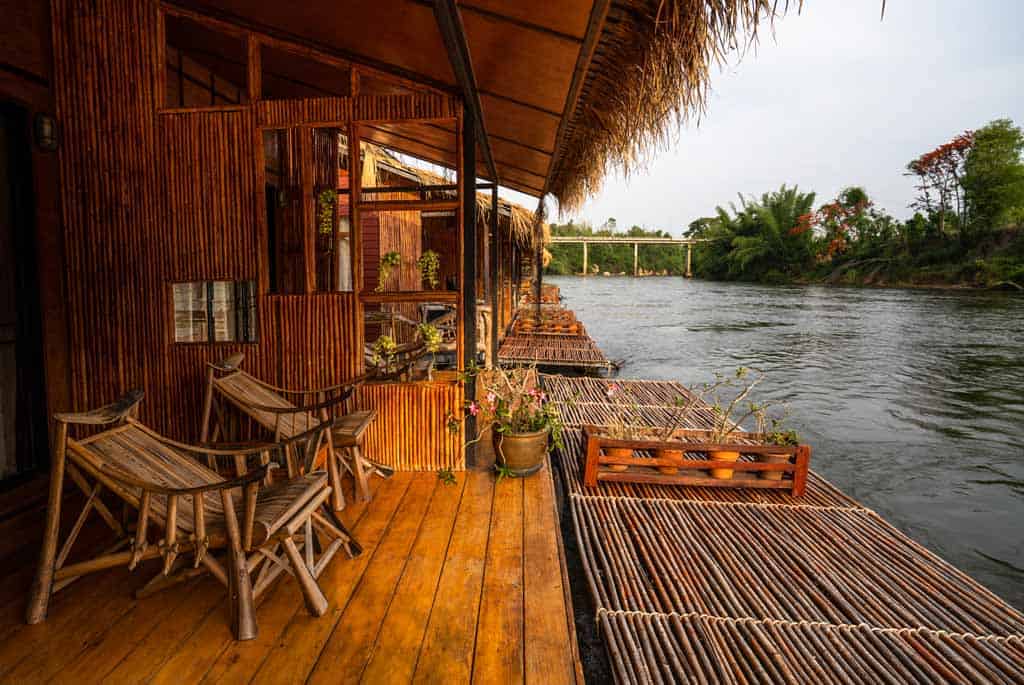
Located in a literal jungle deep in the urban jungle of Bangkok, the Bangkok Tree House is one example of an accommodation that is not only doing their part to protect the environment, but also providing a unique experience for their guests.
Their ‘nests’ live high in the canopy, and you’re sure to fall in love with what they have built.
Bangkok Tree House is also fully committed to being green, and they’ve minimised their carbon footprint in every way possible.
They also use vertical gardens to grow their food and vegetables, and recycle or reuse all of their materials.
The island of Koh Kood is the go-to destination for lovers of luxury, and the swaying palm trees over powder sand beaches is a real drawcard.
If you do visit, we recommend staying at the number 1 eco-resort on the island – Soneva Kiri .
This is the one place where you can splurge out for an unparalleled experience (each villa comes with private infinity pools and a personal butler), knowing that your money is supporting community-based tourism and protecting the environment.
Soneva Kiri puts their profits towards coral restoration projects and supporting local communities, raising close to $6 million for people in need.
They are also completely carbon neutural and a pillar of sustainable travel.
If you’re travelling on a budget but still want to do what you can to support sustainable travel and ecotourism in Thailand, it’s worth checking out Rabeang Pasak Treehouse Resort in Chiang Mai.
The property is made up of sustainably-built treehouses just outside of the city, set in a stunning forest landscape with a focus on minimising their footprint.
The eco friendly facilities are basic, but you’ll fall in love with the simple way of living surrounded by the sound of nature.
Culture and Customs – Respecting the Locals
You may feel that sustainable tourism is all about protecting the environment and wildlife, but there is another element that needs to be considered – the human element.
One of the big rewards of travelling the world is having the chance to learn about new cultures, and in Thailand, the culture is one of the most fascinating you can encounter.
The predominantly-Buddhist nation is built on the ethos of kindness, hospitality and respect, and as soon as you touch down here for the first time you’ll know exactly what we mean.
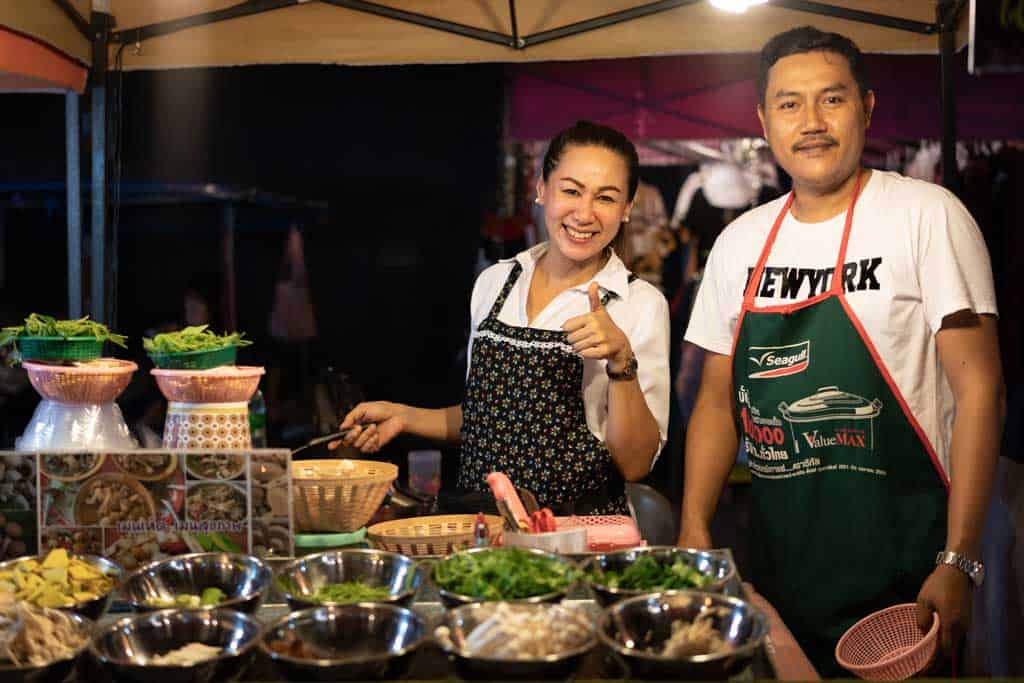
People bow (known as wai) to greet to each other with a warm “Sa wa dee”, and they finish each sentence with “ka” or “krup”, depending on whether they’re addressing a male or female, as a sign of courtesy and respect.
A visit to a Buddhist temple also gives a unique insight into the beliefs of the Thai people, and one of the best things you can do is simply sit and watch as they pray and make their offerings to get a better understanding into what Buddhism is about.
It’s important to open your heart and mind to these local customs when you travel to Thailand.
Things may be different to what you’re used to at home, but isn’t that the joy of travelling?
There are a number of unique customs that Thai people have that you should keep in mind and respect when visiting the country.
Here’s a breakdown of the most important ones.
The King of Thailand is the most revered person in the country, and Thai people love him dearly.
Do not show any disrespect towards him or the Royal Family (in fact it is against the law to do so) by talking negatively about them.
Anything with their likeness on it is also considered important, such as the local money that has the King’s portrait printed on it, so be careful not to cause any damage to this.
As an example, if you drop a note, do not step on it with your feet to stop it from blowing away, as this is considered disrespectful. Instead, pick it up with your hand.
When visiting a Buddhist temple, always face the Buddha and don’t turn your back towards him.
The proper way to exit a temple is to walk backwards to the door, turn at the last minute.
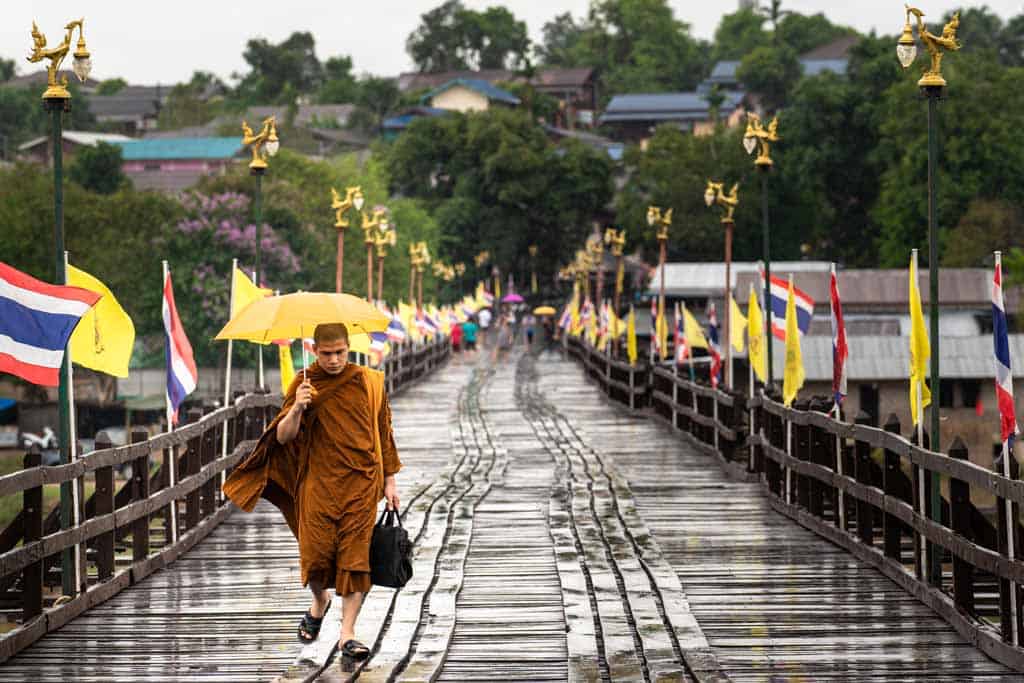
The feet, being the lowest part of the body, are considered to be dirty, and as such make sure you never point your feet towards somebody on purpose.
That is why Thais tend to sit on their feet or cross their legs, rather than sitting with their feet spread out in front of them – to make sure they don’t point them at another person, or Buddha.
The opposite of the feet, a person’s head is considered to be the most important part of the body, and it is disrespectful to touch somebody’s head.
When you see a Buddhist monk, whether it’s in a temple or out in public, always show respect to them.
Ways you can do this are to bow when they walk past, try to keep your head level below theirs (remember, it’s the most important part of the body), and giving up your seat for them.
Thai people are very modest and can be somewhat conservative. So you should make sure you always dress appropriately.
As an example, when you’re at the beach it’s ok to wear swimwear, but when you leave the beach make sure you cover up.
Do not wear a bikini or no shirt into a store or restaurant, and don’t walk around town showing excess skin, as this may make some locals feel uncomfortable.
As a good rule of thumb, look around at what the locals are wearing. If they’re not in a bikini, you shouldn’t be either, no matter how hot it is.
As an extension of dressing modestly, if you are entering a temple, make sure you wear appropriate clothing.
This includes covering your shoulders (ladies can usually get a sarong at the door to do so).
Thai people hate confrontation and raising your voice and yelling is one of the most disrespectful things you can do.
Even if you’re feeling frustrated at a lack of communication, or feel as though you may be getting taken advantage of in a transaction, keep your cool and speak in a normal tone.
You will achieve nothing by screaming at somebody, and you will lose all respect.
Always be polite, and the locals will be the same to you.
The Thai language is notoriously difficult to learn for English-speakers, and nobody expects you to become fluent in Thai during a holiday.
But locals will be very appreciative if you at least put a little bit of effort into speaking their own tongue.
Just pick up the basics, such as hello, thank you, how much, goodbye, and perhaps try to count to 10.
If you are shopping for souvenirs in a market, it’s normal to barter, but don’t go over the top and try to negotiate an extremely cheap price.
You might think it’s a game, but remember that the locals need to make a living too, and a few dollars here and there will help them out a lot more than it will you.
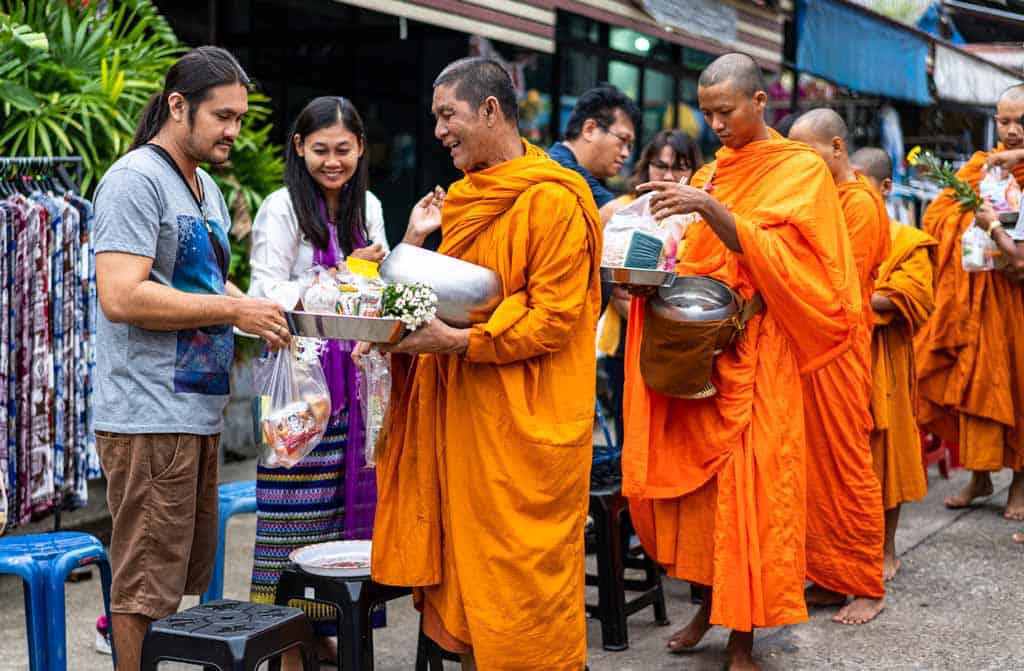
Unethical Attractions Involving People
On an ethical level, there are a number of tourist activities and attractions that exploit the wonderful local people of Thailand.
As a general rule of thumb, be very cautious about joining any cheap tour that involves a visit to a minority tribe, involves children, and sexual exploitation attractions such as the infamous Ping Pong Shows of Phuket and Bangkok.
These are some of the most important ones to avoid.
In the north of Thailand, the famous long-neck tribes from the Karen and Kayan ethnic minority communities have been a unique example of where a tradition has been exploited for tourist reasons.
Many travellers want to come to these remote villages to see the practice of women putting rings around their necks to elongate them.
But what few people realise is that this tradition causes extreme health problems.
In fact, many of these communities have expressed a desire to stop putting themselves through such a problematic modification of their bodies, but there is one reason to continue it – tourist dollars.
If it wasn’t for international tourists spending money to visit their tribes, they would stop the practice and return to their normal lives.
Another issue is that most of the money from these hill tribe tours don’t actually go to the local communities. Instead they are kept by the operators, and the villages make their money by trying to sell handicrafts.
Over the years the concept of ‘voluntourism’ has become popular for many visitors who wish to give back to the communities they are visiting.
While this is a noble idea, and for the most part people’s hearts are in the right place, there are issues with this type of tourism.
The biggest concern is when it comes to visiting orphanages.
Unfortunately there are several children who have been orphaned in Thailand, and it’s only normal to want to help them.
But unless you have experience with child care in these exact environments and are planning to stay for a long time, a day trip to an orphanage isn’t the best way to do this.
Instead the best way to help is to donate money and supplies through reputable charities.
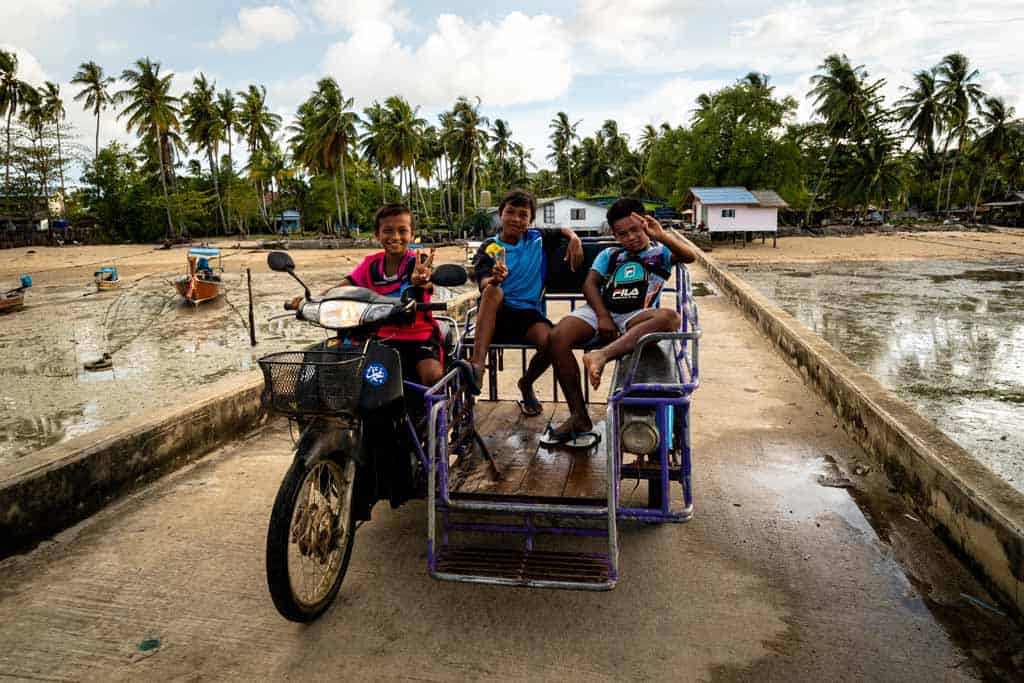
Protecting the Environment
Thailand really is one of the most beautiful countries in the world, and it has almost every type of landscape you could wish for.
When you decide to visit, it’s important to minimise your footprint and protect this spectacular environment.
Here are the best ways to do just that.
While Thailand is taking steps to remove all single-use plastics by 2021, you can do your part as well by bringing your own reusable items.
Make sure you add these to your Thailand packing list :
- A reusable water bottle. Not only can you usually refill these from large jugs at your accommodation, Thailand also has reverse osmosis machines on almost every city block so you can get drinking water for as low as 1THB per litre.
- A carry bag. Don’t take a plastic bag when you shop, and instead bring your own cloth one.
- Metal cutlery. You’ll most likely be eating a lot of delicious food on your trip, but don’t just always grab the plastic cutlery available. Throw your own in your bag and save on waste.
This one is pretty self-explanatory, but you’d be amazed at how many tourists we’ve personally seen throw their rubbish on the ground or off the side of a boat.
Under no circumstance should you ditch your rubbish anywhere but in a bin.
No matter how much of an inconvenience it is to carry until you find one, do not contribute to polluting the earth by being careless.
Carbon emissions from airplanes and vehicles are quite high around the world, but you can minimise your own carbon footprint in a few different ways.
First of all, don’t take any more flights than you absolutely have to. For example, rather than flying from Bangkok to Chiang Mai, why not take the train?
Second, always go for public transport where possible. Take a public ferry or songthaew instead of renting a private boat or car.
Third, and even better for the environment, walk or rent a bicycle to get around.
Take extra care when spending time in the stunning Andaman Sea and Gulf of Thailand.
Plastic and trash often end up in the oceans, killing marine life and polluting the sea for future generations.
Also try to avoid any overcrowding of popular destinations. The last thing we need is another Maya Bay catastrophe.
Another way you can protect the oceans is to never touch sea life or coral.
This includes standing on reefs when snorkelling or swimming, and not collecting souvenirs from the sea.
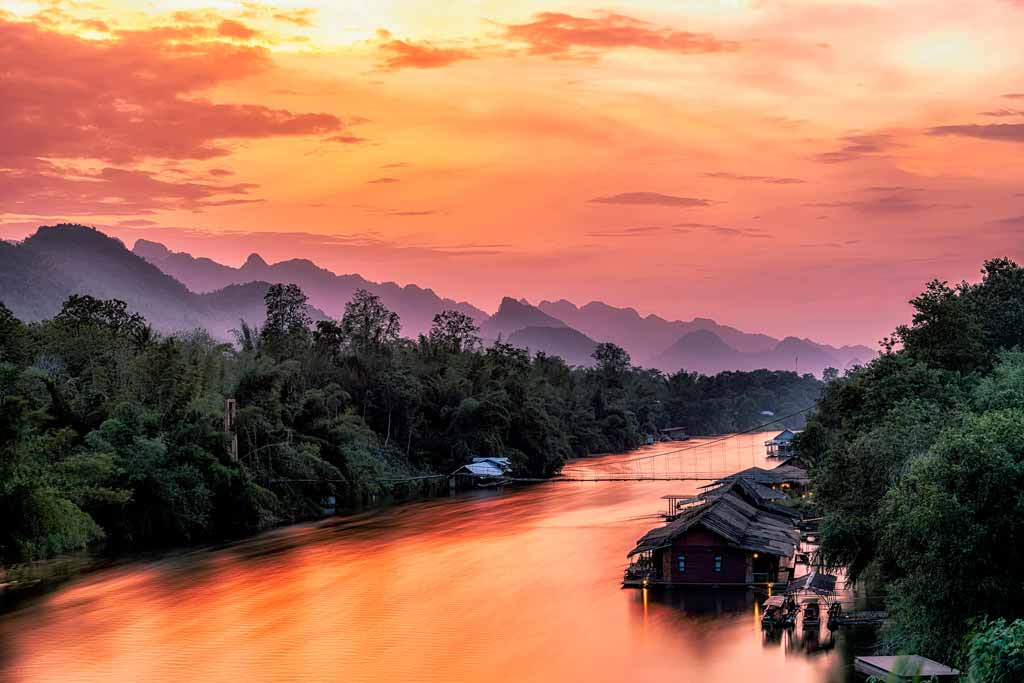
Avoiding Overtourism
Overtourism is when the amount of visitors a place receives reaches a level that is no longer sustainable from an environmental or societal viewpoint.
We’ve dived deeper into overtourism and ways you can combat this in this detailed guide , but we’d like to give some ideas here on how this applies specifically to Thailand. These tricks will help you navigate the tourism industry in a responsible way.
Rather than spending all your time in the most popular destinations in Thailand, consider visiting places that fewer tourists get to.
For example, Chiang Mai is absolutely incredible and definitely deserves a few days to explore, but when you’re finished here you can visit the lesser-visited Mae Hong Son.
Down in the south get out of Phuket and check out Trang or Koh Mook instead.
The benefits of getting off the beaten path is that you’ll have the chance to spend time in places that not as many international tourists see, and you’ll spread your tourist dollar to communities that really need it.
Finally in our sustainable tourism in Thailand guide, we will touch on the concept of local community based tourism.
Local community based tourism is where a visitor spends time in a local village and spends their money directly with vendors and small businesses rather than big operators or companies. Putting your energy and money into community based tourism rather than the big tourism industry is a great way to support the locals.
This simple mindset and action when travelling can have tremendous benefits for a local community and economy, and in a country like Thailand it is very easy to do.
Just like getting off the beaten path, we recommend you visit places that don’t see as many tourists and booking accommodation and activities directly with businesses.
You can spend the night in local guesthouses or eat at local restaurants to help inject your money directly into the local communities. There are many ways to try local community based tourism!
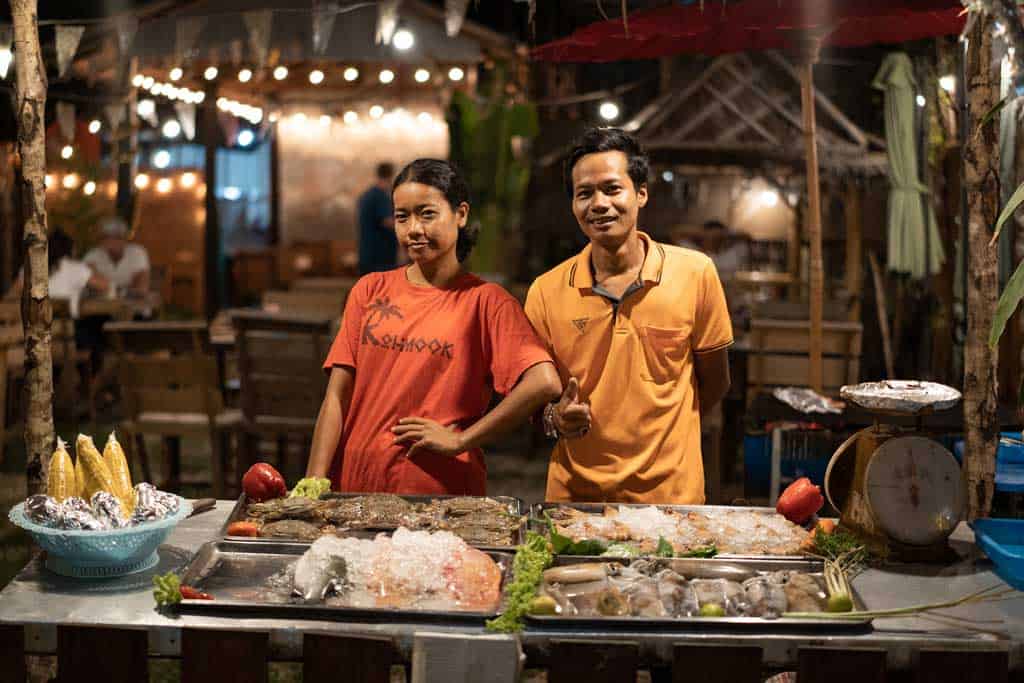
Alesha and Jarryd
Hi, We’re Alesha and Jarryd!
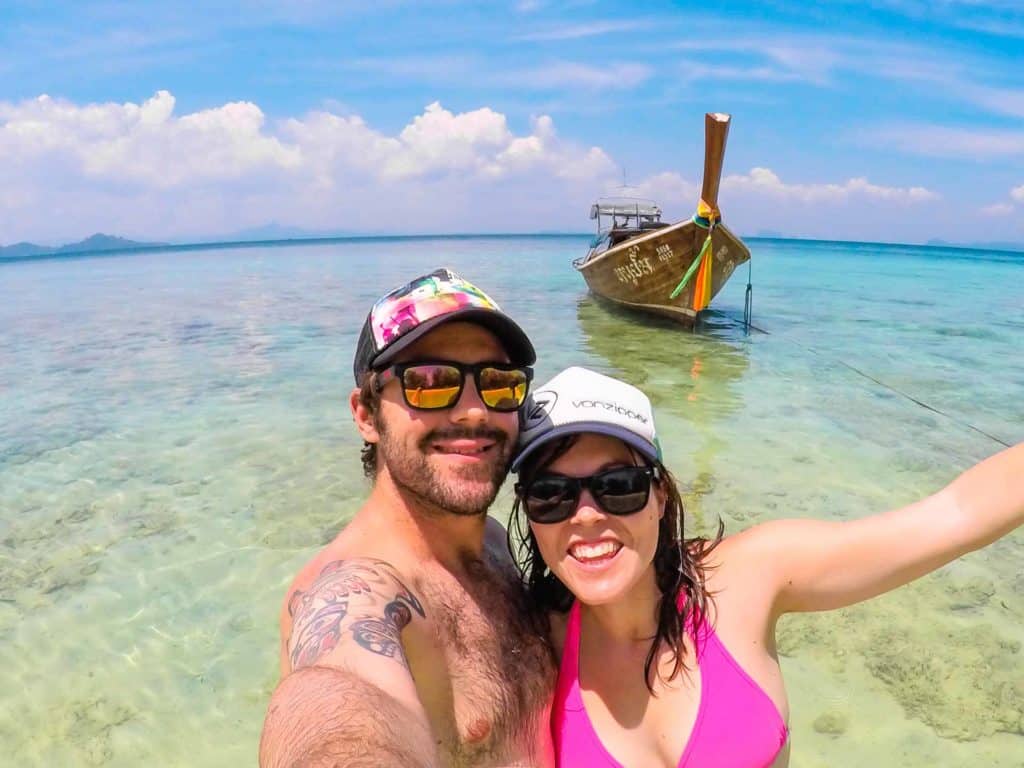
We’ve been traveling the world together since 2008, searching for the planet’s best destinations and adventures.
Love Travel?
Sign up for our free weekly newsletter for the best travel tips, ideas and deals!
We respect your privacy. Unsubscribe at any time.
READ MORE...
Getting Around Magnetic Island – ‘How to’ Transportation Guide
The Ultimate GUIDE to the Best MAGNETIC ISLAND BEACHES and Bays
14 Best Day Trips From Reykjavik, Iceland (2024 Guide)
Related Posts
Canoes and the art of zen at falcon trails resort, manitoba, 17 awesome things to do in kiama, nsw, best hiking backpacks – ultimate buyers guide [2024], the ultimate guide to the truly nomadic land trek in kyrgyzstan, 5 thoughts on “sustainable tourism in thailand – ecotourism, wildlife and culture guide”.
thank you for helping me with my school
You are welcome. So glad we could help. 🙂
Thank you so much!!!!!!!!!!!!!!!!!
I loved reading all your sustainable recommendations. I am planning to visit Thailand sometime next year, so this is super useful and informative! The elephant sanctuaries are on my list.
So glad you found the article helpful. It is so important to travel sustainably and know about the tours and the companies that you go with. Hope you have a great trip next year to Thailand. It is an amazing country. Definitely do your research on the elephant sanctuary. They can easily name themselves this but sometimes they are not a sanctuary. There is no one monitoring this in Thailand. Have a good one.
Leave a comment Cancel reply
Save my name, email, and website in this browser for the next time I comment.
- The 10 Best Ecotourism Experiences...
The Best Ecotourism Experiences in Thailand

Ecotourism is skyrocketing globally. Studies show that a significant majority of travellers want to engage more in local conservation and activities that promote sustainability, with Thailand at the forefront of the movement.
Join us on our immersive small-group adventures in either northern Thailand or southern Thailand to experience the best the country has to offer, staying at hand-picked hotel and led by a Local Insider.
The Elephant Nature Park

First opened in Chiang Mai in the 1990s, the park has consistently provided a sanctuary and rescue center for mistreated elephants nationwide. Tourist demand to engage with the treasured national animal has led to an industry that is highly exploitative , working elephants for incredibly long hours or promoting activities like elephant riding that injure the animal and shorten its lifespan. The Elephant Nature Park invites the public to learn about this endangered species and interact with them in a responsible way. The success of the Chiang Mai Park has spurred the growth of franchised centres in Phuket, Koh Samui and Cambodia.
Located on the diving paradise island of Koh Tao , this organisation conducts a full range of marine conservation activities – from the maintenance of artificial coral reefs to the care of baby turtle hatchlings – and provides opportunities for budding conservationists of all levels to participate in daily projects. From one-day immersion experiences to several-month-long internships, there are options to get involved regardless of your itinerary or how much time you have available. An advanced scuba licence is required, but they can help you achieve that, too .

The Gibbon Rehabilitation Project

Founded in Phuket as a research division of the Wild Animal Rescue Foundation of Thailand, the Gibbon Rehabilitation Project aims to rescue and rehabilitate illegally captive gibbons, prevent the species’ mistreatment and educate the public on the illegal wildlife trade. The park grounds are open to the public with volunteers offering guided tours and information about the individual animals on-site, with longer term volunteer opportunities available. The project also depends on public participation – it asks for any sightings of gibbons used for tourist photo-ops – a strictly illegal activity – to be sent to their e-mail so the group can follow up.
Trash Hero Thailand
This global NGO traces its roots back to Thailand, where a small group of friends first started to organise community members for weekly beach cleans . Today, there are more than 50 chapters across nine countries, almost half of which are right here in Thailand. These community members assemble weekly to hold trash cleanups and a range of other creative projects, uniting locals and tourists alike and often capping off with a sunset beer and food. Check the Trash Hero Thailand Facebook page for information of individual chapter active across the country.
The Soi Dog Foundation

Attitudes toward dogs in Thailand have changed gradually over the years. Low awareness of canine disease, care and availability of sterilisation treatment has led to an estimated 8.5 million “soi dogs” or street dogs roaming around the country. In the past, widespread euthanasia or sale of the dogs as meat to markets in Vietnam or China was practiced but more recently public backlash has curbed such policy . Today, the Soi Dog Foundation is one of the largest organizations that fight for the humane management of Thai street dogs, tending to their medical needs and working to find forever homes at home and abroad. Based on Phuket, the organisation is always looking for volunteers to help “socialise” the new rescues – who often arrive to the shelter very shy of human interaction – and “flight volunteers” who help check in the animal at the airport.
Bangkok Tree House, Thailand

Constructed from eco-friendly materials and powered by natural energy sources, this property has integrated zero-waste goals into every aspect of its operation within the Green lung of Bangkok – the city’s last natural frontier. Wall insulation is made out of upcycled juice cartons; reclaimed wood makes up the walkways; 100% of outdoor lights are powered by wind and solar energy; all kitchen waste is composted; amenities are all locally sourced; “air cleaning plants” are grown in guest rooms to purify the air. What’s more, the property sources all guest amenities from local, eco-friendly businesses.
Chang Thun Village
Village visits and tribal homestays have been a burgeoning tourist economy in Thailand for many years, but critics question the ethics and sustainability of such activities. Chang Thun, a settlement in Trat Province , is one outstanding area that practices what is locally called Community Based Tourism, engaging visitors in traditional practices and regional history while preserving the integrity of the local culture. All projects are owned and managed by community members, limiting the threat of exploitation, with income generated circulated back into the community to help preserve its tradition.
Akha Ama Coffee

Years ago, a member of the Akha hilltribe set up a coffee production company to provide jobs and generate more local economy in the area. Today the coffee product is affectionately named Akha Ama Coffee, paying tribute to its founding mother – or Ama in the local language – and the local community continues to practice sustainable agriculture on its ancestral lands. Its three-day Coffee Journey invites tourists into the daily lives of the coffee farmers, from bean to cup.
Ko Yo Homestay

While hilltribe village visits in the North are currently all the rage, the community on Ko Yo Island in Southern Thailand offer inclusive activities to tourists that demonstrate their incredible nature-oriented history and cultural harmony with its natural resources. The local community’s economy revolves around sustainable fishing and the farming of chempedak – a cousin to jackfruit – and organic cotton weaving. Visitors have the opportunity to help cultivate the chempedak and see how local women weave coconut leaves into “khro” to protect the fruit from insects. You can also learn of the prawn-trapping techniques passed down over generations, before retiring to your own personal “khanam,” or floating house situated over the calm waters.
Since you are here, we would like to share our vision for the future of travel - and the direction Culture Trip is moving in.
Culture Trip launched in 2011 with a simple yet passionate mission: to inspire people to go beyond their boundaries and experience what makes a place, its people and its culture special and meaningful — and this is still in our DNA today. We are proud that, for more than a decade, millions like you have trusted our award-winning recommendations by people who deeply understand what makes certain places and communities so special.
Increasingly we believe the world needs more meaningful, real-life connections between curious travellers keen to explore the world in a more responsible way. That is why we have intensively curated a collection of premium small-group trips as an invitation to meet and connect with new, like-minded people for once-in-a-lifetime experiences in three categories: Culture Trips, Rail Trips and Private Trips. Our Trips are suitable for both solo travelers, couples and friends who want to explore the world together.
Culture Trips are deeply immersive 5 to 16 days itineraries, that combine authentic local experiences, exciting activities and 4-5* accommodation to look forward to at the end of each day. Our Rail Trips are our most planet-friendly itineraries that invite you to take the scenic route, relax whilst getting under the skin of a destination. Our Private Trips are fully tailored itineraries, curated by our Travel Experts specifically for you, your friends or your family.
We know that many of you worry about the environmental impact of travel and are looking for ways of expanding horizons in ways that do minimal harm - and may even bring benefits. We are committed to go as far as possible in curating our trips with care for the planet. That is why all of our trips are flightless in destination, fully carbon offset - and we have ambitious plans to be net zero in the very near future.

See & Do
The solo traveller’s guide to northern thailand.

Guides & Tips
Top tips for travelling in thailand.

The Best Private Trips to Book for a Relaxing Retreat

The Best Private Trips to Book in Thailand

Restaurants
The best waterside restaurants in thailand.

The Best Long Trips to Take in 2024

The Best Tours for Visiting Multiple Countries in One Trip

A Guide to Sailing in Thailand

The Best Trips and Tours in Thailand

The Best Two-Week Itineraries Around the World

The Best Places to Travel in 2024

How Much Does a Trip to Thailand Cost?
Culture trip spring sale, save up to $1,100 on our unique small-group trips limited spots..

- Post ID: 1000202184
- Sponsored? No
- View Payload

Eco-Tourism in Thailand: A Guide to Sustainable Travel
- September 21, 2023
- Attractions , Mountains , Thailand

Table of Contents
Rising global environmental concerns, like climate change, have led to an increase in the popularity of eco-tourism, as many travelers now look for opportunities to explore natural areas with as little impact on the environment as possible. For reasons which you’ll soon see, Thailand as a prime tourist destination occupies a unique position in sustainable travel, and the opportunities for eco-tourism Thailand provides abound.
Are you an environmentally-conscious traveler looking to explore this Land of Smiles in southeast Asia, and experience its wonders? Then you’re in good hands! Our Eco-tourism Thailand Guide reveals the most important things you need to know about sustainable tourism within this destination.
First, a look at eco-tourism in general.
Understanding Eco-Tourism
Eco-tourism, according to The International Ecotourism Society (TIES), is “responsible travel to natural areas that conserve the environment, sustains the well-being of the local people, and involves interpretation and education.”
In other words, an eco-tourist is one who – during their travels – is committed to respecting nature, promoting sustainability by not harming the environment, and supporting local cultures.
It’s important to travel sustainably or in an eco-friendly manner because this:
- Reduces all forms of pollution
- Combats climate change
- Helps in the preservation of natural wildlife and resources
- Promotes biodiversity
On the whole, sustainable travel is focused on minimizing the negative impact of tourism, while maximizing its benefits. So, for those who’ve been thinking that “eco-tourism” is just a buzzword, it really isn’t.
Why Thailand is an Eco-Tourism Hub

Like we mentioned at the start of this Eco-tourism Thailand Guide, there are several reasons why many travelers prefer the country as a responsible tourism destination.
One is the fact that it’s a natural fit for eco-tourism, with its rich cultural tapestry as well as diverse ecosystems including dense jungles and serene beaches. Thailand boasts many green and natural spaces, including homestay villages offering many exciting eco-friendly activities, and animal sanctuaries where one can support endangered wildlife.
As part of its Seven Greens of Tourism campaigns, the Government of Thailand supports and leads the push for responsible tourism; it’s also making long-term strategic policies to maintain the country’s ecosystem, while identifying new eco-destinations, promoting, and developing basic infrastructure for them.
Eco-Tourism in Thailand : The Top Destinations
The eco-tourism Thailand offers has always been attractive to responsible travelers; here are a few top destinations we recommend you check out as an eco-tourist interested in exploring the country.
1. Chiang Mai

Famous for its historical temples, cool weather and scenic landscape, this city amidst the mountains of northern Thailand is the ideal place for several eco-friendly activities, including trekking or hiking on nature trails, visiting hill tribe villages, and exploring nature parks like the Doi Inthanon National Park.
2. Phang Nga Bay

A well-sheltered bay between southern Thailand’s mainland and Phuket Island, great for sea kayak expeditions, with fascinating caverns, limestone karsts, emerald waters, and a National Park which is an absolute geological wonder. Conservation efforts here prioritize marine life preservation and responsible tourism promotion.
3. Khao Sok National Park

This nature reserve in southern Thailand hosts one of the world’s oldest rainforests – a dense virgin jungle prime for jungle treks, wildlife spotting, and sustainable camping experiences. The unique ecosystem includes towering limestone karst formations; a man-made lake; plus rare species like gibbons, tigers, and the giant, parasitic Rafflesia flower.

Pai, a quaint town within the mountains of the Mae Hong Soon Province of northern Thailand, offers hot springs, waterfalls and gorges. Pai is also a hub for organic farming, where you can participate in farm stays to savor farm-to-table meals and learn about permaculture.
5. Koh Yao Islands

The Koh Yao Islands (Koh Yao Noi and Koh Yao Yai) are just a short boat ride from Phuket. Community-based tourism is the focus on these islands which offer much to experience and learn about traditional fishing techniques and mangrove conservation.
Eco-Friendly Activities to Try
Now let’s talk about the sustainable activities to try in Thailand, as the country offers a plethora of them.
Wildlife Watching

There are several places where you can feast your eyes on Thai wildlife. Chief among them is the Kui Buri National Park boasting a variety of wildlife, like monkeys, elephants, water buffaloes, sambar deer, etc. Other interesting wildlife hotspots include the Mu Ko Chang National Park and the Pranburi Forest Park.
Trekking & Hiding

With the country full of jungles, you’ll have your fill of sustainable trekking or hiking. Popular hiking spots include Kew Mae Pan Nature Trail, Khao Yai National Park, and Krabi’s Tiger Cave Temple. The trails in Khao Sok also promise an unforgettable trekking experience.
Organic Farm Visits
Thailand offers some of the best organic agro-tourism farm stays and rural retreats. Visit one and enjoy the fresh mountain air, lush jungles, and organic home-style dishes, while learning about local farming practices, arts and crafts, natural construction, yoga, and even helping with the harvest.
Traditional Craft Workshops
Another eco-friendly, exciting activity to try is to learn a traditional craft from local artisans. You can learn to make many things, like jewelry, traditional Thai garlands, and silk; lessons can also include Moken weaving, leather designing, and traditional Lai Rod Nam.
Traveling Responsibly: Tips for the Conscious Tourist

We can’t wrap up this Eco-tourism Thailand Guide without including a few tips for the road. Here are ways to make your eco-travels as sustainable as possible.
- Choose eco-friendly accommodation : Eco-friendly lodges use renewable energy and adequate waste management systems; they also make local employment a priority. Choose such accommodations as they’re a vital aspect of sustainable travel.
- Respect local cultures and traditions : Be sure to respect the customs of any locality you find yourself in. Eco-tourism is as much about respect as it’s about fun and adventure.
- Minimize your environmental footprint : Try to keep the amount of waste you generate to a minimum, and dispose of same properly.
- Support local economies : You can do this by purchasing as much locally made products as you can.
- Choose activities that prioritize sustainability : Such activities as we mentioned earlier are great examples.
The Future of Eco-tourism in Thailand
The eco-tourism Thailand is popular for offers excellent opportunities to experience wholesome living, and these opportunities will only get better with time, more government initiatives, and increased community involvement; so expect a brighter, greener future for Thai tourism.
We hope our Eco-tourism Thailand Guide will make your sustainable journeys within and even outside the country smoother.

© 2023 by Bangkok Airways. All rights reserved.
Privacy Policy
- Luang Prabang
- Mae Hong Son
- In the News
- Route Network
- Book a Flight
- Flight Schedule
-cutout.png)
SMU Economics Intelligence Club
- Jun 21, 2023
- 11 min read
Thriving with Nature: Exploring Ecotourism in Thailand
Written by Li Laiyi and Woon Shijie , with inputs from Ng Yu Kang

Executive Summary
The reopening of Thailand’s international borders in the post-pandemic era has heralded a new direction of tourism, one that is aligned with safe and sustainable travel. Overall, Thailand’s tourism industry has bounced back through the adoption of ecotourism. First, we seek to explore Thailand’s commitment to sustaining ecotourism under its Bio-Circular-Green (BCG) model, along with its significant schemes. Given that Thailand’s tourism sector is a significant contributor to its Gross Domestic Product (GDP), we would then examine the positive economic impact brought about by Thailand’s move into ecotourism as well as its accompanying limitations.
Thailand is in a good position to take advantage of the move, given the intersections between a high reliance on tourism, as well as 21st century trends. Already, we are seeing success in job creation and growth. However, it is equally crucial for the Thai government to sustain its progress by acknowledging and addressing limitations that threaten its long-term prospects, such as those of overcrowding, ecotourism’s high vulnerability to disasters, and greenwashing. Moving forward, we have suggested standards and frameworks for Thailand to secure the profits of a sustainable eco-tourism sector in the long run.
Introduction to Ecotourism in Thailand
Ecotourism: What is it all about?
Ecotourism is a “form of tourism that attempts to take responsibility for its current and future economic, social, and environmental impacts, by looking at the needs of visitors, the industry, the environment, and host communities”. Around the globe, ecotourism is rising in demand and popularity, with over 80% of global travellers believing that ecotourism is important to counter the adverse impacts of tourism. With the growing availability of eco-friendly tourist accommodations and activities, given its environmental sustainability and enhanced travel experiences, the global ecotourism market is expected to reach an astounding USD526.16bn by 2027 with a compound annual growth rate (CAGR) of 14.24%.
Ecotourism in Thailand and the Bio-Circular-Green (BCG) model
Tourism is especially significant in Thailand, being one of the world’s leading travel destinations known for its rich historical sites, unique culture, and delectable local cuisines and landscapes. Accounting for a fifth of its Gross Domestic Product (GDP) and about 20% of national employment , as well as knock-on impacts on informal sectors, Thailand’s tourism industry is a major contributor to the country’s employment and economic wealth. Prior to the COVID-19 pandemic, Thailand received 39.8 million international visitors in 2019 alone and collected USD60.5bn in international tourism receipts. Tourist revenues were more than the likes of the United Kingdom, Germany, and Japan. As seen in Figure 1, Thailand’s tourism industry only seems to be growing exponentially from 2017 to 2019 with the total value of tourism’s contribution to Thailand’s GDP amounting to THB3028.78b in 2019, up until the 2020 pandemic-fuelled economic downturn, when Thailand’s GDP fell by about -6.1% y/y in 2020.

Post-Pandemic Tourism Revival: Going Green
The Thai government in 2021 announced plans to revive its tourism industry creatively in line with the Bio-Circular-Green (BCG) model , signalling Thailand’s commitment to furthering ecotourism in its national agenda following the COVID-19 pandemic. Spanning from 2021 to 2026, the BCG model seeks to aid in Thailand’s recovery post-pandemic while targeting global environmental concerns . Taking inspiration from the United Nations Sustainable Development Goals (SDGs), the BCG model capitalises on Thailand’s strengths in biological diversity and cultural richness to employ technology and innovation in promoting secondary cities and rural communities as tourism spots. They also target niche market segments such as wellness tourism and cultural tourism, in their bid to stimulate sustainable economic growth.
Being supported by both the abundance of natural resources and man-made infrastructure as important enablers, the Thai government has pushed for local tourism businesses to adopt the BCG model. In turn, businesses have generally responded positively .
Notable Schemes in Thailand
The UNESCO Sustainable Travel Pledge
In line with its existing ‘No Foam No Plastic’ initiative, Thailand has been the first country to implement the UNESCO Sustainable Travel Pledge nationwide , with more than 500 hotels signing the pledge to eliminate single-use plastic and promote local culture. The changing nature of business needs also leads to a shift along the supply chain needed to sustain regular operations. This has resulted in a diverse range of support coming from local businesses, and profits as well. The growth of eco-tourism is important not just for greater tourism revenues, but also to support the growth of local businesses and productive labour.
Greater local conservation through activities in Nature
Thailand, being home to a myriad of natural attractions, provides ample opportunities for visitors to engage more in local conservation and activities that promote sustainability. This includes activities such as interactions with the mistreated national animals.
At the elephants of Thailand’s Elephant Nature Park, for example, visitors can learn more about the endangered species. Meanwhile, the new heaven reef conservation program ensures visitors can experience first-hand the range of marine conservation activities, including the maintenance of coral reefs to caring for baby turtle hatchling s.
Community-based tourism
More importantly, the BCG model has made a major impact through its greater promotion of community-based tourism, a type of excursion created for tourists to experience local communities. Community-based tourism is often concentrated in rural areas, extending the benefits of tourism to areas that historically had lower footfall and income streams as well.
Collaborative initiatives under the BCG model such as the joint effort between the Tourism Authority of Thailand (TAT) and the Thai Organic Consumers Association (TOCA) seek to promote organic tourism. In Phuket, for example, tourists are able to learn more about organic farming first-hand and collect their own produce to cook - straight from farm to pot. Local restaurants and hotels in Thailand are also sourcing directly from organic farmers. These initiatives are in conjunction with TOCA’s current platform which allows businesses to order local produce and consumers to search for organic farms for farm tours and restaurants that source their ingredients from local farmers.
In the process, ‘Earth Points’ can be earned through greater eco-friendly contributions from both businesses and consumers in the formation and sustenance of an organic society while increasing tourism revenue. These ‘Earth Points’ can be fully redeemed for rewards and promotions on the TOCA platform, further incentivising sustainable practices through the TOCA platform.
This creates a gamified ecosystem that creates a greater appreciation for the environment and strengthens tourism sustainability. Overall, greater exposure of local communities to tourist and business traffic helps create more revenue streams for local farmers, and their communities.
Positive Economic Impact
Rise in GDP and job opportunities for Thais
Following Thailand’s committed move to ecotourism within its tourism sector, TAT hosted an “Amazing Thailand Countdown 2023” on Dec 22 to celebrate its tourism achievements going into the new year. Mr Yuthasak Supasorn, the TAT Governor, commented that Thailand’s tourism sector has generated THB1.5tr in total tourism revenue, half of the pre-pandemic level seen in 2019.
Despite not being at pre-pandemic levels, Thailand’s revitalised tourism sector has boosted its GDP to reach a +4.5% y/y expansion in 3Q22, going against the odds of rising inflation and the global economic slowdown .
The Thai economy is now “growing at an accelerating rate” according to Thailand’s National Economic and Social Development Council (NESDC) which is predicting further growth of +3% to +4% in 2023 . With the revival of tourist arrivals in Thailand in accordance with its BCG model, tourism in Thailand is expected to be among the main sectors to contribute to overall GDP growth once again. This is as it continues to strengthen in supporting jobs and incomes in related sectors as well.
Improved quality of life and income for local farmers
More specifically, given the greater prevalence of community-based tourism, greater income and work opportunities are automatically granted to local communities. The additional effects should not be understated. Tourism infrastructure is often a chicken-and-egg problem, with insufficient tourist amenities in rural areas often being a problem in raising revenues. However, through branding and natural tourism pipelines, Thailand is able to increase the amount of exposure and tourism less affluent communities receive without them supplying much capital in the first place. From these tourist activities, naturally, more hotels and restaurants can be set up, and survive. These benefits are further entrenched into local communities, for example when local farmers sell their produce to these establishments.
Eco-Tourism: Limitations and Challenges
Tourism is considered to be one of the most essential drivers of Thailand’s economic progress and in alleviating unemployment. Overall, Thailand is fortunate enough to have multiple geographical and comparative advantages in terms of lifestyle, culture, and food agronomy to make the sustainable tourism market a sizable one. However, eco-tourism comes with its own sets of limitations which must be addressed or at least mitigated by the public sector for continuity.
Overcrowding
Overcrowding is one of the major concerns for Eco-tourism , as it can lead to undesired impacts on the wildlife, habitats, eco-system and even the indigenous community living in the area. Greater exposure to untouched areas leaves an environmental footprint the area might not be sufficiently well-equipped to handle.
One prominent example would be the closure of Maya Bay on Koh Phi Phi in southern Thailand. It was a popular tourist destination for many years, known for its crystal-clear blue water, and towering limestone monoliths that have been worn by millions of years of seawater ebbing. Having this magnificent scene destroyed by tourists is considered by many to be heartbreaking. The effects are detrimental: in June 2000, 70-80% of the bay’s reef was intact. In 2018, less than 8% remained. Thai authorities had to resort to a closure of the bay in June 2018 for conservation efforts despite the large revenue it was generating for the country.
Fortunately, COVID-19 has allowed Thailand’s ecosystem to reset and recover in a more sustainable way. While COVID-19 has negative effects on Thailand’s tourism industry in terms of the economy, it provides plenty of opportunities for sustainability efforts in 2022, such as natural resource restoration. With the abundance of eco-tourism hotspots, the right question to ponder is not how natural resources can be recovered. But instead, how the recovered natural resources may be sustained in the long run.
The solution to sustained usage of natural resources to meet the demands of eco-tourists is through public sector strategy and action. Overcrowding is not the sole result of eco-tourism. Overcrowding is the result of unplanned and poor regulations, that prioritise maximising revenue over conservation. If organisations carry out their operations at the expense of the communities and indigenous people's way of living, Thailand can expect many recurrences of Maya Bay’s tragedy. Repeated offences might mean that rescue efforts may no longer suffice.
High Vulnerability to Natural and Human-Induced Hazards
Thailand is highly vulnerable to natural and human-induced hazards such as tsunamis, storms, droughts, landslides, forest fires and epidemics. The most recent trending disaster in Thailand is flooding. Despite the nature of the hazard, the number of casualties remains relatively high in the millions in regions since the 1990s. The areas being hit the hardest by the hazards are normally eco-tourist hot spots such as the Phuket Tsunami disaster in 2004.
While eco-tourism as a driver of growth is good news for the Thai economy, eco-tourism is highly prone to the effects of natural disasters. One event can lead to a loss of revenue lasting weeks or even months before tourists deem it safe to return. Thailand would also incur high costs to fund relief and restructuring efforts. Hence, it is crucial for the Thai government to consistently upgrade the country’s capital to dampen the effects of natural disasters on Thailand’s economic growth. Having strong industrial policy upgrades would also allow room for career mobility such that the employment rate does not take a sudden dip.
Some policy suggestions by the Asian Development Bank for Thailand include strengthening research and development to support technology absorption. While a reliance on tourism is not inherently wrong, the natural inherent risk means that aggressively diversifying through adopting high-growth sectors is important. With the increasing prevalence of natural disasters due to climate change, diversification becomes especially more pressing.
The Thai government can consider strategically positioning itself to promote the country as a high-tech centre and research base for global firms. This would entice more foreign direct investments which in turn generate more jobs and boost the Thai economy. However, climbing up the technological ladder also requires a simultaneous improvement in workers’ skill levels. It is crucial to increase availability and access to highly specialised vocational education and training and ensure that content is systematically aligned with industry needs. Nonetheless, over the past few decades, Thailand has established a robust manufacturing sector. The focus is on attracting investments for mid/high-tech manufacturing. One area that Thailand could exploit would be Electric Vehicles (EV) and other sustainable products, which align with the eco-tourism sector’s objective to better protect the environment. Already, there are plans to increase EV production to 30% of all cars by 2030. Thailand is also the world’s fifth-largest rare earth metals producer. As renewables become more widely produced due to the world’s quest for net-zero, and the West looking to diversify its renewable production sources outside of the Middle Kingdom, Thailand has a potential opportunity to increase its exports or move up the renewable supply chain with the abundance of these metals.
Greenwashing
Greenwashing is another prominent issue. Greenwashing is a practice in which businesses make false or misleading claims about their environmental practices to appeal to consumers. Unfortunately, greenwashing is a common practice in the tourism industry, including in Thailand's eco-tourism sector.
Naturally, the booming sector allows eco-tourism operators to reap high revenue and accelerate expansion. Hence, firms are more likely to jump onto the trend hoping to get a fair share of the eco-tourism business. Rushing into the sector with profits as the main objective, while neglecting the essence of sustainability, would inevitably cause greenwashing.
Fortunately, the Thai government launched a few initiatives to tackle the issue of greenwashing. One of the notable ones is the ‘GSTC-Recognized Standard’ status launched by the Global Sustainable Tourism Council. Attaining the GSTC-Recognized status signifies that a sustainable tourism standard has been reviewed by GSTC technical experts and the GSTC Accreditation Panel and deemed equivalent to the GSTC Criteria for sustainable tourism. This prevents firms from fabricating results as the certificate can only be achieved after an in-depth and comprehensive check by the experts. The GSTC programs serve to recognise genuine practitioners of sustainable tourism, which in turn builds confidence and credibility with consumers.
However, GSTC has its limitations. The GSTC uses a compliance-based approach, meaning that businesses are expected to meet specific requirements in order to be certified. While this approach can be useful in ensuring that businesses meet minimum standards, it may not necessarily encourage innovation or continuous improvement beyond the requirements of the standard. One possible outcome could be that thriving firms may not see the need to transition to cleaner energy or better environmental practices so long they can continue generating profits.
Moving Forward
To sum it up, a healthy and sustainable eco-tourism practice should aim to have the following:
Ensure sustainability by limiting the number of tourists in an area. This prevents overcrowding which can lead to detrimental damage to the environment as mentioned above. It did lead to the closure of popular tourist hot spots, taking a toll on Thailand’s eco-tourism revenue.
Maximise local economic benefits by including residents in projects, encouraging local investments and regulating foreign ones. Not only would an inclusive eco-tourism sector generate more jobs for the locals, but the Thai government could also better control the extent of exploitation of natural reserves when the operators are local as compared to when it is foreign companies. This includes fair distribution of the eco-tourism revenue to locals whose spaces were used in the process.
Regular collaboration between government officials and conservation groups. It is crucial to tap into the environmental knowledge and advice of non-governmental groups in the space. In doing so, it allows for the better and timely protection of the natural reserves. It adds resources and capital to groups already doing good work while reducing the need for more costly government intervention. Enhancing these synergies could strike a sustainable balance between economic growth and environmental protection.
While Thailand’s eco-tourism sector has its merits such as the abundance of guided environment tours, sustainable resorts and nature conservation, the country still has some ways to go. The introduction of Thailand’s Bio-Circular-Green Economy Model (BCG), which aims to use natural assets more efficiently with the least impact on the environment, is a good stepping stone moving forward for the eco-tourism sector. However, it is essential that the Thai government continues to ramp up efforts in protecting the country’s natural resources given the surge in tourists following China’s reopening. Moving forward, Thailand's sustainable tourism market size is estimated to grow tremendously at a 17.8% CAGR from 2022 to 2032, which represents nearly 3-4% of the share in the global tourism industry. Such a bright outlook for the eco-tourism market is not an opportunity to miss out on. With proper regulation and new initiatives, Thailand can anticipate many fruitful years ahead.
Li Laiyi is a Research Analyst covering Southeast Asia the SMU Economics Intelligence Club (SEIC) and a third-year social sciences undergraduate majoring in Politics, Law, and Economics.
Woon Shijie is a Research Analyst covering Southeast Asia at SEIC, and a second-year economics undergraduate.
Ng Yu Kang is the Director of the Southeast Asia desk at SEIC.
The views expressed are the authors’ own and do not represent the official position of the SMU Economics Intelligence Club. This article may not be reproduced without prior permission from SEIC and due credit to the author(s) and SEIC.
Recent Posts
Dollarisation in Argentina: A Mistargeted Silver Bullet
The 'Right' to Govern.
The Philippines Maharlika Investment Fund: Boon or Bane

Ecotourism in Thailand -How to Have a Sustainable Travel Experience-
If you are planning a vacation in Thailand in the near future, there are many options for a more sustainable travel experience here. While Thailand has been popular with young backpackers for decades, it’s now becoming a great South-East Asian sustainable travel destination. Ecotourism in Thailand offers you the chance to experience the natural beauty of the land without disturbing the country you are visiting. Ecotourism aims to leave a destination just as you found it when you first arrived there.
About Ecotourism in Thailand

Sustainable travel has become increasingly popular in Thailand in recent years, thanks to its stunning natural destinations. Certain areas of Thailand, such as Koh Phangan, Bangkok, and Phuket, have been crowded with tourists for decades. The Thai government has even taken measures to reduce overcrowding in the country, closing the popular Maya Bay, which was featured in the movie The Beach, in 2018 to give the area a chance to recover.
Many travelers are looking for a more authentic and sustainable travel experience for their next vacation in Thailand, and want to spend time away from the crowds exploring the country’s UNESCO World Heritage sites and protected parks. Communities in areas such as Chiang Mai welcome tourists into their homes to experience their lifestyle and learn more about the local culture. Learning about the Hill Tribe culture is something more visitors are looking to do during their vacation in Thailand, and it helps to give back to the local community.
Thailand Ecotourism Initiatives

One area of concern surrounding tourism in Thailand is its elephant population. The Elephant Nature Park opened in the 1990s and offers a sanctuary for mistreated elephants. This sanctuary works to educate the population, and through their visitor and volunteer programs, it helps to look after these animals.
New Heaven Reef Conservation is a wonderful organization that is located on Koh Tao, a popular destination with divers. They work on a wide range of marine conservation activities and offer one-day experiences up to a full month program for visitors looking to enjoy a sustainable travel experience.
Trash Hero Thailand is a global NGO that originated in Thailand. During your vacation in Thailand, consider joining the local community in their activities with Trash Hero Thailand, which aim to unite locals and tourists to look after the land.
Unique Ecotours in Thailand
When planning your next vacation in Thailand, consider one of these unique, sustainable travel experiences. Chang Thun Village is located in Trat Province, which is about four and a half hours from Bangkok, and offers Community Based Tourism, which is where visitors engage in the traditional practices of the region. This works to preserve the local community, and the program is managed by the community itself.
If you are heading to Chiang Rai, which is just three hours away from Chiang Mai, the Phu Rua Highland Agricultural Research Station is an agrotourism center where you can experience local farm life and tour their facilities. You’ll learn more about the Hill Tribe plantations while giving back and assisting the local community during your time on the farm. During an agrotourism tour, you can also learn traditional Thai cooking skills and finish off your night staying in a mud house. All of these sustainable travel initiatives work with the local community, and the fees you pay all return back to the people you are staying with. When planning your future vacation in Thailand, head off the beaten path and consider searching for a more sustainable travel experience. These organizations listed above all work with local communities to preserve the land and leave it in as good condition as you found it. Would you like to know more about eco-friendly travel? To receive inspiration direct to your email inbox, please click here and subscribe to the Ecotourism World newsletter!

You May Also Like

Eco- Friendly and Affordable Accommodations for Backpackers in Asia

5 Reasons to Take a Trip to Nepal

Sustainable Tourism and Community Development in Jeju Island, South Korea

12 Best Eco Resorts In Thailand: Complete Guide
Jackson Groves
Posted on Last updated: June 25, 2023
Categories HOTELS , THAILAND
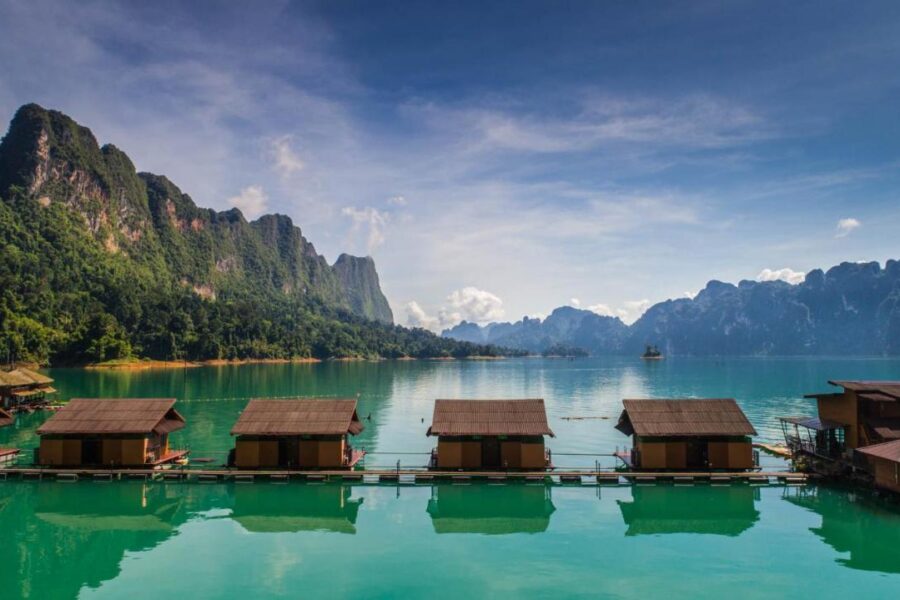
Thailand is known for its stunning beaches, lush jungles, and vibrant culture. It’s also a popular destination for eco-conscious travelers looking to experience sustainable tourism. In recent years, Thailand has seen a surge in eco-friendly resorts that offer a more responsible and sustainable approach to tourism. These eco-resorts not only provide a unique and authentic experience but also help preserve the natural beauty and cultural heritage of the country. In this article, we’ll explore 12 of the best eco-resorts in Thailand that are committed to environmental conservation, responsible tourism, and community development.
My personal favorites are the Panvaree Resort for its jungle experience and the River Kwai Jungle Rafts for its unique accommodation and peaceful atmosphere.
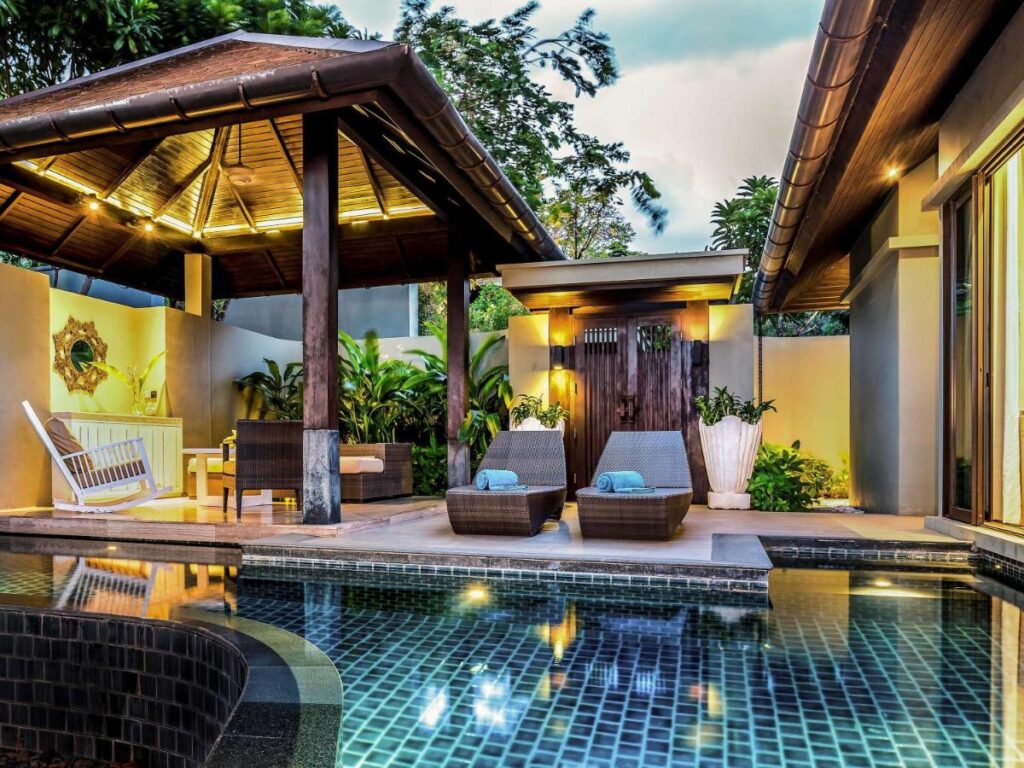
Table of Contents
QUICK PICKS: 3 BEST ECO RESORTS IN THAILAND
Don’t have time to read the whole article? No Problem! To sum up, here are the three best eco resorts in Thailand.
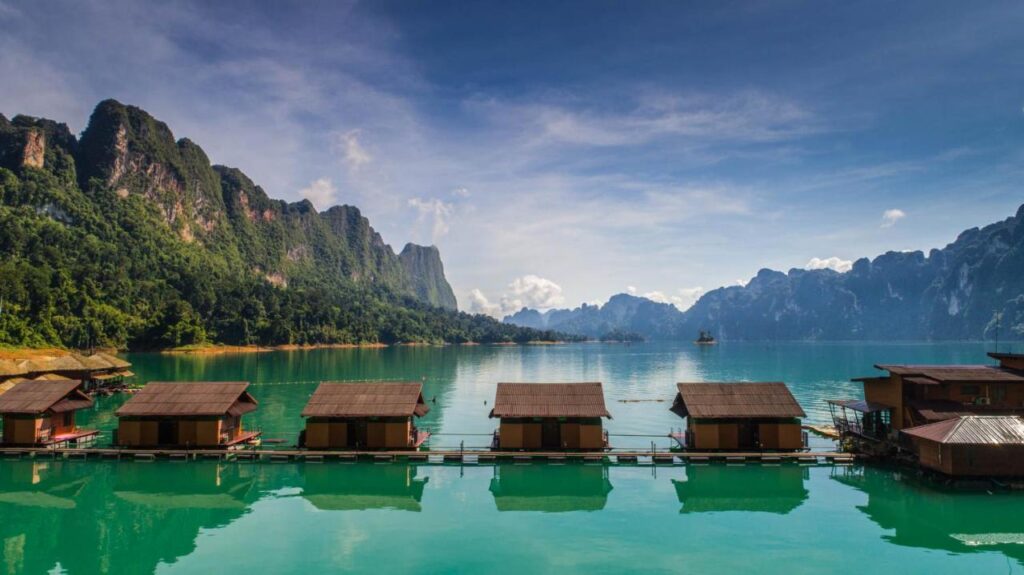
Panvaree Resort
- Jungle experience
- Bar and restaurant
- Water Activities
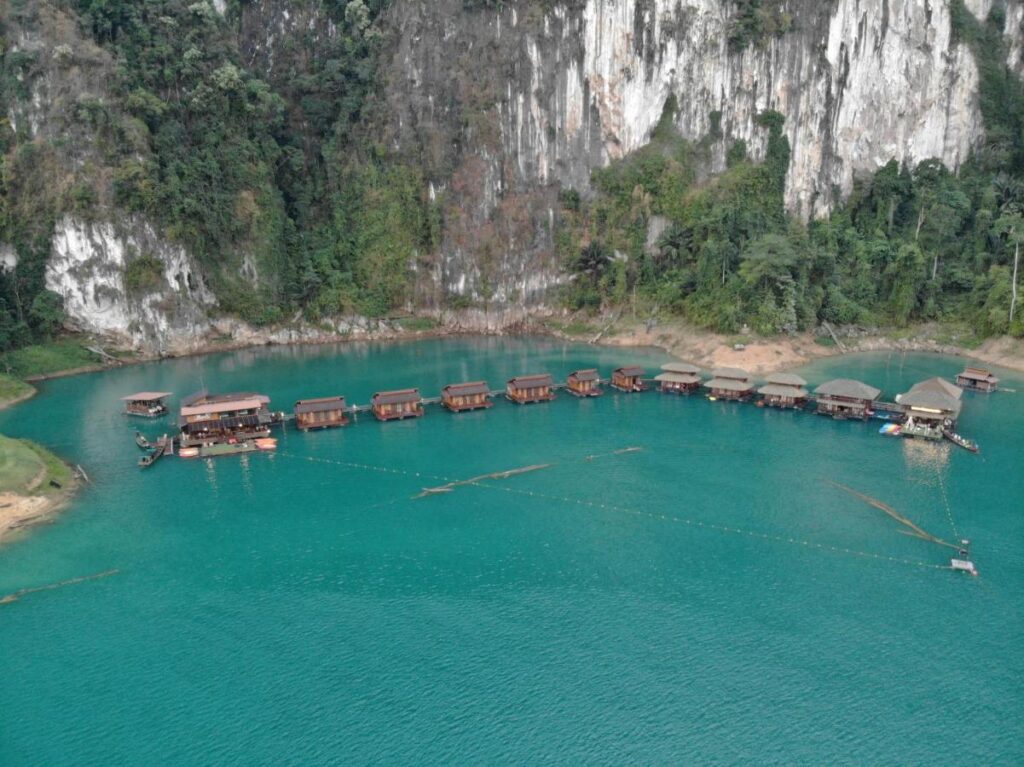
Eden Beach Khaolak Resort and Spa
- Tropical gardens
- Private beachfront
- Private pools
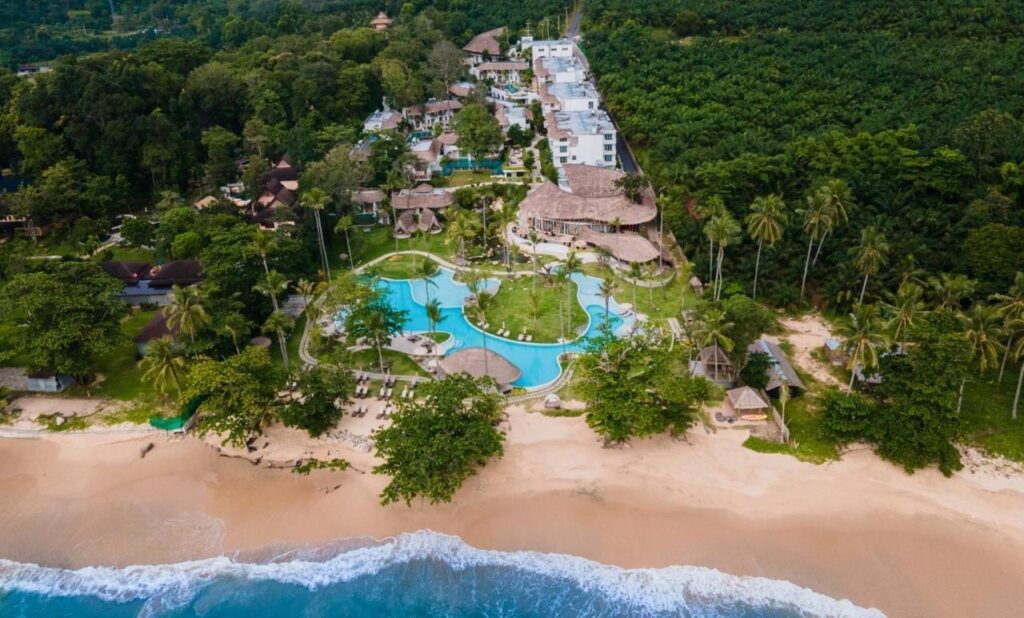
River Kwai Jungle Rafts
- Unique accommodation
- Peaceful atmosphere
- Guided treks
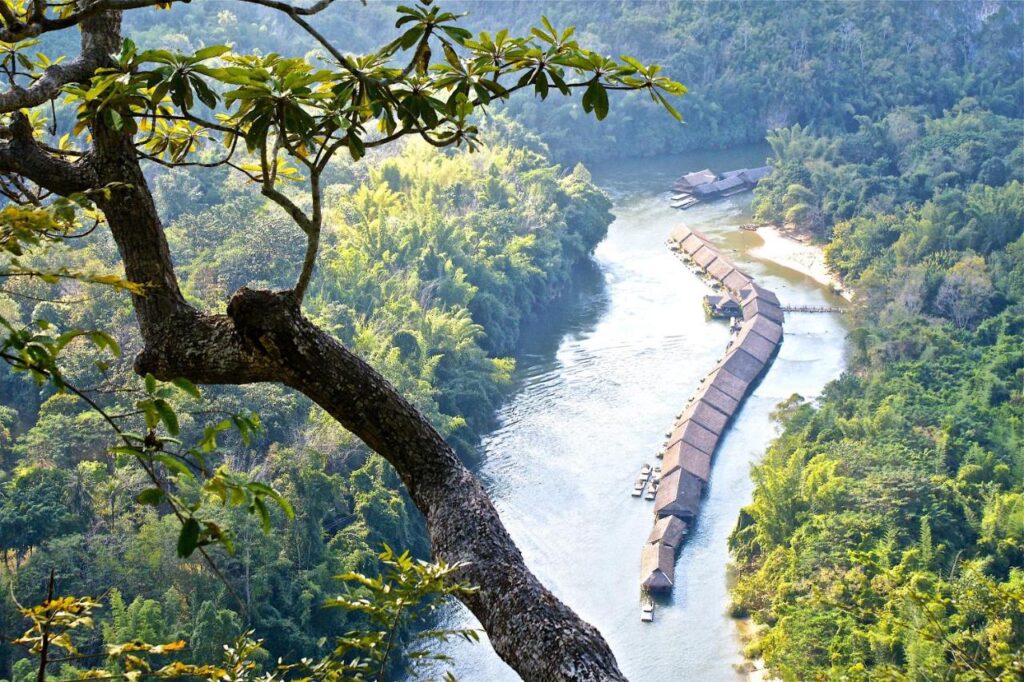
ACCOMMODATION COMPARISON TABLE
I’ve listed the 12 best eco resorts in Thailand below, including a table with current prices. Following that, is a section with a detailed review of each property.
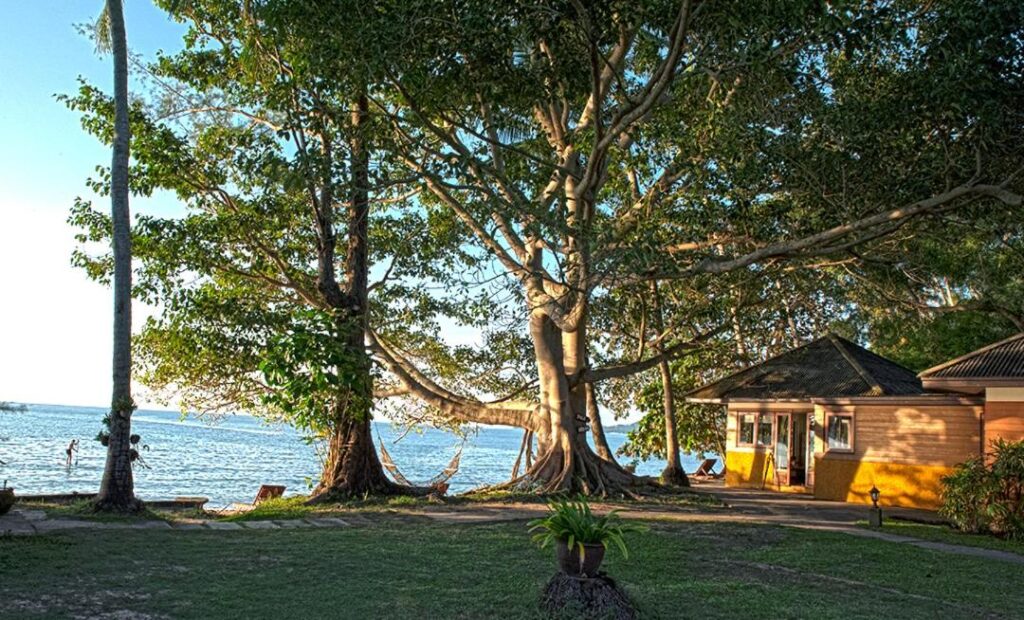
12 AMAZING ECO RESORTS IN THAILAND
Thailand is known for its beautiful beaches and lush tropical jungles, and there are a variety of eco-resorts throughout the country that allows visitors to experience the natural beauty of Thailand while minimizing their impact on the environment.
Paradise Koh Yao
Paradise Koh Yao is a stunning eco-resort located on the remote island of Koh Yao Noi in Phang Nga Bay. The resort offers a unique blend of luxury, relaxation, and sustainability, making it a top choice for eco-conscious travelers. The resort features 72 spacious and beautifully designed villas, each with its own private balcony and stunning views of the sea and surrounding landscape. The villas are made from sustainable materials and are designed to blend in with the natural environment. Guests can enjoy a range of activities, including yoga, kayaking, snorkeling, and cycling. The resort is also home to an organic farm and a unique treehouse spa that offers a range of traditional Thai massages and holistic treatments.
Click Here to view the current rates and availability of Paradise Koh Yao
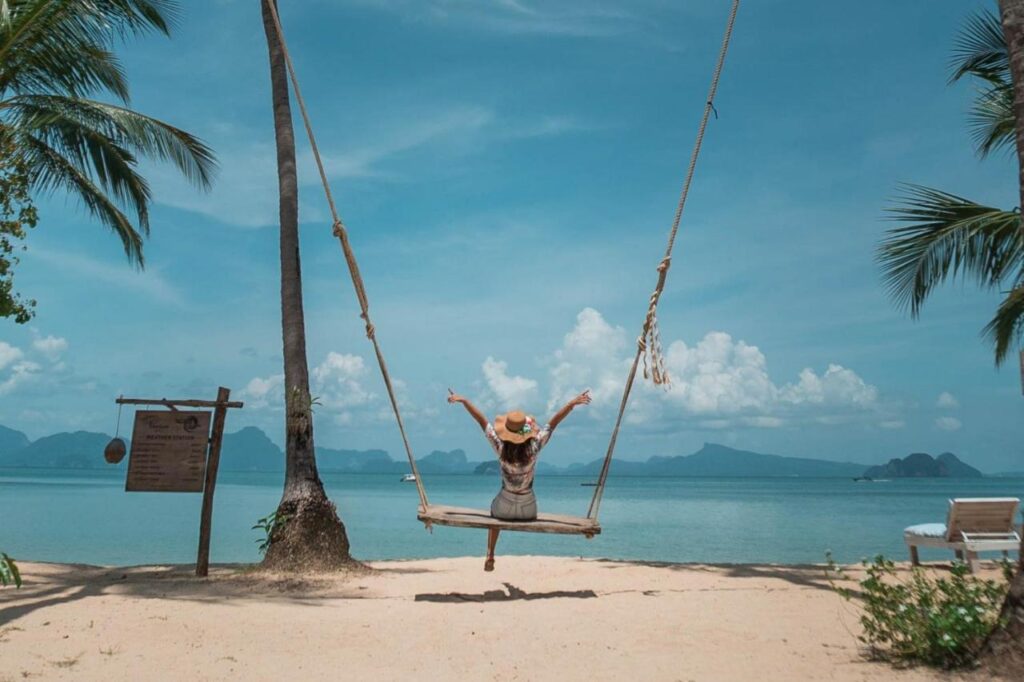
- Private balcony
- Treehouse spa
- Water activities

KC Grande Resort & Spa
KC Grande Resort & Spa is a luxurious 4-star resort located in the heart of Koh Chang, Thailand. The resort features 141 spacious and well-appointed rooms, all designed to provide guests with the utmost comfort and convenience. The rooms are equipped with modern amenities, including air conditioning, flat-screen TVs, minibars, and free Wi-Fi. Guests can choose from a variety of room types, including Deluxe Garden View, Deluxe Sea View, and Poolside Villa, all offering stunning views of the surrounding landscape. The resort also boasts a beautiful infinity pool, a fitness center, and a spa where guests can indulge in a range of treatments and massages. There are also several dining options on-site, including a beachfront restaurant, a poolside bar, and a coffee shop.
The resort is situated on a pristine white-sand beach, with crystal-clear waters perfect for swimming, snorkeling, and kayaking. Koh Chang is also known for its lush rainforest and stunning waterfalls, making it a great destination for nature lovers. Whether guests want to spend their days lounging by the pool, exploring the island’s natural beauty, or indulging in spa treatments, KC Grande Resort & Spa is the perfect choice for a luxurious and relaxing getaway.
Click Here to view the current rates and availability of KC Grande Resort & Spa
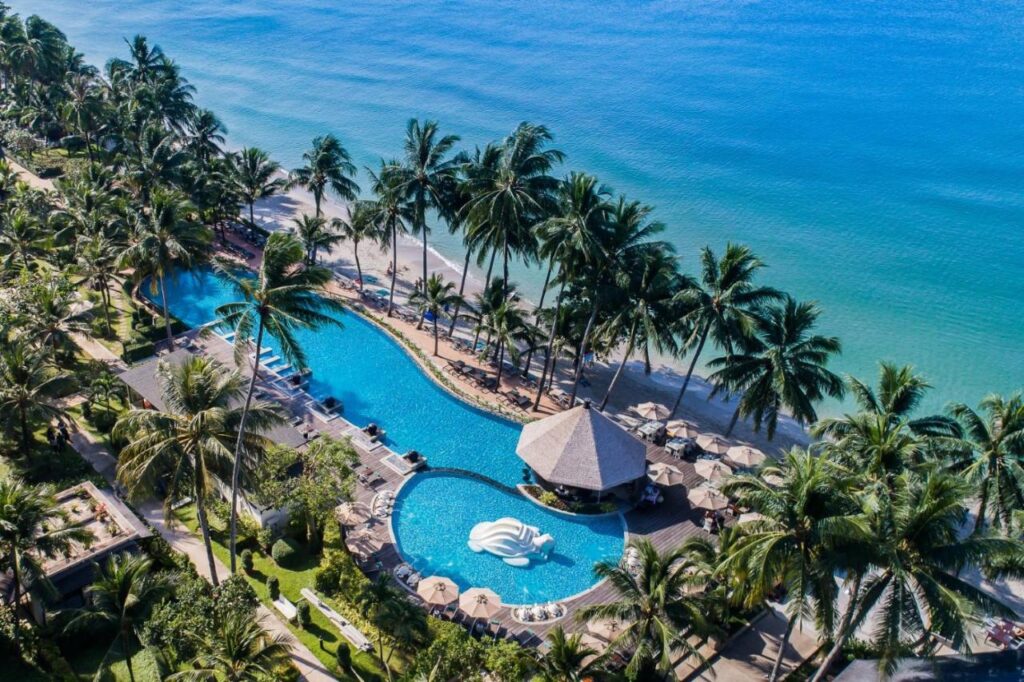
- Infinity pool
- Fitness center
- Poolside bar

The Shore At Katathani
The Shore At Katathani is a luxurious and exclusive resort nestled on the southern tip of Phuket Island in Thailand. The resort boasts an idyllic location, surrounded by lush tropical foliage and overlooking the sparkling Andaman Sea. The property offers a range of accommodation options, including elegant villas, suites and rooms, each with its unique charm and character. Guests can relax and unwind in their spacious and beautifully appointed rooms, complete with modern amenities and stunning views of the sea or the surrounding landscape.
The resort’s facilities are also impressive, with a state-of-the-art fitness center, spa, and infinity pool that offer guests the perfect opportunity to relax and rejuvenate. For those who want to stay active, the resort offers a variety of water sports, including snorkeling, kayaking, and paddleboarding, as well as tennis courts, a jogging track, and a golf course. Dining at the Shore At Katathani is an experience in itself, with a range of restaurants and bars serving exquisite Thai and international cuisine. The resort’s commitment to providing guests with an exceptional experience is evident in every aspect of its operations, from the warm and attentive staff to the exquisite design and attention to detail throughout the property.
Click Here to view the current rates and availability of The Shore At Katathani
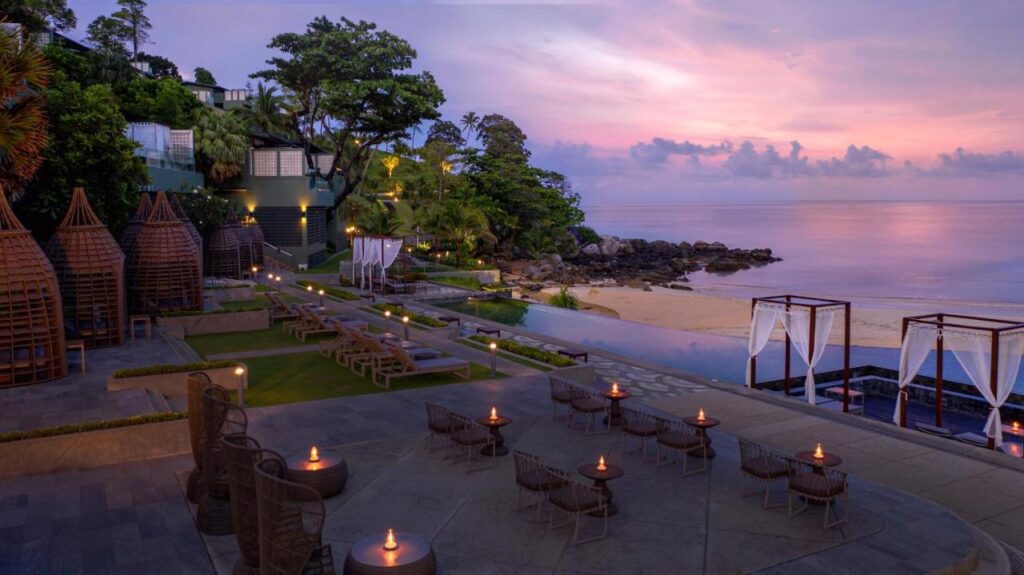
- Tennis court
- Jogging track
- Golf course
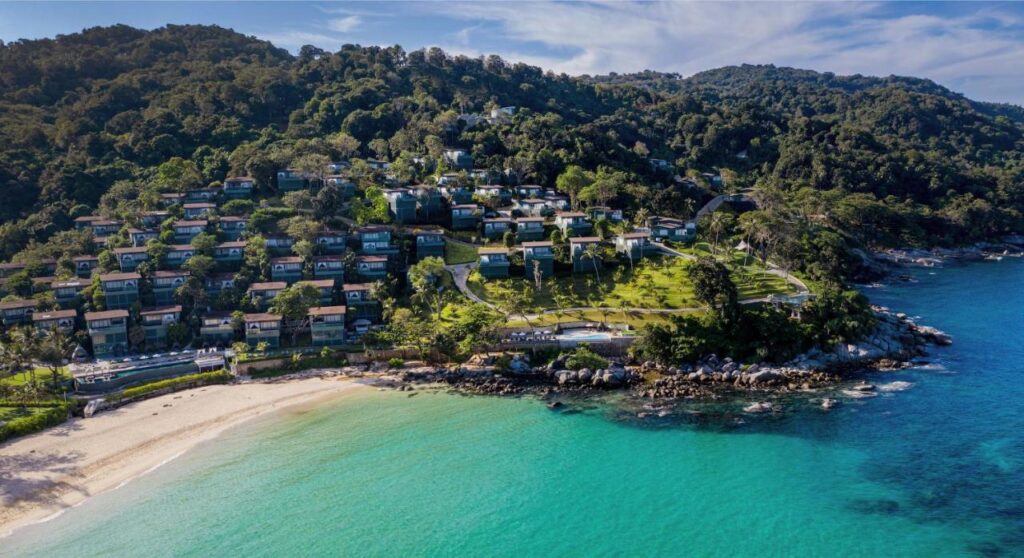
Sea Dance Resort
Sea Dance Resort is an idyllic retreat that is tucked away in a quiet corner of Koh Samui Island, Thailand. This elegant resort boasts a unique blend of modern luxury and traditional Thai culture, making it the perfect destination for anyone looking to indulge in a rejuvenating vacation. The resort is situated in the heart of an expansive palm grove, providing guests with a serene and tranquil atmosphere. There are a variety of room options available, including the exclusive Garden Villas and Ocean View Suites, all of which are fitted with modern amenities and offer stunning views of crystal-clear ocean waters.
The resort’s stunning infinity pool is the perfect place to relax, unwind and take in the spectacular view of the ocean. The resort offers a range of activities, including a fitness center, a spa, and a range of water sports such as kayaking and paddleboarding. The resort’s beachfront restaurant offers a delectable selection of Thai and international cuisine, all of which are made using the freshest ingredients. The resort is perfect for couples and families who want to enjoy a luxurious and peaceful vacation away from the hustle and bustle of city life. The excellent service and unparalleled hospitality provided by the staff ensure that guests have a truly memorable stay at Sea Dance Resort.
Click Here to view the current rates and availability of Sea Dance Resort
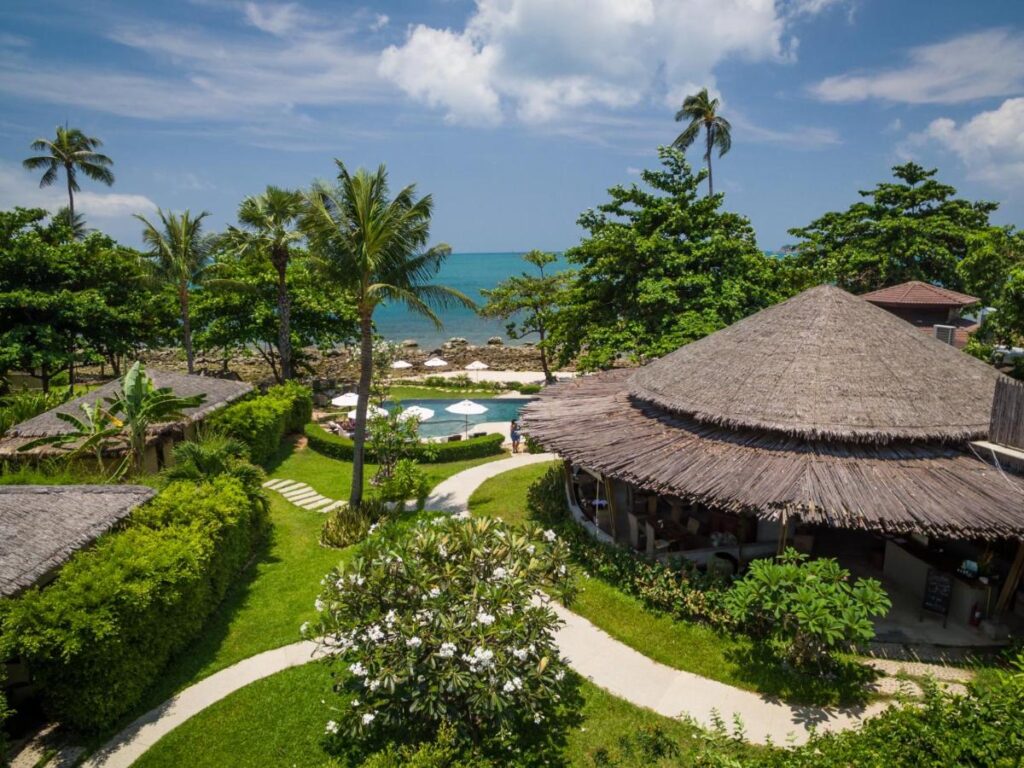
- Beachfront restaurant
- Water sports

Panvaree Resort is a beautiful retreat nestled in the heart of the lush tropical rainforest of Khao Sok National Park in Thailand. The resort offers an authentic jungle experience to visitors with its luxurious tents and treehouses that provide comfortable accommodation and a breathtaking view of the surrounding verdant landscape. The resort’s eco-friendly philosophy is evident in every aspect of the property, from the use of renewable energy to the incorporation of local materials in the construction of the structures. The resort also boasts an array of outdoor activities, including kayaking, trekking, and wildlife spotting, making it an ideal choice for adventure seekers and nature lovers.
The resort’s restaurant serves a delectable range of Thai and international cuisine made from locally sourced ingredients. The bar is also well-stocked with an extensive collection of wines and cocktails, providing a perfect setting for guests to unwind and soak in the stunning surroundings. Panvaree Resort is an ideal destination for those who seek a tranquil escape from the hustle and bustle of city life, and an opportunity to reconnect with nature in a sustainable and responsible manner.
Click Here to view the current rates and availability of Panvaree Resort

Eden Beach Khaolak Resort and Spa is a luxurious retreat located in the scenic region of Khao Lak in Thailand. The resort is nestled amidst lush tropical gardens and offers a private beachfront that overlooks the Andaman Sea. The architecture of the resort is inspired by traditional Thai designs, and the decor is a blend of contemporary and rustic styles. The spacious rooms and suites at the resort feature modern amenities such as air conditioning, flat-screen TVs, free Wi-Fi, and en-suite bathrooms. Some of the suites offer private balconies with sea views, and there are also villas with private pools. The resort boasts an array of facilities such as a beachside swimming pool, a fitness center, a spa, a kid’s club, and a variety of dining options, including a beachfront restaurant and a pool bar.
The location of Eden Beach Khaolak Resort and Spa offers an excellent base to explore the nearby natural attractions, including the Khao Sok National Park, the Similan Islands, and the Surin Islands. The resort also offers various activities such as cooking classes, water sports, and excursions to local markets and temples. The resort’s exceptional service and stunning location make it a popular choice for couples, families, and solo travelers looking for a peaceful and relaxing holiday. Whether you want to soak up the sun on the private beach, indulge in a spa treatment, or explore the local culture, Eden Beach Khaolak Resort and Spa is a perfect destination for a tropical getaway.
Click Here to view the current rates and availability of Eden Beach Khaolak Resort and Spa
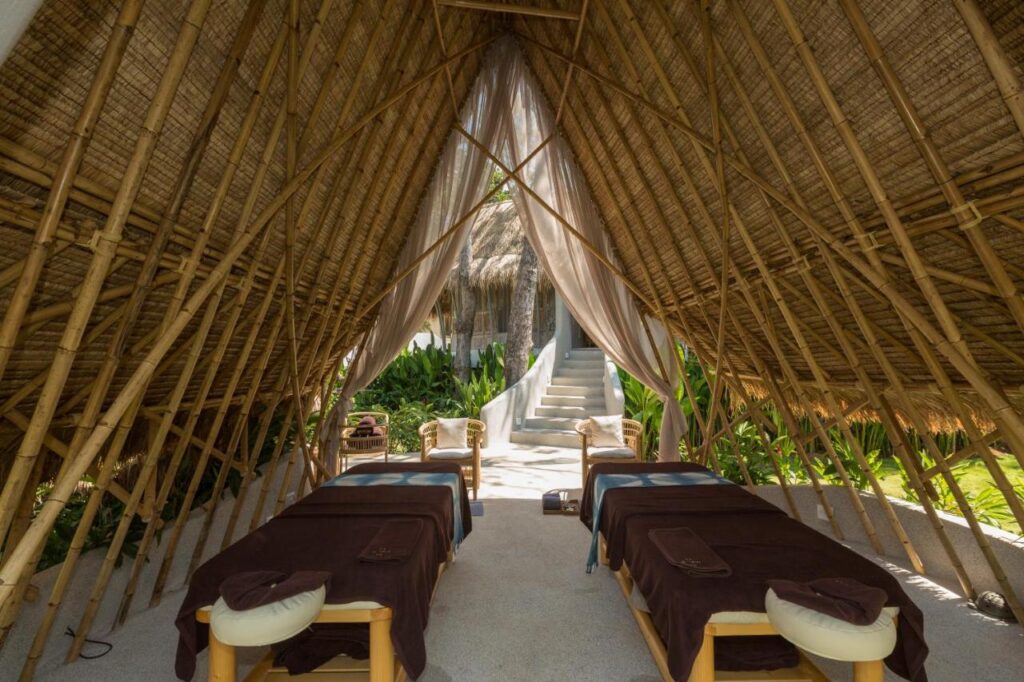
Yao Yai Beach Resort
Yao Yai Beach Resort is a luxurious beachfront resort located on the beautiful island of Koh Yao Yai in Thailand. The resort boasts breathtaking views of the Andaman Sea and is surrounded by lush tropical gardens. The resort features 30 deluxe villas that are elegantly decorated and equipped with modern amenities such as air conditioning, flat-screen TVs, and free Wi-Fi. The villas come with a private terrace or balcony that overlooks the sea or garden. Guests can indulge in a range of activities such as diving, kayaking, and cycling or take a dip in the resort’s outdoor pool. The on-site restaurant serves a variety of local and international dishes and guests can also enjoy drinks at the beach bar.
The Yao Yai Beach Resort is a perfect destination for travelers looking for a peaceful retreat. The resort offers a tranquil atmosphere with its secluded location and well-manicured gardens. The villas are spacious and comfortable, providing a home away from home experience. The resort’s staff is friendly and attentive, ensuring that guests have a memorable stay. The resort’s location also provides an opportunity to explore the island’s stunning beaches and natural beauty. Overall, Yao Yai Beach Resort is an excellent choice for those seeking a relaxing vacation in a serene and luxurious setting.
Click Here to view the current rates and availability of Yao Yai Beach Resort
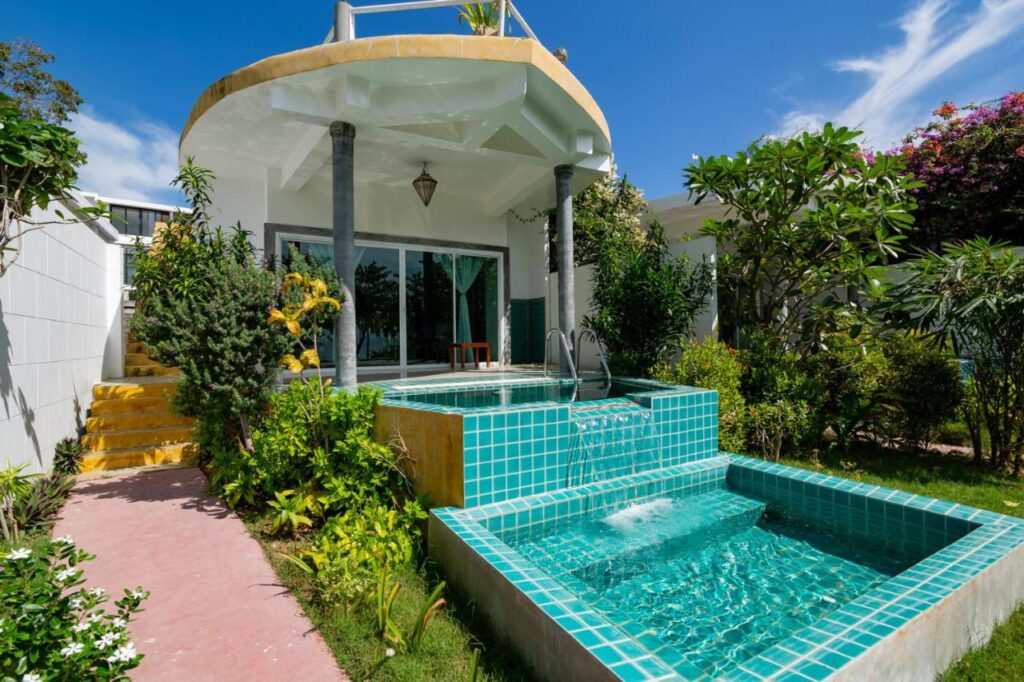
Pullman Phuket Arcadia Naithon Beach
The Pullman Phuket Arcadia Naithon Beach is a luxurious beachfront resort situated on the pristine shores of Naithon Beach in Phuket, Thailand. The hotel boasts a contemporary design and offers breathtaking views of the Andaman Sea. The resort features 277 rooms and suites, all of which are spacious, elegant, and equipped with modern amenities. Each room is designed with comfort and style in mind, featuring plush bedding, a private balcony, and a well-appointed bathroom with luxurious bath amenities. The resort’s facilities include a fitness center, a spa, an infinity pool, and multiple dining options that serve a variety of local and international cuisine. The Pullman Phuket Arcadia Naithon Beach is an ideal destination for travelers seeking a luxurious retreat with a tranquil beachfront setting.
Apart from the stunning location and luxurious amenities, the Pullman Phuket Arcadia Naithon Beach also offers a wide range of activities and experiences for guests to enjoy. The resort is a perfect place for water sports enthusiasts, with activities like kayaking, surfing, and snorkeling available at the beach. Guests can also explore the nearby Phuket Elephant Sanctuary, Phuket FantaSea cultural theme park, and the Big Buddha statue. The resort’s team of experienced staff is always ready to assist guests in planning their activities and providing insider knowledge about the local attractions. With its stunning location, elegant design, and exceptional service, the Pullman Phuket Arcadia Naithon Beach is an excellent choice for a memorable vacation in Phuket.
Click Here to view the current rates and availability of Pullman Phuket Arcadia Naithon Beach
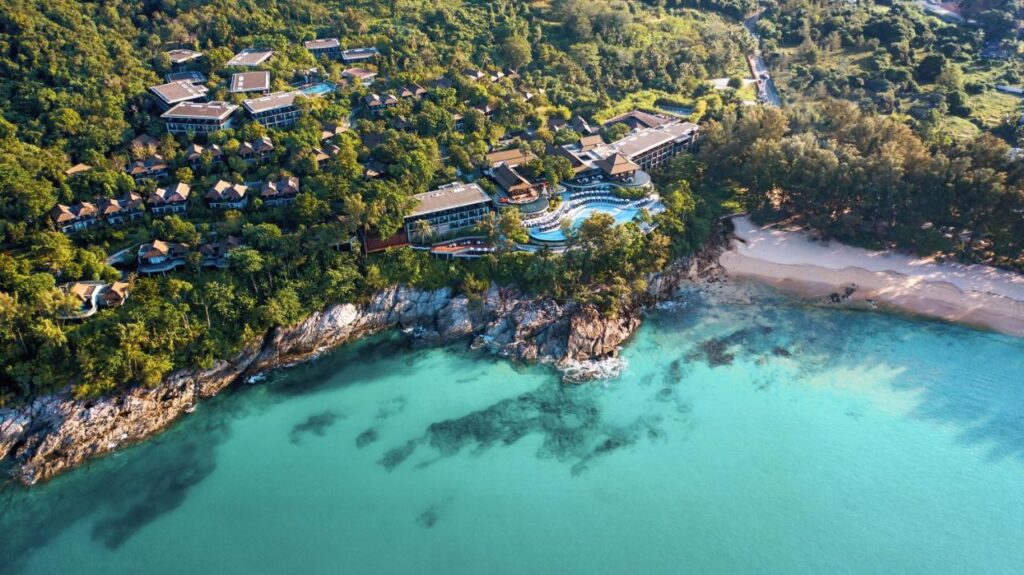
- Elephant Sanctuary
- Big Buddha statue
- Cultural theme park

Anahata Resort
Anahata Resort is a wellness retreat located in Koh Phangan, Thailand. The resort provides a peaceful and serene environment that encourages guests to slow down and focus on their physical and mental well-being. The resort’s focus is on holistic wellness, with a variety of yoga, meditation, and healing programs on offer. The resort also offers healthy and delicious vegetarian meals, spa treatments, and other holistic therapies to help guests achieve balance and harmony. The accommodations are comfortable and spacious, with a range of rooms and villas to suit different budgets and needs. Anahata Resort is the perfect place to escape the stresses of daily life and reconnect with yourself in a natural and tranquil environment.
In addition to its wellness programs, Anahata Resort offers a variety of activities to help guests explore the beautiful island of Koh Phangan. The resort is just a short distance from the beach, and guests can enjoy swimming, snorkeling, and other water sports. The resort also organizes hiking trips, jungle treks, and other outdoor activities for those who want to explore the island’s natural beauty. For those who want to relax and unwind, the resort offers a peaceful swimming pool and plenty of hammocks and lounge chairs to soak up the sun. Anahata Resort is the ideal destination for anyone looking for a restorative and rejuvenating wellness vacation in a stunning tropical setting.
Click Here to view the current rates and availability of Anahata Resort
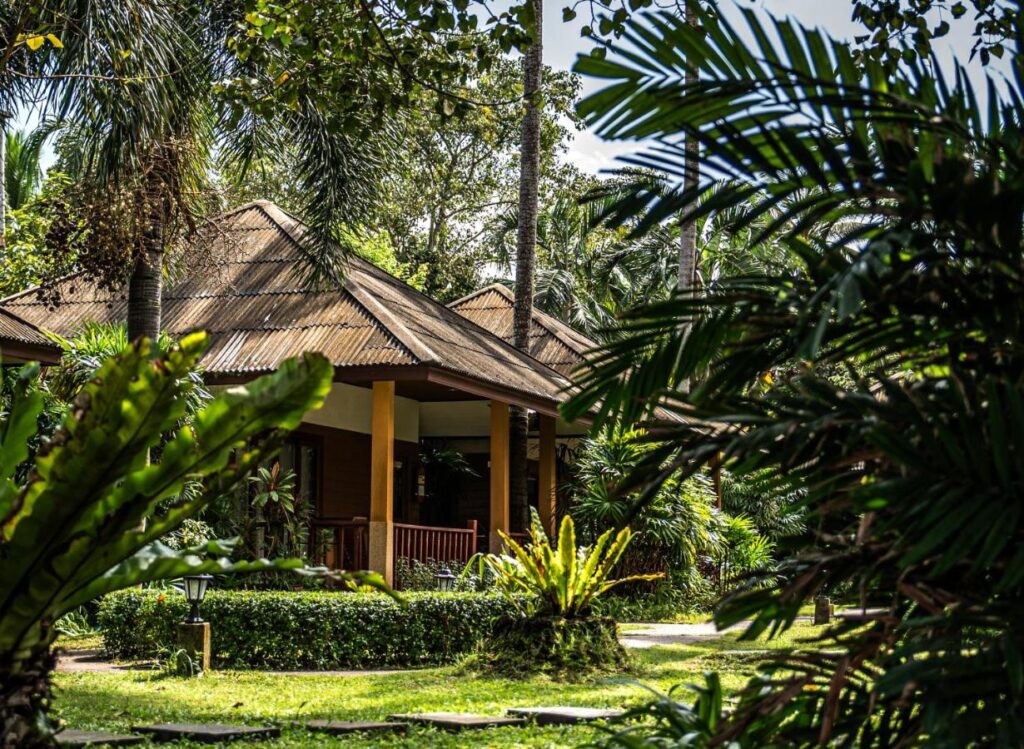
- Wellness programs
- Jungle treks
- Spa treatments

Hotel Ibis Samui Bophut
Hotel Ibis Samui Bophut is a contemporary hotel located in the heart of Bophut, a popular tourist destination on the island of Koh Samui, Thailand. The hotel features modern amenities and minimalist décor, with a range of room options to suit different budgets and preferences. All rooms are air-conditioned and equipped with free Wi-Fi, flat-screen TVs, and tea and coffee-making facilities. The hotel’s facilities include an outdoor swimming pool, a fitness center, and a restaurant serving international cuisine. The hotel’s convenient location puts guests within walking distance of Bophut Beach, Fisherman’s Village, and other popular attractions. Additionally, the hotel provides a shuttle service to and from Koh Samui International Airport, which is approximately a 15-minute drive away.
Overall, Hotel Ibis Samui Bophut is an excellent choice for those seeking a comfortable and affordable stay in Koh Samui. The hotel’s prime location, modern facilities, and attentive staff make it a popular choice among travelers. Whether you’re traveling for business or leisure, the hotel provides a comfortable and relaxing environment to recharge and explore the beauty of the island. With its affordable rates and top-notch amenities, Hotel Ibis Samui Bophut is a great option for those seeking a budget-friendly yet luxurious stay on Koh Samui.
Click Here to view the current rates and availability of Hotel Ibis Samui Bophut
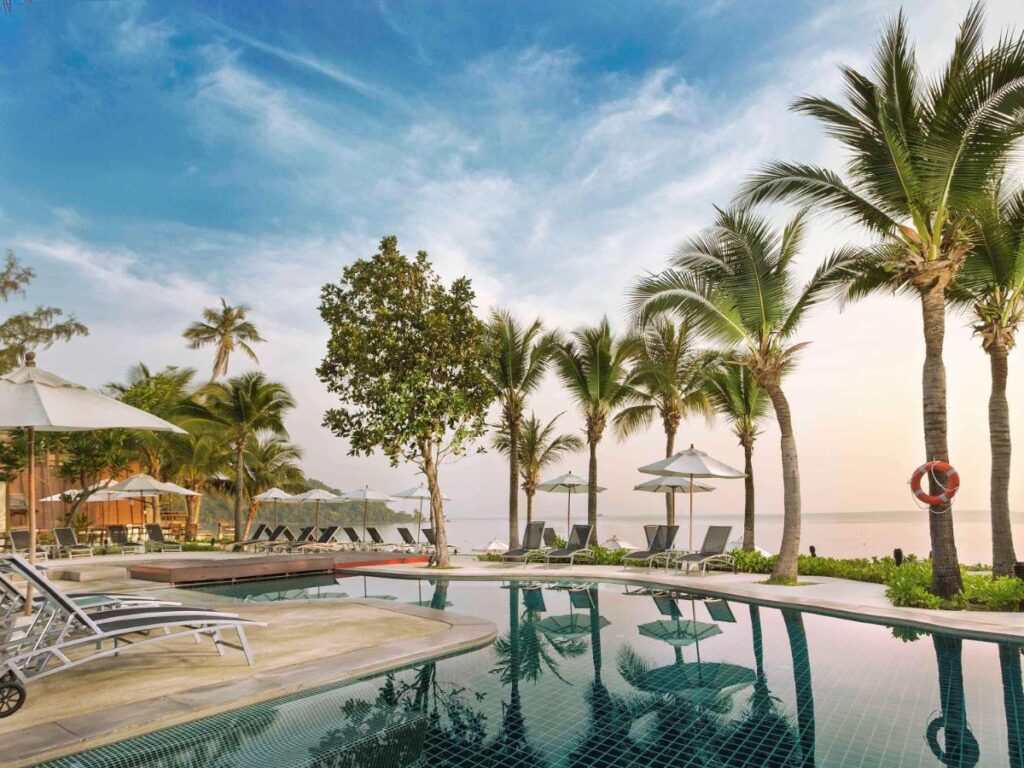
- Fisherman’s Village
- Close to airport
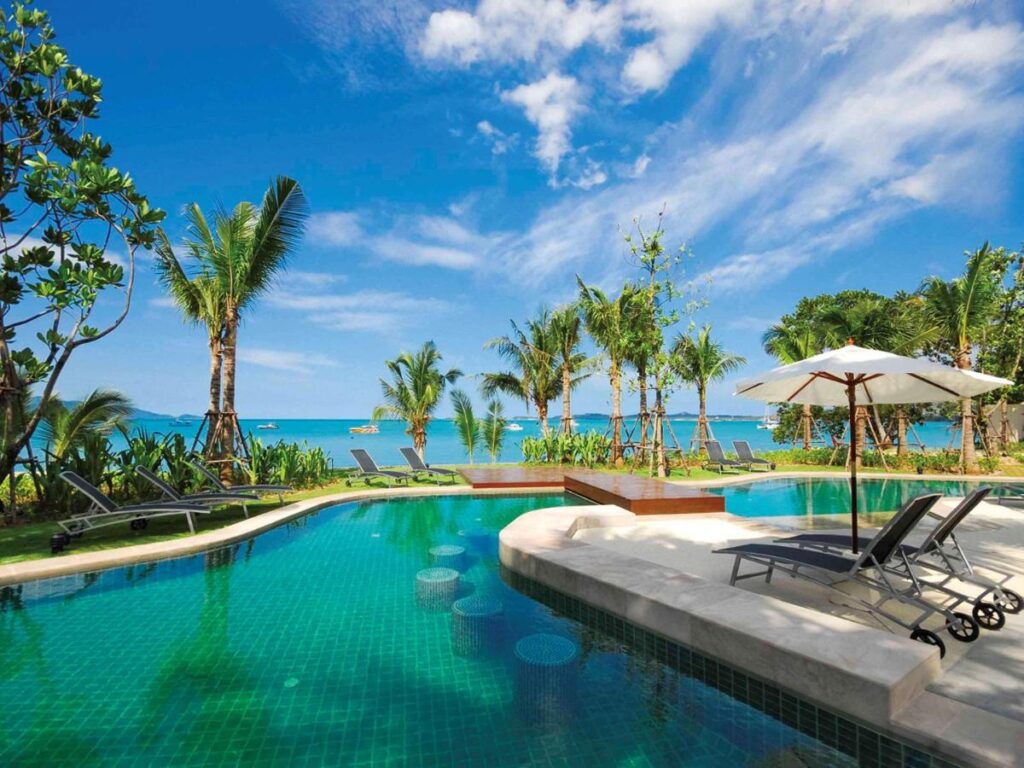
Seavana Koh Mak Beach Resort
Seavana Koh Mak Beach Resort is a stunning resort located on the beautiful island of Koh Mak in Thailand. The resort boasts a picturesque location and features a range of amenities, making it the perfect destination for travelers seeking a tropical getaway. The resort has a range of luxurious villas and suites to choose from, all of which are stylishly designed and offer unparalleled comfort and relaxation. Each of the villas is equipped with modern amenities, including air conditioning, flat-screen televisions, and free Wi-Fi, ensuring a comfortable and connected stay for all guests.
The resort has a range of facilities and activities to offer, including an outdoor swimming pool, a fitness center, and a spa. Guests can also enjoy a range of water sports activities, such as kayaking, paddle boarding, and snorkeling. The resort’s restaurant serves a range of delicious Thai and international cuisine, using fresh, locally-sourced ingredients. The friendly and attentive staff at Seavana Koh Mak Beach Resort ensures that all guests have a comfortable and memorable stay on this beautiful island paradise. Whether you’re seeking a relaxing beach vacation or an action-packed adventure, Seavana Koh Mak Beach Resort is the perfect destination for you.
Click Here to view the current rates and availability of Seavana Koh Mak Beach Resort
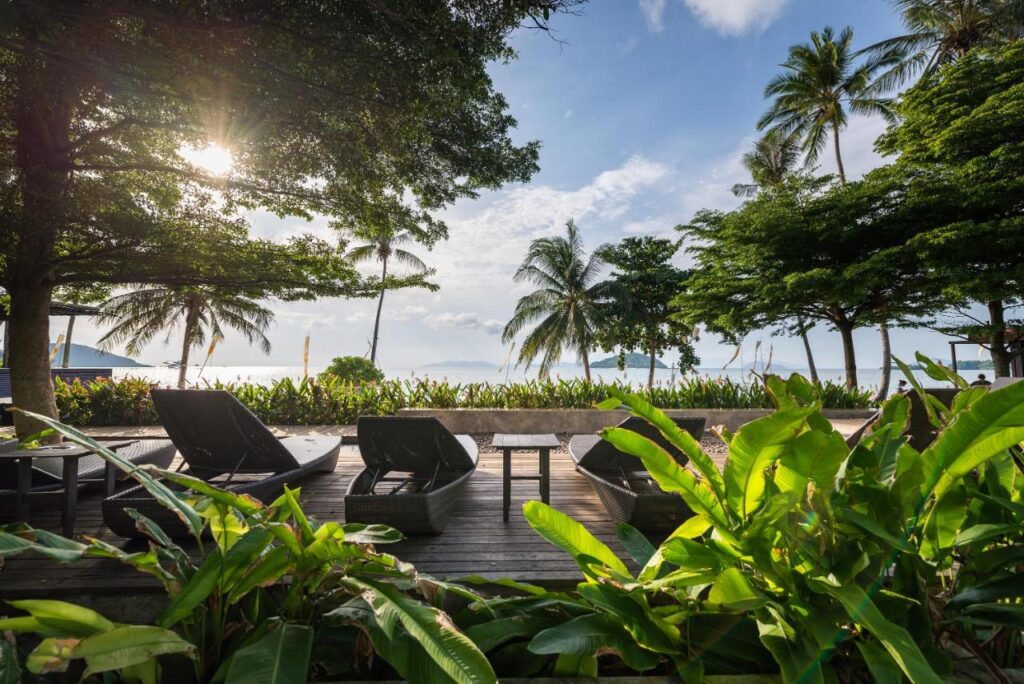
The River Kwai Jungle Rafts are an innovative and unique accommodation option located in the heart of the Thai jungle. The raft houses are constructed entirely out of bamboo and are anchored to the banks of the River Kwai, providing an authentic and immersive experience for travelers. The eco-friendly rafts are not equipped with electricity, and guests are provided with kerosene lamps and candles to light their rooms at night. This creates a truly serene and peaceful atmosphere, allowing visitors to disconnect from the outside world and immerse themselves in the natural surroundings.
In addition to the comfortable bamboo raft houses, the River Kwai Jungle Rafts offer a range of exciting activities for guests. Visitors can take a refreshing swim in the river, take a guided trek through the jungle, or simply relax and enjoy the tranquil surroundings. The rafts are also located near the famous Bridge over the River Kwai, and visitors can take a guided tour to learn about the history of the area. Overall, the River Kwai Jungle Rafts offer a unique and unforgettable experience for travelers looking to escape the hustle and bustle of modern life and connect with nature.
Click Here to view the current rates and availability of River Kwai Jungle Rafts
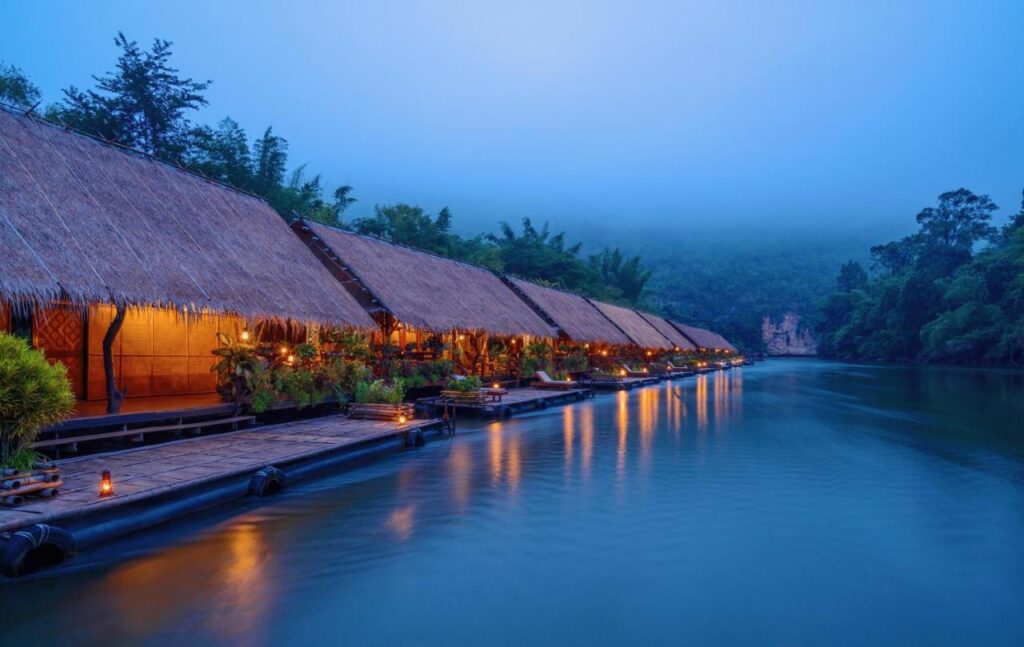
Thailand offers a range of eco resorts that allow travelers to experience the natural beauty of the country in a sustainable and responsible way. These resorts are designed to have minimal impact on the environment and offer a range of eco-friendly features, from solar-powered electricity to locally sourced materials. The best eco resorts in Thailand offer a luxurious and immersive experience, with a range of activities and excursions available to explore the natural surroundings. For those who are passionate about the environment and want to reduce their carbon footprint, these eco resorts are the perfect option to relax, unwind and discover the natural wonders of Thailand.
WHAT DEFINES AN ECO LODGE
A type of lodging known as an eco-lodge is made with conservation efforts and the environment’s preservation in mind. Eco lodges, as opposed to conventional hotels and resorts, use environmentally friendly practices, renewable energy sources, and sustainable materials to lessen their carbon footprint. They are frequently found in isolated locations where tourists can appreciate and preserve the natural beauty of the surroundings, and many of them provide educational programs on the area’s ecology and culture. Travelers who want to engage in sustainable tourism and take in the beauty of nature without damaging the environment should consider staying at an eco-lodge.

COMMON QUESTIONS ABOUT ECO RESORTS IN THAILAND
- Which green practices are employed at Thailand eco resorts? Eco-friendly techniques like solar energy, water conservation, waste reduction and recycling, and organic gardening are frequently used in Thailand eco resorts.
- Do Thailand eco resorts provide contemporary amenities and services? Yes, eco resorts in Thailand provide up-to-date conveniences and services like Wi-Fi, air conditioning, swimming pools, spas, and restaurants.
- Compared to conventional resorts, are eco resorts in Thailand more expensive? Although the costs of eco resorts in Thailand can vary, they are typically on par with conventional resorts. However, some eco resorts might provide more opulent and exclusive experiences, which can cost more money.
- What types of activities are available at Thailand eco resorts? With a focus on the outdoors and environmentally friendly travel, eco resorts in Thailand provide a variety of activities like kayaking, island-hopping, yoga, cooking classes, and excursions to nearby villages and markets.
- How can I make sure the eco resort I pick is actually eco-friendly and sustainable? Look for certifications from organizations like the Global Sustainable Tourism Council (GSTC) or the Rainforest Alliance, and research the eco resort’s eco-friendly practices and initiatives on their website or by reading reviews from previous visitors to make sure it is truly eco-friendly and sustainable.
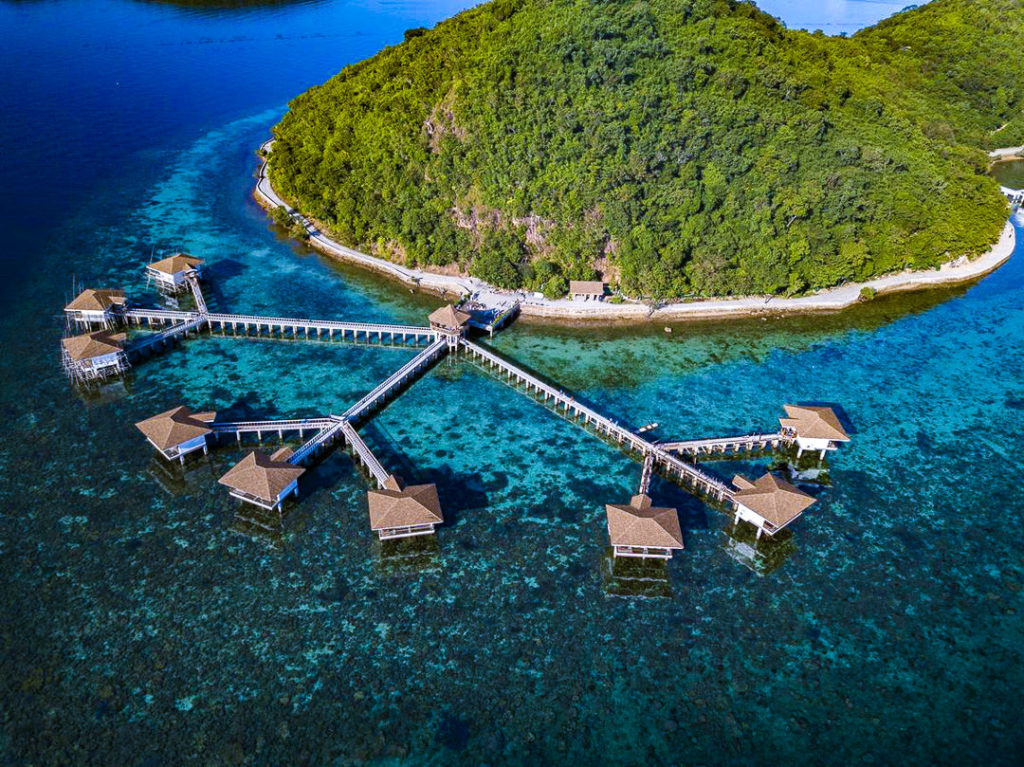

Travel Guide
- Things to Do
- Getting Around
- Entry Requirements & Customs
- Tips on Dining
- Special-Interest Vacations
- Calendar of Events
- Staying Healthy
- Getting There
- Tips on Accommodations
- Escorted & Package Tours
- Sustainable Travel & Ecotourism
- Tips on Shopping
- Tips for Families
- Tips for Gay and Lesbian Travelers
- Tips for Senior Travelers
- Tips for Single Travelers
- Tips for Student Travelers
- Tips for Travelers with Disabilities
- Tips for Women Travelers
- Staying Connected
- Regions in Brief
- Suggested Itineraries
Sustainable Travel & Ecotourism in Thailand
Unfortunately, Thailand is way behind much of the world in general eco-awareness; conflicts between economic and ecological interests generally work out in favor of the former. Environmental problems include deforestation, air and water pollution, flooding, habitat loss, and consequent species loss. Among the 33 mammals in danger of extinction in Thailand are tigers, leopards, and elephants. The last of these is a particular shame, as it was once revered (and still is in some quarters) as a creature of great spiritual significance; the few thousand that remain spend their time either entertaining tourists at elephant camps or searching for food in a shrinking forest.
Fortunately, several nongovernment organizations (NGOs), such as the World Wildlife Fund, have an active presence in the country, attempting to draw attention to the most serious problems. Thai authorities are also finally taking tiny steps to preserve the nature and wildlife of its many different ecological zones, from swamp jungles in the south, to mountain forests in the north, to the many marine parks in the Gulf of Thailand and the Andaman Sea.
As the world's leading exporter of rice, Thailand is at the forefront of research into new strains of the crop that are both more nutritious and less harmful in terms of use of pesticides. More and more restaurants are serving brown rice as well as white rice. Also, look out for Doi Kham brand fruits, vegetables, juices, and preserves (on sale in many airports). These are products of the King's royal projects, which provide work for rural people while following organic farming principles.
Recycling in Thailand still refers to folks who go around buying up old papers, cans, and bottles, which they then sell for a pittance. Nowhere is trash separated at source before disposal. Your hotel may be your best bet for finding a place to deposit recyclable waste, especially if you choose a hotel that has instituted sustainable practices.
Visitors who choose to spend their time cycling, trekking, or kayaking in the kingdom inevitably have less detrimental impact on the country than those who breeze around in tour buses churning out carbon dioxide. However, choosing a responsible tour operator is not easy, as just about all of them these days use the buzzword "eco-tourism" in their sales pitches. Ask them exactly what they are doing to reduce their carbon footprint and to benefit the local community in the areas that their tours visit. For a list of local green operators, contact the Thai Ecotourism and Adventure Travel Association (tel. 02642-5465; www.teata.or.th ).
Some hotel groups, such as the Banyan Tree resorts in Bangkok and Phuket, have made huge efforts over the past decade to implement sustainable projects, including a pledge to reduce their carbon footprint in all their resorts by 10% each year.
When booking hotels, particularly on the beach, consider carefully whether you really need a room with air-conditioning and other power-draining equipment such as fridges, TVs, and DVD players. These days many eco-friendly, luxury resorts do not offer air-conditioning; instead, they provide well-designed, wooden bungalows with balconies that attract a delicious breeze, allowing you to appreciate your surroundings more than in an enclosed room, and mosquito nets over the beds can save you from nighttime discomfort. You can also sleep more soundly knowing your stay is making minimal impact on the environment.
In more than 110 national parks, visitors can see the local wildlife species in residence, as well as appreciate the delicate balance of each habitat. The more popular parks have clearly displayed interpretation facilities at their visitor centers, as well as trails with bridges and catwalks, and markers explaining the important elements of the environment and its inhabitants. They also provide log-cabin-style bungalow accommodations, plus tents and supplies for campers. Get in touch with the Department of National Parks at tel. 02561-0777, or visit their website ( www.dnp.go.th/parkreserve/nationalpark.asp ), where you can find information about the parks and also make online reservations.
General Resources for Green Travel
Responsible Travel ( www.responsibletravel.com ) is a great source of sustainable travel ideas; the site is run by a spokesperson for ethical tourism in the travel industry. Sustainable Travel International ( www.sustainabletravelinternational.org ) promotes ethical tourism practices, and manages an extensive directory of sustainable properties and tour operators around the world.
Carbonfund ( www.carbonfund.org ), TerraPass ( www.terrapass.org ), and Carbon Neutral ( www.carbonneutral.org ) provide info on "carbon offsetting," or offsetting the greenhouse gas emitted during flights.
For information on animal-friendly issues throughout the world, visit Tread Lightly ( www.treadlightly.org ).
Note : This information was accurate when it was published, but can change without notice. Please be sure to confirm all rates and details directly with the companies in question before planning your trip.

- All Regions
- Australia & South Pacific
- Caribbean & Atlantic
- Central & South America
- Middle East & Africa
- North America
- Washington, D.C.
- San Francisco
- New York City
- Los Angeles
- Arts & Culture
- Beach & Water Sports
- Local Experiences
- Food & Drink
- Outdoor & Adventure
- National Parks
- Winter Sports
- Travelers with Disabilities
- Family & Kids
- All Slideshows
- Hotel Deals
- Car Rentals
- Flight Alerts
- Credit Cards & Loyalty Points
- Cruise News
- Entry Requirements & Customs
- Car, Bus, Rail News
- Money & Fees
- Health, Insurance, Security
- Packing & Luggage
- -Arthur Frommer Online
- -Passportable
- Road Trip Guides
- Alaska Made Easy
- Great Vacation Ideas in the U.S.A.
- Best of the Caribbean
- Best of Mexico
- Cruise Inspiration
- Best Places to Go 2024
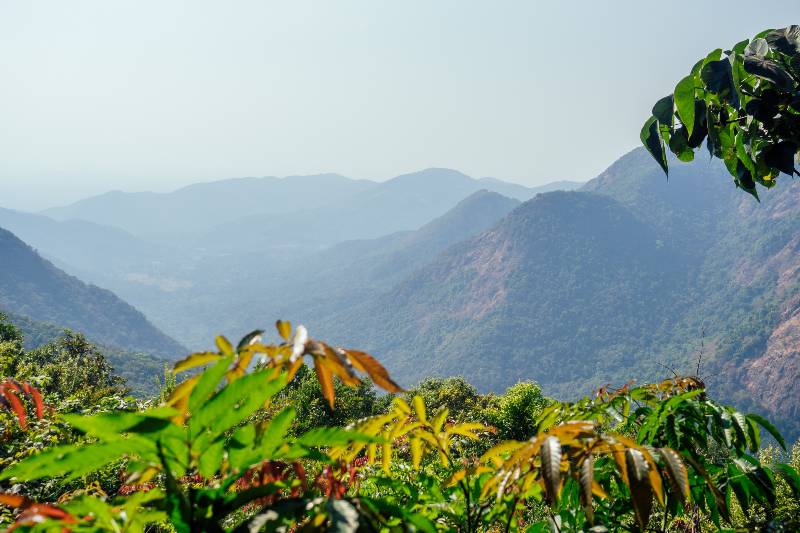
Sustainable Adventure: Ecotourism in Thailand
The Sustainable tourism industry is an option worth considering for those looking to make a positive impact on the environment while on holiday. On top of being aware and conscious about our actions during travel, we can also explore incredible destinations that offer unique community-based tourism experiences. Thailand has long been known for its rich culture and stunning landscape – which makes it an ideal place for eco-travelers searching for meaningful trips filled with adventure. In this blog post, let’s discover some of the best options when it comes to experiencing all that Thailand’s ecotourism has to offer!
At a special ceremony, the Thailand tourism awards proudly bestowed 94 awards upon those in the Thai travel industry for their hard work and dedication to creating amazing experiences for tourists from all over. TAT celebrated these individuals’ commitment to excellence with an impressive recognition event that stands as a symbol of appreciation within this rapidly growing tourism sector.
Key Takeaways
- Sustainable tourism allows travelers to explore amazing landscapes while encouraging respect and appreciation of local culture and nature.
- With its stunning geography, Thailand can inspire profound connections between visitors and their natural environment through meaningful ecotourism experiences.
- Ecotourism connects us to natural and cultural values, inspiring appreciation and respect for the environment around us.
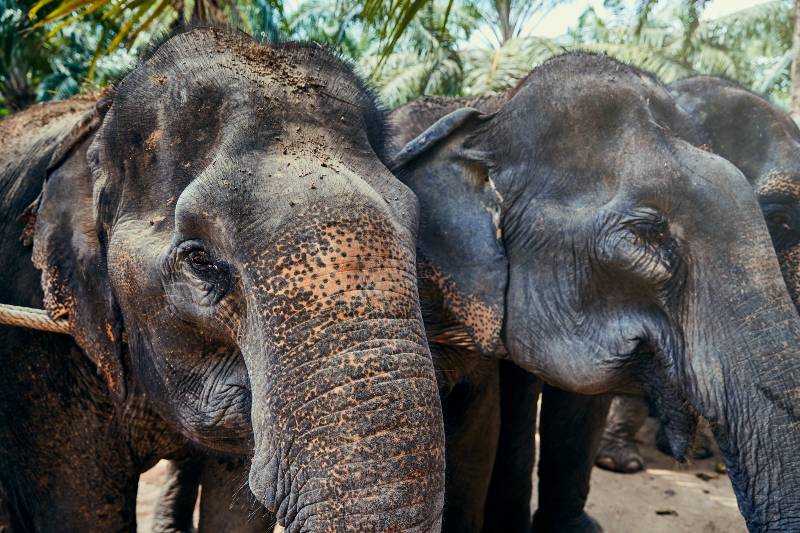
Ecotourism in Thailand has always been a major draw for many tourists who are looking for an adventurous getaway. In order to maintain its culture and ecosystem, the Tourism Authority of Thailand (TAT) came up with the Thailand Tourism Awards in 1996 to encourage the promotion and practice of ethical, sustainable tourism.
These awards are given out each year to companies and organizations that demonstrate responsible tourism practices without compromising mass tourism. This allows people from all over the world to enjoy a unique but safe experience in an adventure-seeking environment.
Popular Ecotourism Destinations in Thailand
Overview of popular ecotourism destinations in Thailand, including:
Khao Yai National Park
If you are looking for an unforgettable nature experience and the opportunity to view some of Thailand’s most majestic wildlife, then look no further than Khao Yai National Park . Located just 180 km from Bangkok, this park has been inspiring visitors since 1962 when it was established as Thailand’s first national park. It is also part of the Dong Phayayen-Khao Yai Forest Complex—a UNESCO World Heritage Site that covers five protected areas in total across Cambodia and southern Thailand borders.
Located in the beautiful countryside between Bangkok and Chiang Mai, this Wildlife Sanctuary offers visitors a unique opportunity to spend quality time with these amazing animals. Home to many rescued elephants who were previously kept captive for logging or tourism purposes; here you can get an insight into their lives while learning more about some of the less-known disputes surrounding them from our specialized staff.
Khao Sok National Park
Uncover the ancient wilderness of Khao Sok National Park , Southern Thailand – a nature lover’s paradise full of flavor. Immerse yourself in its diverse terrain: dense evergreen rainforest that is millions of years old and jagged limestone mountains towering high above deep valleys throughout the region.
Discover immense lakes, mysterious caves, and teeming wildlife while exploring alongside friendly elephants or canoeing on tranquil waters! Unforgettable moments await at Cheow Larn Lake – behold surreal floating raft houses nestled among lush foliage for an unforgettable glamping experience. Whether you’re vacationing from Phuket to Koh Samui or anywhere else nearby, there’s no doubt your visit will be nothing short of spectacular!
Mu Ko Chang National Park , situated in the Gulf of Thailand and part of the Trat Province near Cambodia’s border, encompasses an area spanning 650 km² over 52 islands. It teems with several community tourism activities – from beautiful waterfalls to vibrant coral reefs providing stunning views and a wide variety of experiences perfect for any adventurer! With more than 110 distinct bird species like heart-spotted woodpeckers, booted eagles, and ochraceous bulbuls recorded in this national park; you won’t be disappointed if spotting avian life is on your agenda.
Doi Inthanon National Park
Nestled in the mountains of northern Thailand, the majestic Doi Inthanon National Park is home to sprawling vistas and abundant wildlife. Not only does it boast a picturesque peak –the highest point in all of Thailand– but this park also provides an array of educational experiences; from visiting hidden waterfalls, exploring fishing laboratories and breeding centers for plants, or observing local rice fields and vegetable gardens as part of King Raja Bhumibol Adulyadej’s 1969-founded “ King’s Doi Inthanon Project “. This initiative promoted sustainable commercial farming techniques among vulnerable communities or local communities struggling with deforestation poverty issues and opium production.
Ecotourism Activities in Thailand
Explanation of popular ecotourism activities in Thailand, including:
Trekking and hiking
Thailand is a tropical paradise with exciting wildlife and scenery to explore. From lush jungles to towering mountaintops, and mangrove forests to stunning beaches, the perfect ecotourism experience awaits! Trekking or hiking are two of the best ways visitors can uncover this beautiful country – each journey presents an opportunity for discovery while learning about its amazing biodiversity. For those looking for an unbeatable adventure into nature’s wonders coupled with safety tips from professionals, guided tours offer unique insight that will make your trip truly unforgettable!
Wildlife observation
From its lush rainforests and coral reefs to stunning mountain vistas and tranquil rice paddies, the country has something for everyone. Explore a diverse array of wildlife habitats on foot with trekking activities that will take you off the beaten track. Keep your eyes peeled as well; hundreds of species can be found including birds, butterflies, reptiles, and mammals – making this destination perfect for birdwatchers or nature enthusiasts looking to observe some amazing creatures up close
Bird watching
Thailand is an ecotourism paradise, with its tropical monsoon climate offering the perfect habitat for birds. One of the most popular ecotourism activities in Thailand is bird watching. As the dry season runs from November to April and the rainy season takes up May through to October, ideal birdwatching environments are found mainly in Krabi province, Khao Nor Chu Chi, and Halabala Wildlife Sanctuary , situated in Narathiwat province. Along with some other gems tucked away around the country, these spots give environmentally-conscious travelers plenty of opportunities to enjoy a unique bird-viewing experience.
Scuba diving and snorkeling
Thailand is well-known for its oceanic beauty and an incredible array of marine wildlife, making it an ideal destination for travelers who want to experience the wonders of ecotourism – particularly scuba diving and snorkeling. Koh Tao, Koh Samui, Krabi, Koh Phi Phi, Pattaya, Phuket, Similan Islands, Koh Lanta, Koh Lipe, and Surin Islands are all renowned sites for diving in Thailand that allow visitors to immerse themselves in crystal clear azure waters populated by a rich array of vibrant coral reefs teeming with colorful fish.
Whether you are a seasoned diver or a beginner testing out your newfound aquatic prowess for the first time, scuba diving in Thailand is sure to provide an unforgettable adventure! Make sure to ask experienced professionals to guide you if you ever want to try this out.
Sustainable agricultural tours
Go on a coffee journey in Chiang Rai
For ecotourism activities in Thailand, the three-day coffee journey from the Ban Mae Chan Tai Agro-Tourism Centre is an excellent choice. Those who embark on this amazing trip will be able to immerse themselves in learning about the Akha way of life and their expertise in growing coffee, which has become a favorite nationwide.
The sustainable agricultural tour was made possible by the Thai Royal Projects, which works to support farmers in remote areas. This is an opportunity you cannot miss to learn and appreciate one of Thailand’s most impressive crops while exploring traditional lifestyles with hospitable locals.
Transform into an eco-warrior and explore the wonders of a tranquil Buddhist ashram.
Venture to Wongsanit Ashram and gain hands-on experience in sustainable living that is also enriched by an abundance of Buddhist culture. Founded in 1984 by the renowned socio-activist Sulak Sivaraksa, the eco-village two hours northeast of Bangkok has 10 permanent residents and encourages a lifestyle grounded in Dharma.
Whether you stay for a few hours or weeks, there are activities such as building adobe houses and cultivating organic food with guests, work-exchange visitors, and volunteers are all welcome too. The ashram is the perfect place to explore Eco tourism while catching a glimpse into Thailand’s unique traditions and cultures.
Try your hand at rice farming in the North-West
For those looking to spend meaningful time in Thailand, a visit to Ban Mae Klang Luang near Doi Inthanon National Park is highly recommended. Home to the Paganyaw people, they live simply using only natural resources and possess an intricate knowledge of the landscape and rice-farming techniques.
Visitors can take part in daily activities such as learning how rainbow trout and red claw crayfish are caught, working on the terraced rice fields, or even watching coffee being produced. There’s something for everyone during both the growing seasons (September to October) and harvest time (November to January).
Sustainable Tourism in Thailand
Discussion of sustainable tourism practices in Thailand, including:
Supporting local communities
According to switchasia.EU, Thailand steps up with a new policy to promote environmentally-friendly products and services.
The NESDP’s promotion of sustainability-focused development in Thailand is a positive step for travelers to embrace. Through sustainable tourism, which involves reducing negative impacts on the environment and supporting local communities, visitors can have a positive impact on the places that they visit.
By focusing on sustainability, visitors have the opportunity to spend time with locals, shop at locally-owned businesses and suppliers, and practice environmentally friendly activities such as camping and beach cleanups.
Doing so helps drive much-needed economic resources back into local communities – from jobs to education programs – while preserving the beauty of Thailand’s incredible landscapes.
Supporting sustainable tourism in Thailand is a win-win for all parties involved: travelers get to explore beautiful destinations without damaging them, local communities reap the benefits of increased resources, and protecting our planet remains a core value upheld by all.
Reducing environmental impact
In Thailand, sustainable tourism is an important priority. Measures have been implemented to reduce environmental impact and ensure a safe and green future, such as detecting vehicles that produce black exhaust smoke, prohibiting open burning, and cooperating with vehicle manufacturers to reduce air pollution.
Additionally, efforts have been made to popularize electric vehicles and decrease plastic consumption nationwide. Tourists can do their part by refraining from using disposable plastics while traveling in Thailand, helping the country in its commitment to reducing their ecological footprint.
Promoting cultural preservation
Thailand is firmly committed to sustainable tourism, with a focus on promoting cultural preservation.
Tourists are encouraged to learn more and engage with traditional cultures to ensure these practices are both shared and experienced. The benefits of this approach ensure that the local communities can continue to benefit from their unique culture while also helping promote it and protect it from globalized influences.
Thailand’s commitment to sustainable tourism contributes to its appeal as a travel destination and ensures the country continues to strive towards its mission of achieving a better world for future generations.
Encouraging responsible wildlife tourism
Thailand is a great example of how a nation can promote sustainable tourism responsibly and ethically. Government initiatives such as the WCS Thailand Program have wisely implemented strategies to ensure wildlife conservation, protection, and education.
Their smart patrol system helps manage human-wildlife interactions, while the Tiger Conservation and Elephant programs ensure both species can be safe from harm. They even create employment opportunities for guides and rangers that center around eco-tourism – providing travelers with opportunities to learn about and appreciate local flora and fauna.
Thanks to these amazing efforts, Thailand’s ecosystem is increasingly becoming more protected and resilient – allowing visitors to marvel at its natural beauty without having any negative impacts!
Ecotourism and Responsible Travel
Discussion of the importance of responsible travel and ecotourism in thailand.
As a country that relies heavily on tourism and its benefits, it is essential for Thailand to develop responsible approaches to ecotourism and travel. Responsible travelers in Thailand should embrace our collective responsibility to ensure that any trips we take, whether they’re in town or across the world, are as gentle on the environment and local communities as possible.
This involves activities such as buying items from local businesses, reducing waste by using eco-friendly products, engaging with indigenous cultures through meaningful exchanges, and paying for professionally-led tours run by companies adhering to ecological safety principles. Doing these things will not only cultivate a positive worldview amongst tourists but also help protect Thailand’s delicate habitats and communities while ensuring its people reap the economic benefits of travel well into the future.
Explanation of how travelers can contribute to sustainable and responsible tourism in Thailand
Taking the time to educate oneself about regional customs, behaviors, and expectations is an important part of traveling responsibly. In Thailand for example, it’s considered polite not to enter religious sites wearing revealing clothing.
Supporting local businesses in the area visited also helps contribute positively towards sustainable tourism – as does simply being respectful toward locals by showing patience and friendliness.
As a responsible traveler, there are lots of ways to make your journey not just meaningful for you but also beneficial to the communities and countries you visit.
Why not purchase authentic items from local artisans instead? This is an easy way to provide economic support directly – plus their products often have extra meaning attached! Also, be mindful that global travel comes with environmental responsibilities; no littering or carbon emissions will help conserve our planet’s precious resources.
With a few conscious changes to your lifestyle, you can make meaningful contributions to sustainable tourism when traveling through Thailand. Say no thank you to straws at the cafe and bring along your own reusable water bottle – just two simple steps which will help reduce plastic use long into future years.
Looking for more than just a vacation in Thailand? Want to extend your stay and call it home? Check out this article highlighting the 25 most amazing places across Thailand- perfect for staying long-term!
Thailand’s Ecotourism FAQs
What kind of activities can i expect to do on an ecotourism trip to thailand.
Immerse yourself in its vibrant culture by visiting rural villages, and enjoying bird watching, and nature-filled hikes with knowledgeable guides. You can even test your culinary skills at traditional Thai cooking or take up Muay Thai boxing for a truly thrilling experience! Make lasting impacts beyond just taking home memories as ecotourism trips to Thailand make positive contributions towards conservation efforts, giving you a fulfilling way to support sustainable practices while having fun.
Is it safe to go on an ecotourism trip in Thailand?
For many travelers, an ecotourism trip in Thailand can be a great way to experience its diverse and vibrant ecosystems. Although there are some potential risks with any type of travel, Thailand is generally a safe destination for vacationers. Travelers should take the usual precautions such as researching their accommodations and destinations prior to their trip, verifying all relevant visas and permits, and consulting their healthcare provider regarding necessary immunizations.
The local people of the communities visited in Thailand often provide responsible tour guide services and other eco-friendly resources to support safe tourism. All in all, if travelers are aware of their surroundings, they can enjoy a reliable and exciting ecotourism experience in beautiful Thailand.
What should I pack for an ecotourism trip to Thailand?
Planning an ecotourism trip to Thailand can seem overwhelming, but packing the right items is actually easier than it sounds. Travelers should remember to bring lightweight clothing that covers the body, like long-sleeved shirts and full-length pants.
A wide-brimmed hat can provide additional sun protection if your itinerary includes walking around in the heat. It’s also important to bring insect repellent, as mosquitos and other insects can be a nuisance while you’re exploring Thailand’s lush jungles. Don’t forget to pack plenty of water, a first aid kit, and a flashlight so that you’re prepared for whatever may come up during your eco-tourism journey!
How can I ensure that my ecotourism trip to Thailand is sustainable and responsible?
An ecotourism trip to Thailand can be a rewarding experience not only for you but also for the locals and their environment. Ensure your stay is sustainable by researching local travel companies with an established record of supporting ecology, you can also contact the Tourism Authority of Thailand for help and for more information .
This way, you are helping reduce environmental impact while knowing that your money goes right back into the region! Engaging with communities during visits will provide unique experiences as well as benefits economically – allowing both local and international tourists to gain something from it all. Making sure these considerations come first when planning a Thai getaway allows everyone involved to reap long-lasting rewards without disrupting natural life or culture in any form.
What kind of wildlife can I expect to see on an ecotourism trip to Thailand?
For nature and wildlife lovers, a trip to Thailand is the perfect opportunity to explore its captivating ecosystems with unparalleled biodiversity. From curious birds like warblers, orioles, and bulbuls, to majestic mammals such as macaques and tigers – not forgetting countless exotic fish species in crystal clear waters! With so many national parks on offer along with various habitats that have earned Thailand fame for being home to diverse creatures around the world – it’s definitely worth ticking off your bucket list if you haven’t already done so.
With its many natural wonders, Thailand is a fantastic destination for sustainable and responisble travelers who want to enjoy all the country has to offer without harming the environment or local communities. There are plenty of trekking and hiking opportunities in Thailand’s national parks, as well as chances to observe wildlife and go bird-watching. And by supporting local businesses and following sustainable tourism practices, visitors can help reduce their environmental impact while promoting cultural preservation.
So if you’re planning a trip to Thailand, be sure to keep ecotourism and responsible travel in mind! And don’t forget to subscribe to our newsletter for more information about living in Thailand.
Similar Posts


The Truth About Healthcare in Thailand for Expats
![ecological tourism in thailand Thailand Elite Visa Program [Pros & Cons]](https://betterlivingasia.com/wp-content/uploads/2022/10/Thailand-Elite-Visa-Program-1-768x509.jpg)
Thailand Elite Visa Program [Pros & Cons]

Thailand’s Cultural Gems: Unveiling Rich Traditions

The Best Wellness Retreats in Thailand

Thai 101: Essential Resources for Thai Language Novices

Living in a Buddhist Country: Understanding and Respect Thai Culture

Experiences
Eco tourism.
Ecotourism, or green travel, has been popular in Thailand for many years due to an abundance of natural resources, from the pine forests in the north to the awesome maritime caves in the south.
There is a wide range of ecotourism activities to enjoy in Thailand. These include trekking and hiking, nature and wildlife observation, bird watching, horseback riding, mountain biking, bamboo rafting, rock climbing and much more. Ecotourism has been diligently promoted by the Thai government and the Tourism Authority of Thailand for more than 20 years.
The fastest growing sector of the travel business for the last decade, ecologically minded tourism now accounts for about 25% of the industry. Long the nucleus of eco-tourism in Southeast Asia, Thailand has been going green for decades. Visitors are encouraged to inquire about the ecological impact of any activity they pursue in-country.
Winter is here! Check out the winter wonderlands at these 5 amazing winter destinations in Montana
- Travel Destinations
12 Best Eco Resorts In Thailand: Complete Guide
Published: October 11, 2023
Modified: December 28, 2023
by Valerie Abraham
- Hotel Reviews
- Plan Your Trip
- Travel Guide
Thailand, with its stunning beaches, lush rainforests, and vibrant culture, has long been a popular destination for travelers seeking relaxation and adventure. But for those who are conscious of the impact of their travels on the environment, Thailand offers a wealth of eco-friendly accommodation options that combine luxury with sustainability. From secluded beachfront resorts to jungle retreats, the country is home to some of the best eco resorts in the world. In this complete guide, we will take you on a journey through the 12 best eco resorts in Thailand, where you can immerse yourself in nature while minimizing your carbon footprint. Whether you are a nature lover, an eco-conscious traveler, or simply looking for a unique and responsible travel experience, these eco resorts are guaranteed to leave you rejuvenated and inspired. So pack your bags, grab your reusable water bottle, and let’s explore the wonders of eco-tourism in Thailand!
Soneva Kiri, Koh Kood
Situated on the pristine island of Koh Kood, Soneva Kiri is a true paradise for eco-conscious travelers. With its on-site organic gardens, innovative waste management systems, and commitment to renewable energy, this resort is a leader in sustainable luxury.
The Tongsai Bay, Koh Samui
Set amidst 28 acres of tropical gardens and overlooking a private bay, The Tongsai Bay is renowned for its environmental initiatives. From its rainwater harvesting system to its dedication to wildlife conservation, this resort sets a high standard for eco-friendly hospitality.
Zeavola Resort, Phi Phi Islands
Located on the stunning Phi Phi Islands, Zeavola Resort offers a unique back-to-nature experience. This resort is committed to preserving the island’s natural beauty through its coral reef restoration program and support for local marine conservation efforts.
Six Senses Yao Noi, Phang Nga Bay
Six Senses Yao Noi is a haven of luxury and sustainability, nestled on a picturesque island in Phang Nga Bay. The resort’s organic garden supplies fresh produce for its restaurants, while its solar power and water conservation initiatives minimize its ecological footprint.
The Sarojin, Khao Lak
The Sarojin, located in the tranquil town of Khao Lak, embraces responsible tourism practices. Their “Greening Community” program supports local schools, provides clean water to nearby villages, and promotes sustainable livelihoods for the community.
Rayavadee, Krabi
Surrounded by towering limestone cliffs and pristine beaches, Rayavadee offers a luxurious eco-experience in Krabi. The resort’s commitment to protecting the environment is evident through its recycling initiatives, energy-efficient practices, and support for local marine conservation.
Anantara Golden Triangle Elephant Camp & Resort, Chiang Rai
This unique resort seamlessly combines luxury with an elephant conservation program. Guests can interact with elephants in their natural habitat and learn about the resort’s efforts to protect this majestic species.
Pimalai Resort & Spa, Koh Lanta
Pimalai Resort & Spa is nestled within the lush rainforest of Koh Lanta, offering a tranquil and eco-friendly retreat. The resort actively participates in beach clean-up initiatives and supports local wildlife conservation projects.
Aleenta Resort & Spa, Phuket
Aleenta Resort & Spa prides itself on its commitment to sustainability and wellness. The resort’s organic garden, recycling programs, and use of natural materials make it a prime choice for eco-conscious travelers.
The Tubkaak Krabi Boutique Resort, Krabi
With its stunning beachfront location and dedication to responsible tourism, The Tubkaak Krabi Boutique Resort offers a tranquil escape for nature enthusiasts. The resort actively supports local community initiatives and educates guests about environmental conservation.
TreeHouse Villas, Koh Yao Noi
True to its name, TreeHouse Villas provides a unique and eco-friendly accommodation experience. Surrounded by lush greenery, the resort aims for minimal impact on the environment through its sustainable building materials and support for local conservation projects.
Keemala, Phuket
Keemala is a luxurious eco-resort nestled in the rainforest hills of Phuket. The resort’s unique design incorporates sustainable elements, and it actively supports the local community through its charity initiatives.
There you have it – the 12 best eco resorts in Thailand. Each resort not only offers an unforgettable vacation experience but also embodies a commitment to sustainability and environmental preservation. So, pack your bags and embark on a green adventure to one of these eco-friendly havens in the stunning land of Thailand.
1. What is an eco resort?
An eco resort is a sustainable accommodation option that focuses on minimizing its environmental impact while providing a memorable vacation experience. These resorts follow eco-friendly practices, such as using renewable energy, conserving water, managing waste responsibly, and supporting the local community.
2. Are eco resorts more expensive than traditional resorts?
While the prices may vary, eco resorts can sometimes be slightly more expensive than traditional resorts due to the additional costs associated with implementing sustainable practices. However, the benefits of staying at an eco resort, such as supporting the environment and local communities, make the extra cost worthwhile for many travelers.
3. How can I ensure that an eco resort is truly sustainable?
When choosing an eco resort, look for certifications such as LEED (Leadership in Energy and Environmental Design) or Green Globe. Additionally, research their sustainable practices, such as renewable energy usage, waste management systems, and support for local initiatives. Reading reviews from previous guests can also provide insights into the resort’s commitment to sustainability.
4. Are there eco resorts suitable for families?
Yes, many eco resorts in Thailand are family-friendly and offer a range of activities and amenities for children. From nature exploration programs to eco-adventures, these resorts provide a unique and educational experience for the whole family while promoting environmental awareness.
5. Can I still enjoy luxury amenities at an eco resort?
Absolutely! Eco resorts in Thailand understand the importance of providing luxury amenities while still maintaining a commitment to sustainability. You can expect comfortable accommodations, delicious dining options, spa facilities, and recreational activities, all while minimizing your impact on the environment.

- Privacy Overview
- Strictly Necessary Cookies
This website uses cookies so that we can provide you with the best user experience possible. Cookie information is stored in your browser and performs functions such as recognising you when you return to our website and helping our team to understand which sections of the website you find most interesting and useful.
Strictly Necessary Cookie should be enabled at all times so that we can save your preferences for cookie settings.
If you disable this cookie, we will not be able to save your preferences. This means that every time you visit this website you will need to enable or disable cookies again.

18 INCREDIBLE Eco Resorts in Thailand [2024]
By: Author Stefania Guglielmi
Posted on Last updated: February 17, 2024
Categories Asia , Hotels , Thailand
You’ll find countless eco lodges, eco hotels and eco resorts in Thailand that offer comfortable and luxu rious accommodation while having a positive impact. Let’s check out the best ones!
Thailand is mainly known for its irresistible natural beauty; from white-sand, pristine beaches to astounding cliffs and lush vegetation.
Thailand’s ecosystem is a wonder, so it’s no surprise that t he country abounds in eco lodges and hotels that promote eco-friendly practices all the while offering first-rate facilities to their guests – and you should definitely try and include some in your Thailand itinerary !
In this post you’ll find 18 amazing eco resorts in Thailand with the perfect combination of comfort and positive impact on the environment.
Zeavola Resort & Spa – Koh Phi Phi

Zeavola Resort & Spa is a sustainable resort located in the Phi Phi Islands that features a swimming pool, a cardio fitness room, and a full-service spa that offers the most renowned therapeutic techniques, from Thai to Chinese, European and Polynesian.
Guests will also find a dive center and several options for activities and tours – there are plenty of things to do in Phi Phi Island !
Regarding sustainability, Zeavola is one of the most eco-friendly hotels in Thailand, carrying out several sustainable practices. They focus on the local community, as well as the environment, buying their fish from the local fishermen and organizing activities in schools and festivals for the community. The resort has systems to reduce energy and water consumption, they recycle and carry out biodegradable practices, as well as doing daily beach cleanings and treating used water to feed the garden.
READ ALSO : Zeavola Resort & Spa | A Full Review
We like it because they respect and take into consideration the local communities and their traditions, and they also promote a safe and fair working environment for their staff.
➤ CHECK RATES AND AVAILABILITY HERE
Six Senses Yao Noi – Koh Yao Noi
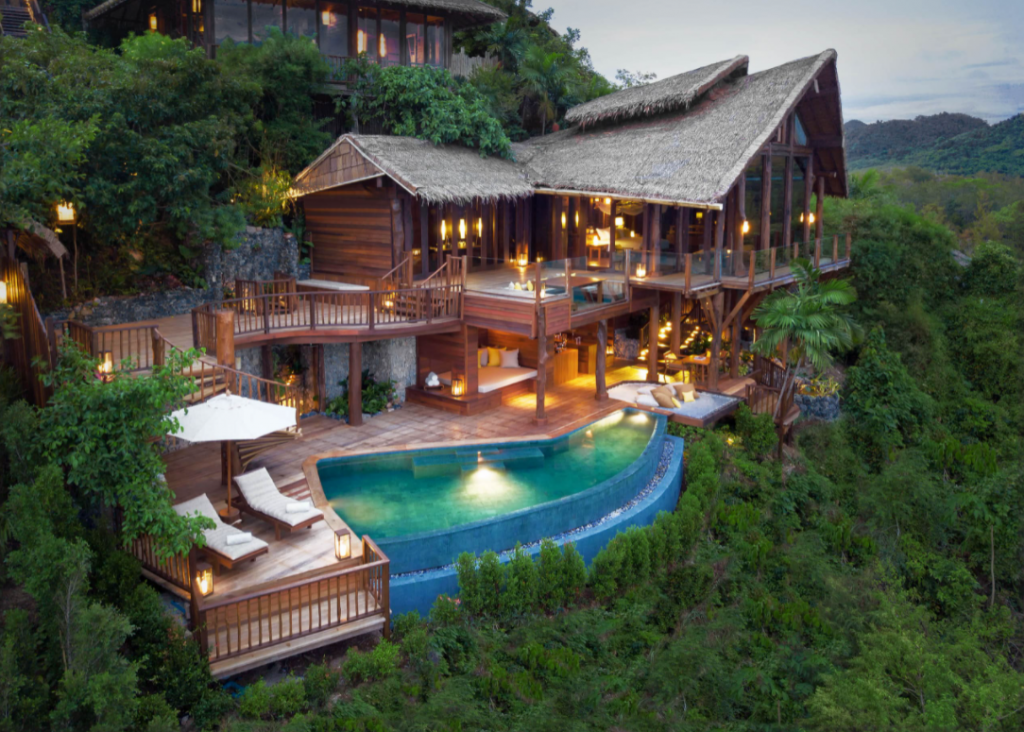
Six Senses Yao Noi is a luxurious island resort that features spacious villas with private pools , views of the ocean or the lush garden, large terraces and a personal butler. The bathrooms boast a bathtub and outdoor shower.
The hotel also offers spa services, a gym to workout and a fantastic restaurant. Cooking classes, wine tasting sessions and bonfires can also be enjoyed at the resort.
Six Senses focuses on the protection of natural surroundings, energy efficiency, waste management , and are particularly committed to the community, funding education and medical attention through their program.
Their reverse osmosis filter installations provide access to clean drinking water, and they buy all their produce from local suppliers to avoid the use of plastic packaging and support the farmers, fishermen and artisans of the area.
We like it because the resort works hard to reduce its carbon footprint and not only minimize its negative impact, but to actively promote a positive one. Even while committing to the environment’s well-being, it offers first-class facilities and memorable experiences to its guests. The butler service is a magnificent plus.
➤ CHECK RATES AND AVAILABILITY
Amari Watergate – Bangkok

Sustainable splendor can also be found in the middle of the city , as is the case of Amari Watergate . This 5-star hotel features an outdoor swimming pool, a spa and a fitness center, as well as family-friendly rooms and two restaurants.
All rooms are spacious and include an en-suite bathroom with toiletries and bathrobes, a workspace, a minibar and views of the city or garden.
Amari Watergate is associated with numerous initiatives to protect natural resources and help the communities in the area.
Their most remarkable work is toward social development, supporting education for children and young adults, giving scholarship grants annually and making donations to provide opportunities for underprivileged people . They also carry out sustainable practices and participate in movements that protect the environment.
We like it because even though it’s a hotel situated in busy Bangkok and it’s surrounded by skyscrapers, Amari Watergate actively engages in projects to protect the country’s natural habitat. Its location is close to most city’s landmarks, an ideal location to be based for your Bangkok itinerary .
The Hideout – Koh Yao Noi
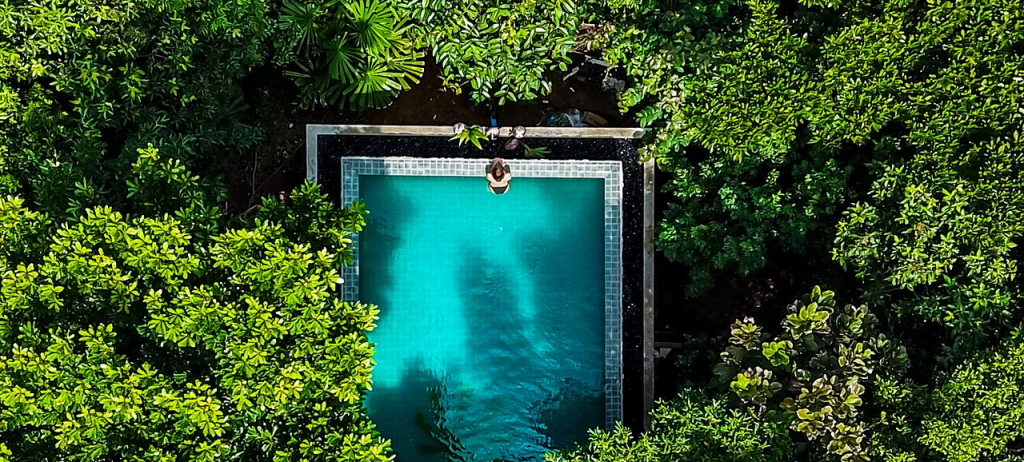
The Hideout is nestled in the hills of Kohao Yao Noi, an off the beaten path island in southern Thailand just a short boat ride away from Phuket. This place features 4 incredible treehouse suites with open-air bathrooms, king-sized beds with mosquito nets, and magnificent views of the nearby islands, the jungle and the bay.
There’s also a restaurant with a zero-waste menu, serving Thai and western delicacies, and they offer wellness packages that include yoga and fitness classes, mindfulness sessions, healing treatments, massages and personalized diet plans.
This sustainable treehouse hotel has a fresh farm-to-table practice in which more than 90% of their ingredients are harvested in organic local farms . This initiative also supports the island community and farmers, and they have a zero-waste policy .
All food and bath amenities are made from scratch, and they reuse and recycle, avoiding the use of plastic straws and disposable products. Their infinity pool is solar-filtered , and they kept all the trees in the property, building the treetop villas around them with materials from the island.
We like it because the complimentary toiletries are natural and handcrafted, the thatched-roof villas are surrounded by lush vegetation and the sounds of nature and a traditional Thai Sarong is gifted to guests upon arrival.
The Tongsai Bay – Koh Samui

The Tongsai Bay is a family-owned hotel surrounded by nature that boasts its own private bay in Koh Samui.
READ ALSO : The Ideal 4 Days in Koh Samui Itinerary
The 83 rooms feature large areas and balconies, and all of them offer views of the sea, as well as outside outdoor bathtubs.
Guests will find 2 main pools and a private beach area where the hotel offers several non-motorized water sports. There’s also a spa, a bar, and a restaurant, and activities such as yoga, cooking classes or movie night on the beach can be requested.
The hotel carries out waste management practices, such as recycling and composting, they work on energy reduction by using LED bulbs and electric vehicles to travel in the hotel compound, and they use biodegradable cleaners and natural products, avoiding the use of chemicals.
The protection of the environment and neighboring animals is also of utmost importance; an employee will actually be fired if caught harming animals.
We like it because the hotel works hard to maintain the natural environment as unaltered as possible, and it offers all the necessary services to ensure you’re satisfied and you don’t need to leave their oasis for anything other than pleasure and a few Koh Samui day trips .
137 Pillars House – Chiang Mai

Located in Chiang Mai, Thailand, 137 Pillars House was restored to reflect its 19th Century origins, and it features ample suites with a large terrace or verandah, walk-in closets and en-suite bathrooms.
You’ll find a wellness spa that offers signature massages and holistic treatments, an infinity pool where you can enjoy a cocktail and light refreshments delivered by the staff, a fully-equipped gym, and a great restaurant and bar.
This Chiang Mai’s eco lodge has eliminated single-use plastics , recycles waste paper, glass and cardboard and composts all organic waste , turning it into food for the plants and vegetation.
Most of the ingredients used in the restaurant are grown in the hotel’s vegetable and herb garden, and they use reusable woven bags instead of plastic garbage ones. What’s more, this eco hotel in Thailand hired an expert to sustainably eliminate mosquito breeding areas without using chemicals.
We like it because the architecture is incredibly beautiful, the hotel’s ambiance and surroundings make it the perfect spot for tranquility and relaxation and some of the suites include a private pool or a Victorian bathtub. It’s a great place to stay for 3 days in Chiang Mai or more.
Soneva Kiri – Koh Kood

Soneva Kiri is a splendid eco resort in Thailand that offers first-class, luxurious amenities with an eco-friendly basis .
Located in the midst of a tropical rainforest, the expansive villas blend with the natural surroundings and feature a private pool , a terrace with outdoor seating, incredible views of the beach or the jungle and spacious lounge areas. Some even include a bookshelf, a private gym or water slide, a steam room or spa facilities.
Guests get to use the complimentary bicycles, book an excursion or experience and enjoy the fantastic cuisine in their several restaurants.
Soneva Kiri is deeply committed to the environment, being 100% carbon neutral for several years now, planting trees all over Thailand to restore habitats, producing their own filtered drinking water and eliminating the use of plastics completely.
They have a management waste center that recycles up to 90% of solid waste and they charge a 2% environmental levy that goes toward the Soneva Foundation , which invests in projects with a positive social, environmental and economic impact.
We like it because their barefoot luxury concept creates a laid-back, relaxed atmosphere that ensures the guests’ complete relaxation all the while offering 5-star service and facilities. The villas’ eco-friendly design accompanies this concept, being built with natural materials and depicting a rustic aspect.
Phu Chaisai Mountain Resort & Spa – Chiang Rai
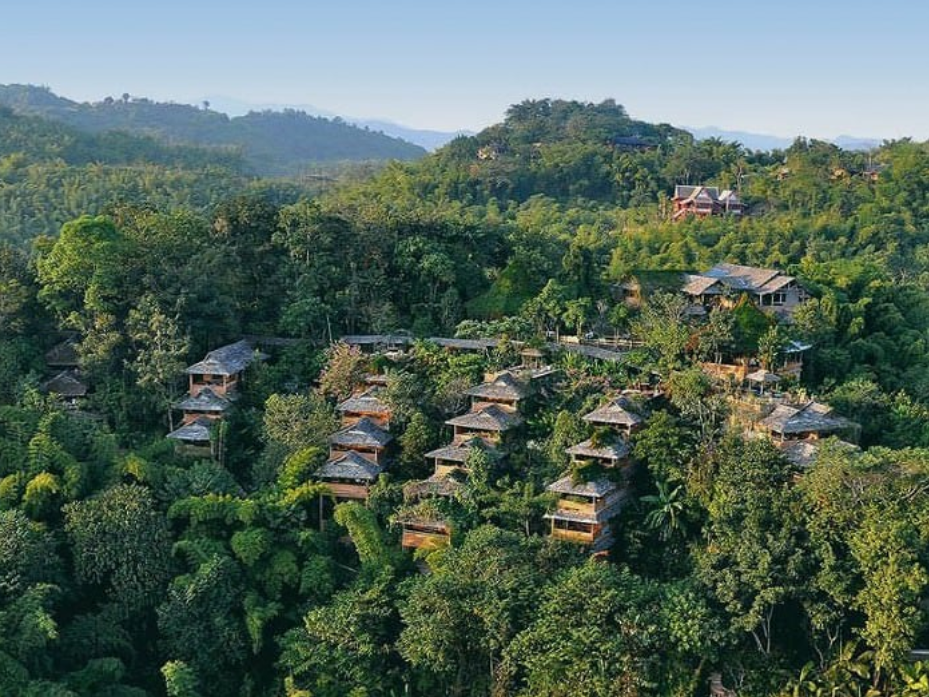
One of the best destinations for eco tourism in Thailand is Phu Chaisai , a Mountain Resort & Spa that offers suites and cottages with stunning mountain views . Every accommodation features different facilities, from outdoor bathtubs to a private terrace or pool and a second bedroom or seating area.
There’s also an infinity pool overlooking the mountain, a spa and a restaurant that serves Asian and Western dishes with locally-sourced ingredients.
This luxury eco lodge in Thailand is mainly built with renewable bamboo from the area. Their water is supplied from their own reservoirs , and they also have a tea plantation, fruit orchards and organic farms that provide fresh produce for the meals. The coffee they serve is also organically grown and roasted by a local family-owned business.
We like it because its goal is to help guests reconnect with nature, so there are no electronics in the rooms. Furthermore, the fresh air of the mountain reduces the need for air-conditioning, hence diminishing the use of electricity.
The Racha – Koh Racha Yai

The Racha is a 5-star eco beach resort that boasts spectacular villas and suites , some of which have their own private pool. All of them include coffee makers, a flat-screen TV, a minibar and an outdoor rain shower, as well as a fully-equipped bathroom with a tub.
The resort is home to a spa and a dive center, and it also offers water sports, cooking and yoga lessons and features a gym, pool table and tennis court. It’s located on an incredibly beautiful beach a short boat ride away from Phuket .
The Racha uses condensation water from air-conditioning for the footbath in every villa’s front door, c ollects and treats rainwater for use throughout the resort, and heat exchangers provide zero-energy hot water for the bathrooms. Bathroom toiletries are made with locally sourced products and contained in ceramic vessels; energy-saving bulbs are used and plastics, glass and paper are recycled.
We like it because this eco-lodge in Thailand treats the pool water with ozone, the most eco-friendly technology available, and it also supports a non-profit charity that restores the ocean’s ecosystems creating man-made reefs around the island. The staff organizes a daily beach clean-up that guests are encouraged to join.
Keemala – Phuket

Keemala , one of the very best eco-lodges in Thailand, features beautifully designed pool villas with views of the rainforest and spacious bathrooms that include a stand-alone bathtub, monsoon shower and outdoor shower, as well as double vanities.
Besides the private pool and terrace, guests can enjoy the spa, the fantastic cuisine at their two dining venues and complimentary transport to and from Kemala Beach.
Every villa at Keemala has its own water treatment system , greywater is reused to feed the gardens, they use eco-friendly synthetic materials to prevent deforestation and single-use plastic has been eliminated. There is also a waste management system, and the methane that is released from it is directed into the ground to reduce the greenhouse effect.
We like it because Keemala is close enough to the hustle and bustle of Phuket to offer its guests the action and liveliness of nightlife and various activities, but it’s also nestled far from the crowds, ideal for those looking to unplug.
The Sarojin – Khao Lak

The Sarojin is a luxury boutique eco resort in Thailand, secluded amidst nature and by 11 kilometers of white sand beach. This award-winning hotel in Khao Lak features its residences in 7 separate buildings, ensuring privacy for each guest among the tropical gardens.
All the rooms have direct access to the beach and boast luxurious yet diverse amenities; from a private Thai garden to a jacuzzi, a pool located in its own tropical garden and joined residences for families.
The resort also has a swimming pool, a spa, a fitness center and offers various experiences.
The resort runs a number of initiatives to preserve the natural environment and help the local community. They limit their energy and water consumption , work toward decreasing their carbon footprint and reducing the use of plastic and waste, looking to minimize their impact on the environment.
They also organize clean ups at the beach and national parks, support child education and carry out mangrove planting initiatives.
We like it because this unique eco-friendly resort in Thailand is committed to creating memorable experiences for couples with their exclusive romance specials, and to the general well-being of their guests, offering from their tailor-made dishes to an extensive wellness menu.
Bangkok Tree House – Bangkok
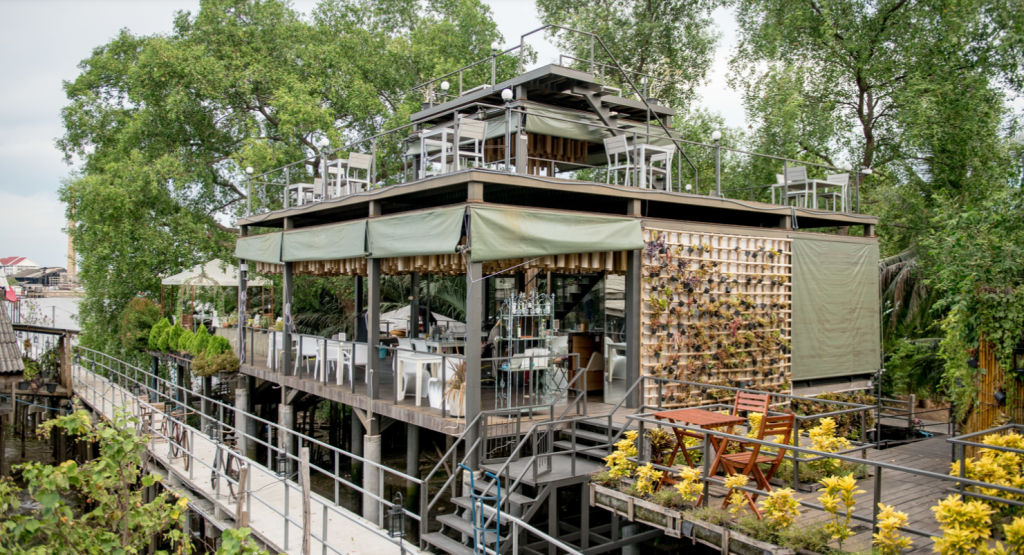
Bangkok Tree House is an eco luxury villa in Thailand that offers comfortable rooms surrounded by treetops . The three-story units feature a first floor with a fully-equipped bathroom, a bedroom and workspace on the second floor and a lounge area on the top floor to relax and admire the views.
All rooms are air-conditioned and complimentary breakfast and access to the bicycle service is included. There’s also a restaurant & cafe where guests can get all their meals.
Bangkok Tree House is smoke-free and carbon-neutral, as all its energy sources are natural and rainwater is collected for use throughout the hotel. The building materials are recycled , and they pledge to clean up 1 kg (2.2 lbs) of trash for every booking.
We like it because besides offering a distinctive accommodation, it’s secluded from the hassle of the city , facilitating the connection with nature and fresh, unpolluted air. A boat has to be taken to get there, which adds some charm to the stay, yet it’s just a short distance from all the things to do in Bangkok .
Banyan Tree Phuket – Phuket

Banyan Tree Phuket offers pool villas situated around a lagoon and surrounded by lush vegetation. A tropical garden and twin pools are the resort’s main attraction, although each villa boasts its own private pool , as well as incredibly stylish decor, an outdoor bathtub and spacious lounge areas.
There are several dining options within the hotel, and private dinners at the villa or a boat can be requested.
This 5-star eco resort in Phuket, Thailand, is committed to reducing and ultimately eliminating single-use plastics , as well as restoring the natural environment with tree-planting events at a current rate of 2,000 thousand trees a year, and raising awareness of climate change throughout the community and their guests.
The resort has also created a program to nurture and educate young people at risk of social exclusion , providing them skills and support.
We like it because they have various different priorities, from providing a 5-star service to their guests to supporting the local community and committing to the environment with clean ups and diverse projects, and they still excel at all of them, becoming one of the best eco resorts in Thailand .
Faasai Resort & Spa – Chanthaburi

Faasai Resort & Spa is home to a fantastic spa that offers massages in the open-air pavilion and traditional Thai healing treatments . The small number of rooms, despite their extensive grounds, allows them to be spacious and ensure privacy for their guests; they all feature cable TV, coffee & tea making facilities and a terrace or balcony. Some of the villas also have a spa-style bath or steam room.
Faasai Resort & Spa is one of the best eco resorts in the country; they cultivate their own herbs and spices and conserve their resources as much as possible, using greywater tanks, heating water with solar power and using energy-efficient lights.
When the resort was built the existing trees on the site were left standing, and it serves as shelter for many birds and wildlife.
We like it because they strive to become more and more sustainable and able to be independent of outside resources , and they also support the local temples and traditions, encouraging visitors to participate in local festivities.
Anantara Mai Khao – Phuket

Anantara Mai Khao is one of the best eco-friendly hotels in Thailand, featuring amazing villas and pavilions, all of them able to accommodate families. Each villa has its own outdoor pool , luxurious amenities and outdoor showers.
The hotel also features a wellness center & spa with steam rooms, a tennis court and a gym, as well as several restaurants, one of them in a treehouse. Breakfast is included with the stay.
Anantara resorts aim to preserve not only the environment but their host communities as well, matching guest donations to diverse organizations that protect human rights, child welfare and wildlife.
As to sustainability, the hotel has minimum water consumption and works toward reducing energy consumption by 10% every year . They also reuse and recycle solid waste and work with local communities to promote the well-being of the environment and offer opportunities to performers and artisans within the hotel.
We like it because the hotel places a great focus on the local communities, and has been awarded the Green Growth 2050 certification , being recognized for their sustainability and tourism ethics but also for their employee protection and community development.
The Pavilions Anana – Krabi

The Pavilions Anana is an eco resort in Krabi, Thailand, that offers an ecological experience in incredibly beautiful rooms and astounding surroundings, as it’s located among limestone cliffs.
The hotel features a volcanic mineral water pool , sourced from the area’s volcanic mountains as it provides unique minerals for the skin, and there’s also a spa that offers Thai massages, facials, body scrubs and a Himalayan therapy of salt breathing.
Guests will also find yoga lessons and a fully-equipped gym, as well as farm-to-table local cuisine served in their several eateries.
The Pavilions Anana is a Green Globe certified resort that manages energy and waste and has completely eliminated single-use plastic . Their carbon reduction and elimination strategy enables them to have electric and carbon-neutral vehicles and boats that guests can use to explore the coast, and they use high-efficiency light bulbs and water-saving aerators.
We like it because the restaurants’ produce comes directly from their organic farm, and the bathroom toiletries they offer are organic.
Moken Eco Village – Koh Phrathong

Moken Eco Village is located in Koh Phra Thong, a beautiful and unique island off the beaten path. It features 11 bungalows, each of them inspired by the history of the island. Among the facilities offered is a desk area, fully-equipped bathrooms with amenities, mosquito nets and daily breakfast.
This eco-friendly hotel has an on-site restaurant that serves a wide variety of Thai and western dishes, and there’s wifi access in the lobby and common areas.
The bungalows are made from local natural materials and the resort’s electricity is generated by solar panels . Since there are no electrical sockets for this reason, devices can be charged from USB ports in the bungalows. Moken Eco Village also has a policy to reduce carbon dioxide emissions and reduce its negative impact on the environment.
We like it because besides protecting the environment, the resort’s rooms are designed to highlight the island’s natural wonders and wildlife, celebrating their homeland and facilitating its history and heritage to their guests.
Pimalai Resort & Spa – Koh Lanta

When it comes to sustainable tourism in Thailand, Pimalai Resort & Spa is one of the top choices. It features several villas and suites in 100 acres of tropical forest , therefore all rooms have views of either the gardens or the 900-meter beachfront and the Andaman sea.
The hotel’s spa offers a combination of traditional and modern techniques, from massages to facials and body scrubs, and there’s also a panoramic, award-winning restaurant and several activities offered.
Pimalai has a waste management system and, once a month, it invites children from the local school to participate in their weekly garbage pickup. There are no single-use plastic items at the resort and they sell reusable bags, all proceeds going to the local school. They also use a waterway to collect water from the mountains and reservoirs to store rainwater.
We like it because the resort was built around its environment , keeping as many trees as possible, and it cares deeply not only about the natural surroundings but also its community, supporting a science program for children and encouraging them to study.
Stefania Guglielmi is the founder of Every Steph. Originally from Bologna, Italy, she's been traveling full-time since 2016 and has visited over 50 countries across 6 continents. She believes sustainable travel and luxury travel can go hand in hand and has been advocating for responsible tourism since 2014. Stefania's advice and travel experiences have been featured in important publications such as Business Insider, Refinery29, and Yahoo Money.
Sign me up for the monthly newsletter!
- Meet the Team
- Work with Us
- Czech Republic
- Netherlands
- Switzerland
- Scandinavia
- Philippines
- South Korea
- New Zealand
- South Africa
- Budget Travel
- Work & Travel
- The Broke Backpacker Manifesto
- Travel Resources
- How to Travel on $10/day
Home » Southeast Asia » Thailand » 15 STUNNING Eco-Resorts in Thailand [2024 Edition]
15 STUNNING Eco-Resorts in Thailand [2024 Edition]
Thailand is a top travel destination for many reasons. The country offers a rich and colourful culture with fascinating traditions and spirituality.
From the mountainous North to the beach resort towns of the south, and of course its tropical islands offshore, Thailand is also blessed with an abundance of magnificent natural beauty.
Thailand offers accommodation for all levels of comfort and styles. Whether you’re a budget backpacker staying in hostels or a luxury-loving holidaymaker looking for a five-star villa, or perhaps you want to stay somewhere more unique like a rustic beach bungalow. Well, you can find all that in Thailand.
But there’s more. For those aiming to travel more sustainably, you can also find some of the best eco-resorts in Thailand, which have a lower impact on the environment than traditional hotels and villas.
We could all do with traveling a little more sustainably sometimes, which is why we have put together this guide on the best eco-resorts in Thailand.
All the resorts on our list will offer a comfortable stay while striving to minimize their impact on the environment while uplifting and supporting local communities as much as possible.
In a Hurry? Here’s Where to Stay in Thailand for One Night
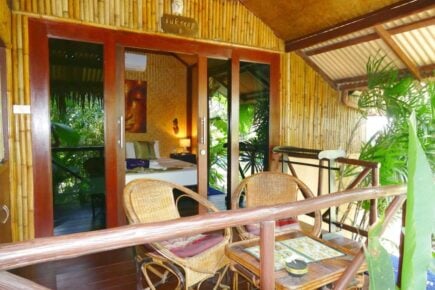
Thai Tropical Bungalow
Located in a quiet coconut grove on the tropical island of Koh Samui, the Thai Tropical Bungalow offers a genuine Thai experience in traditional bungalows with authentic cuisine. Just minutes from the beach, this is the perfect place to relax.
- ARKbar beach resort
- Wat Plai Laem
Is this amazing Thailand Eco-resort booked for your dates? We’ve got your back with our other favorite properties below!

Unlock Our GREATEST Travel Secrets!
Sign up for our newsletter and get the best travel tips delivered right to your inbox.
Why Stay in an Eco-resort in Thailand
The top 15 eco-resorts in thailand, final thoughts on thailand’s eco-resorts.
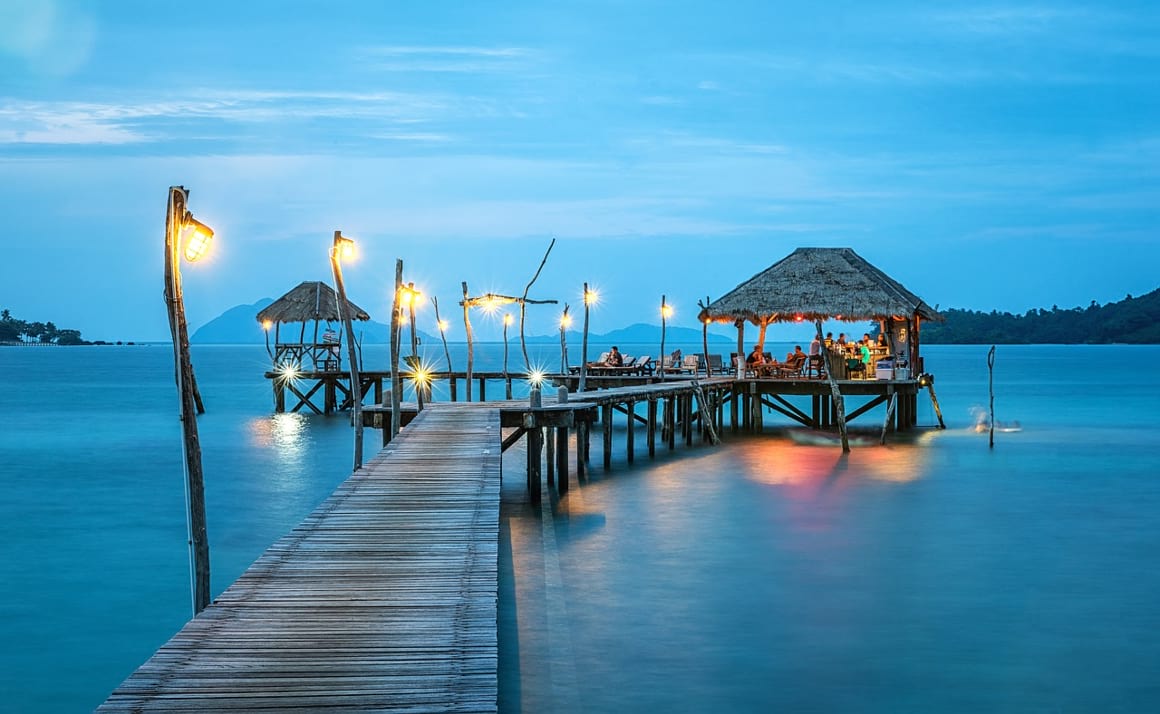
Choosing an eco-resort in Thailand will offer you the unique chance to get close to nature, as well as even conserving it, while still enjoying a memorable and comfortable holiday. Not only will you have your pick of some of the most unique accommodation in Thailand, but you’ll also play a role in supporting an environmentally friendly stay.
Whether you choose a stay close to the cities or deep in the lush jungles, or along the coast, you can rest safe in the knowledge that your chosen accommodation that shares your concern for the impact we have on the planet.
What is an Eco-resort?
The term eco-resort is used to refer to an accommodation option , usually unique and close to nature, that is committed to reducing the impact of its operations on the environment. This can be achieved in a number of ways, but most commonly, it includes using renewable or green energy, water-saving initiatives, and natural building materials.
Supporting local communities is also part of being an eco-resort, and many are committed to supporting local businesses and promoting local artisans as much as possible. Sharing fascinating insights into local culture and history with guests forms part of this as well.
- > Traditional bamboo bungalow
- > Tucked in a tropical jungle setting
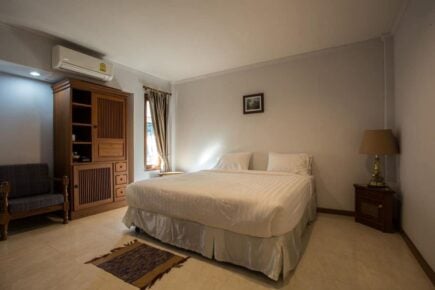
The Cottage Resort, Nakhon Sawan
- > Saline swimming pool
- > Intimate and personal stay
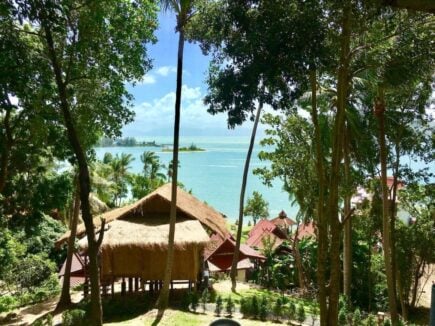
Kalulushi Eco Lodge
- > Heat-insulated bamboo bungalows
- > Beautiful wild beaches
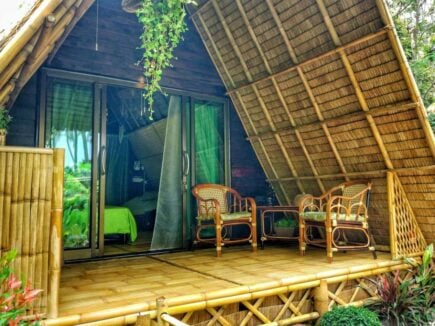
Eco Bungalows
- > Bali-style all-natural bungalow
- > Tropical garden with sea views
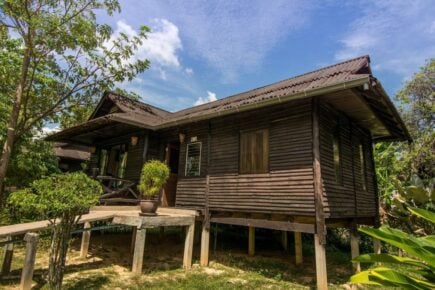
- > Recycling programme and beach clean-ups
- > Quiet secluded gardens
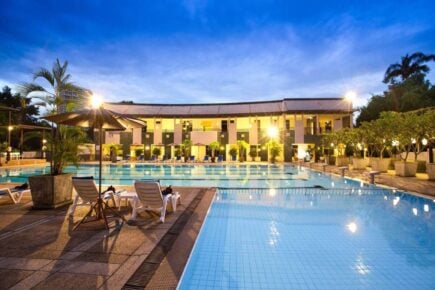
Eco Resort Chiang Mai
- > Historic refurbished house
- > Tranquil location outside of town
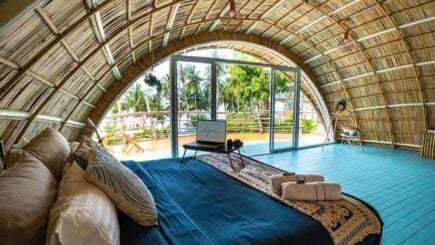
Jaiyen Eco Resort
- > 16 Guests
- > Plant-based menu
- > Unique bamboo cocoons
Looking for other types of accommodation? Check out our guide to Where to Stay in Thailand !
Finding the best eco-resort in Thailand doesn’t have to be expensive . In this guide, you’ll find a list of unique accommodations in Thailand for your budget and needs, as well as get you closer to nature.
Overall Best Value Eco-resort in Thailand – Thai Tropical Bungalow
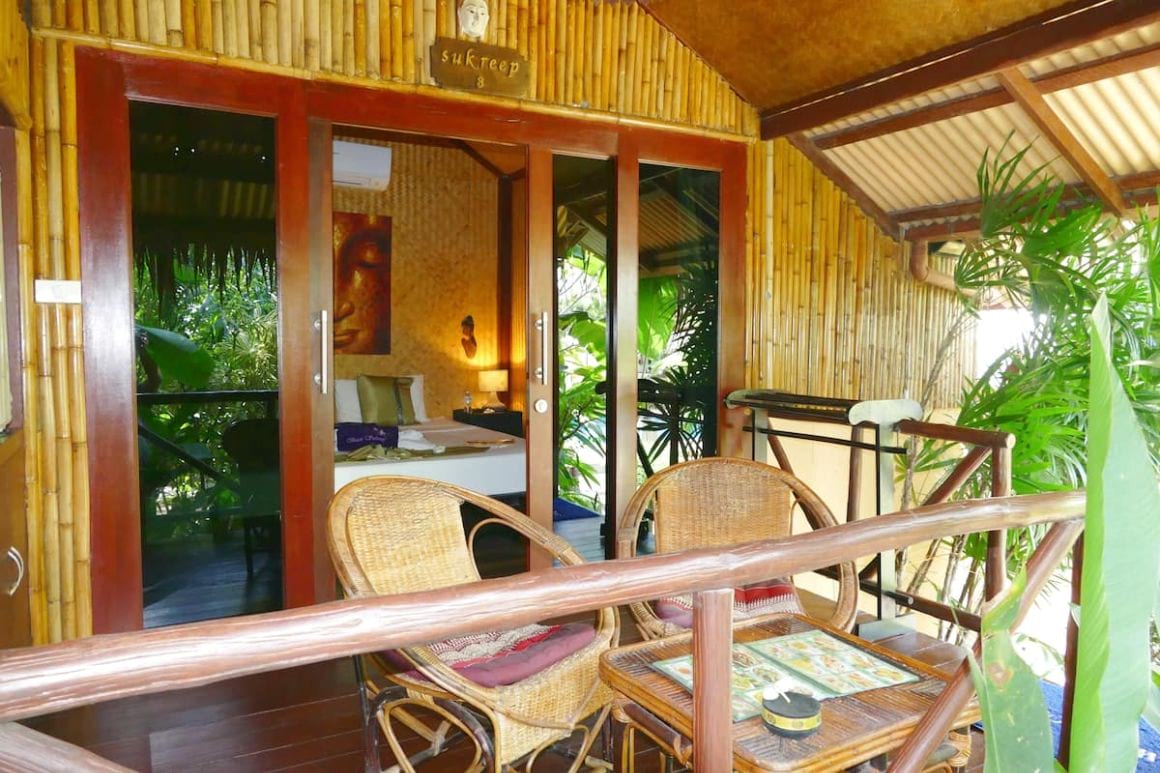
- Traditional bamboo bungalow
- Tucked in a tropical jungle setting
In a quiet coconut grove on the east coast of Koh Samui, Thai Tropical Bungalow is an authentic island retreat. The resort is close to some of the island’s best beaches and top attractions.
Set in a lush tropical setting with a traditional design made from bamboo, you can enjoy an authentically immersive experience of the island while enjoying some authentic Thai food at nearby restaurants.
From the resort, guests can relax on the idyllic beaches, kick back on their private terrace, or hire a motorbike and head out to explore all that this popular island has to offer, from restaurants, shopping, nightclubs, and ornate temples.
Best Budget Eco-resort in Thailand – The Cottage Resort, Nakhon Sawan
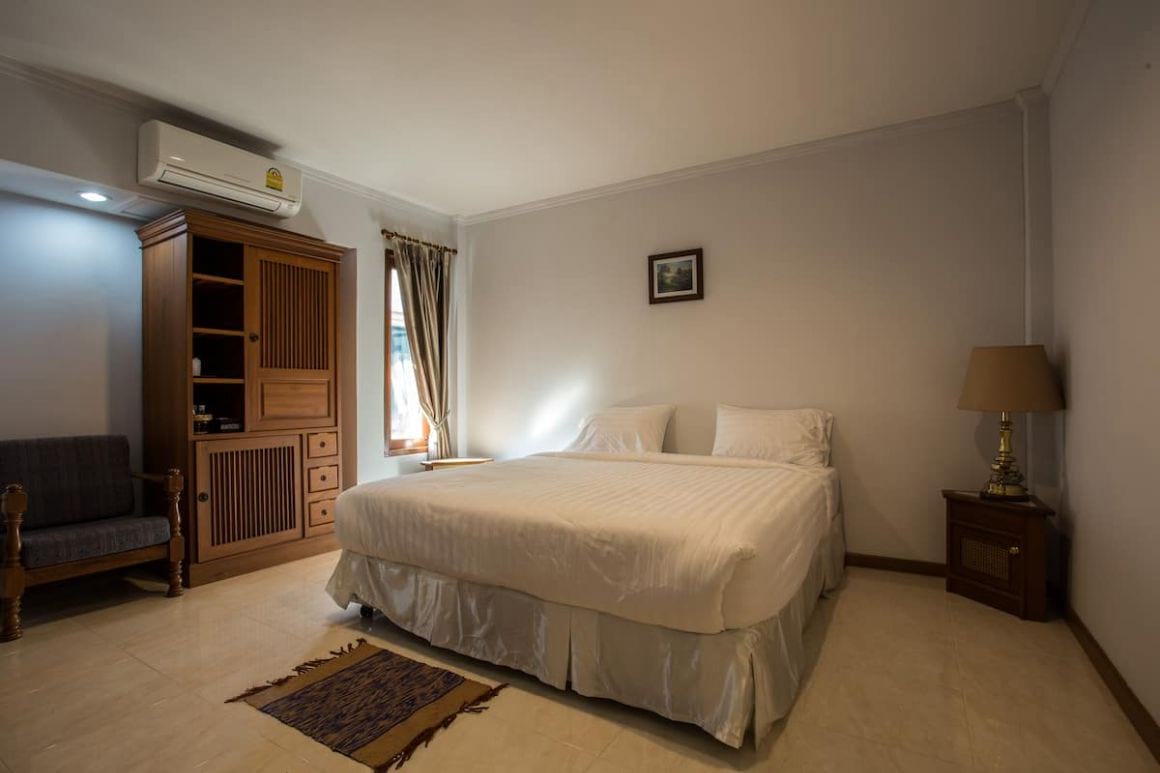
- Saline swimming pool
- Intimate and personal stay
The Cottage Resort is an intimate eco-resort in a peaceful setting in Nakhon Sawan, the ‘Heavenly City’. Surrounded by rice fields and lush greenery, the resort is run by a husband-and-wife, who offer their guests a personalized stay.
The cottages are surrounded by lush greenery and are powered entirely by solar energy. The swimming pool at the resort is saline, so it doesn’t contain any harsh chemicals.
When not basking in the sun beside the swimming pool, guests can visit the nearby market for some shopping or drive into the city to explore the vibrant streets.
Budget Tip: Dorms in Thailand start from $10USD per bed. They’re the cheapest accommodation in the city. Search for hostels in the area !
Best Eco-resort for Couples – Kalulushi Eco Lodge
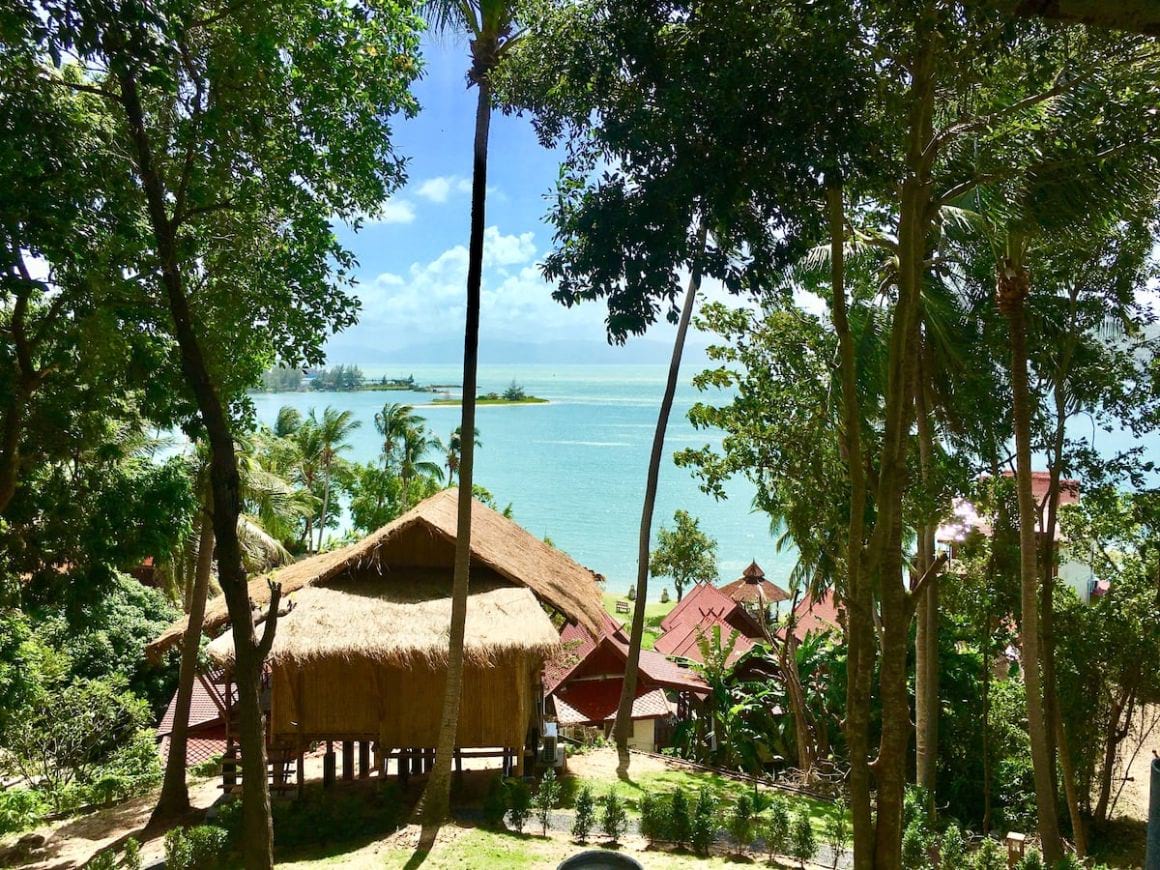
- Heat-insulated bamboo bungalows
- Beautiful wild beaches
Located just north of Thong Sala in Koh Phangan, Kalulushi Eco Lodge lies on a hillside overlooking the ocean, with direct access to the beach. The town center, with its night market and local attractions, is within walking distance.
The bamboo bungalows are sound and heat insulated, so there’s little need to use the air conditioning. The resort is essentially a working farm, where they grow their own vegetables using hydroponics and soil, making this one of the best eco-resorts in Thailand.
Beautiful beaches are within easy reach of the resort just down the hillside – it isn’t too steep but moderate fitness is required. You can also rent a scooter or a car to explore the rest of the island’s sights.
Most Ecological Eco-resort in Thailand – Eco Bungalows
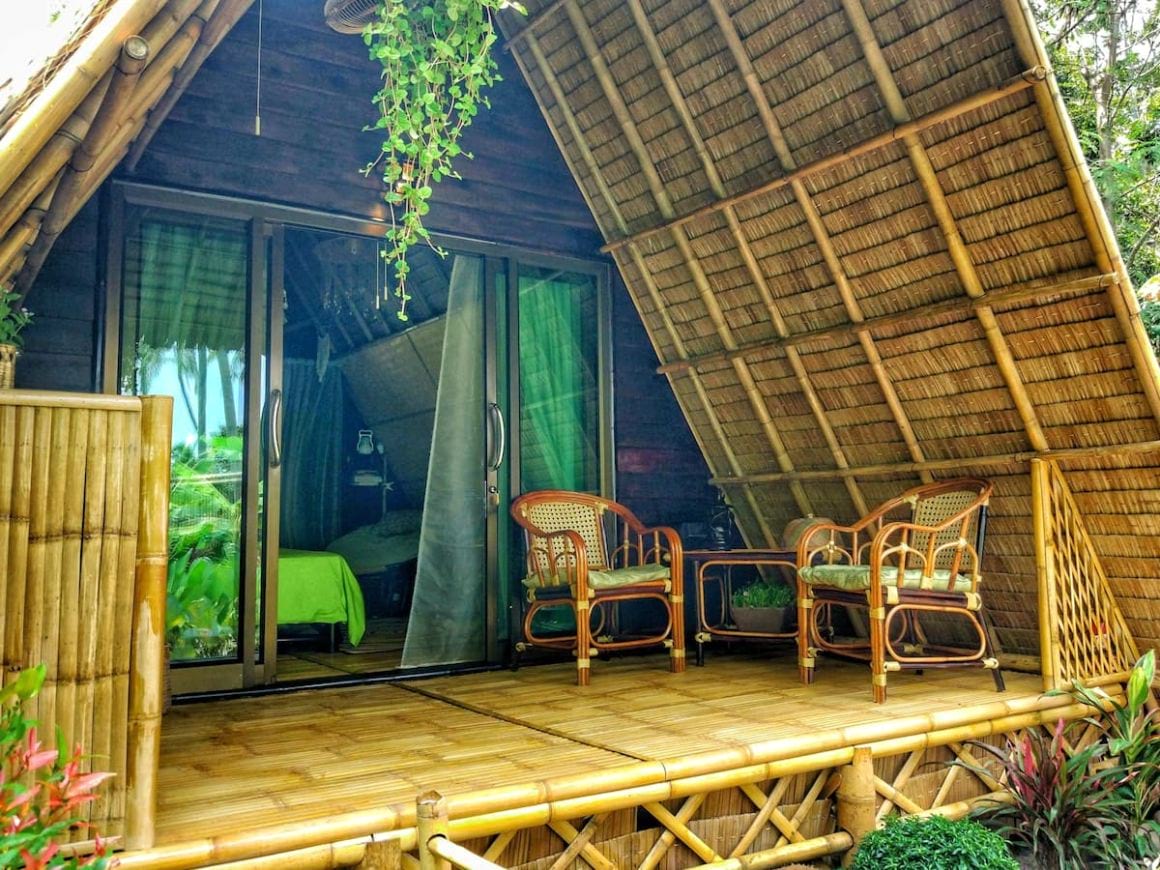
- All-natural bungalow
- Tropical garden with sea views
Located 5-minutes from Seeatanu village on Koh Phangan, these Eco Bungalows are hidden in a tropical garden of banana and coconut trees. The resort is a five-minute walk from the public beach, as well as various traditional restaurants, and yoga centers.
The A-frame Bali-inspired bungalows are made almost entirely from bamboo and are as close to nature as you can get. The orientation of the bungalow is purposeful to maximize the cooling sea breezes.
In addition to casual yoga sessions and spending days on the beach, you can explore the night food market, or stop in for a drink at one of the many bars.
Most-Unique Eco-resort in Thailand – Eco-flying Little House
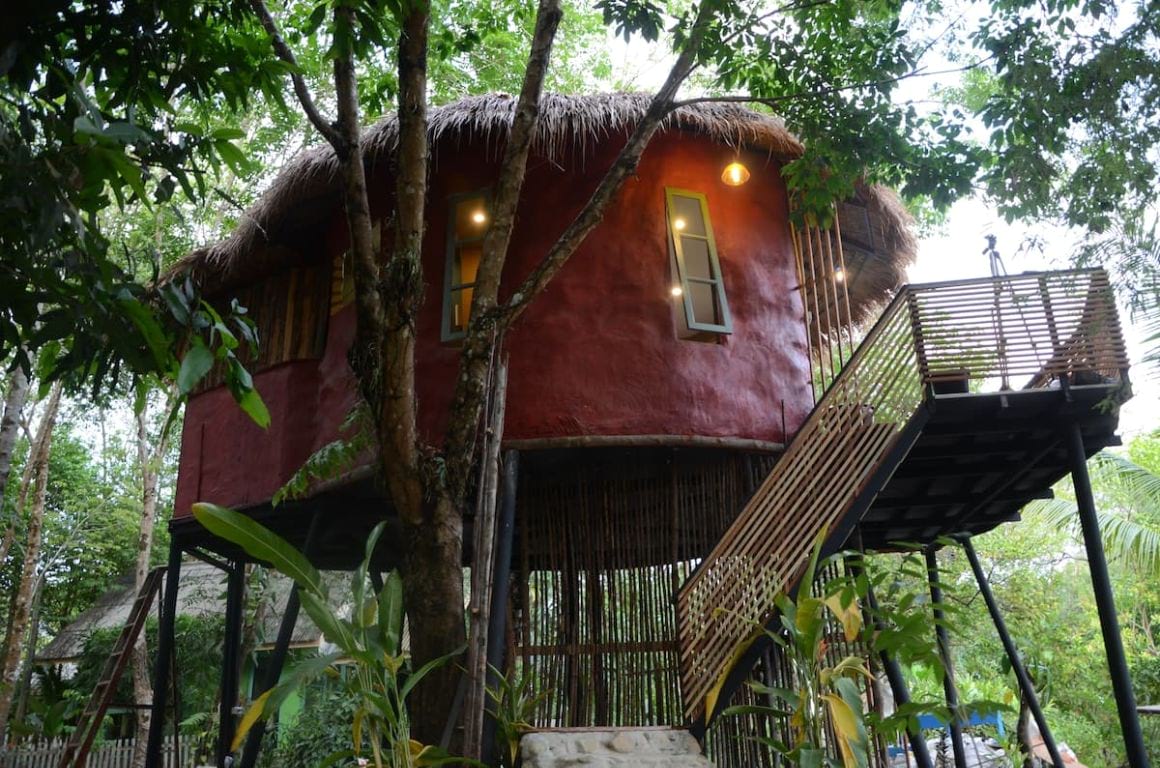
- Permaculture garden
- Unique artist-designed treehouse
Located 200m from the beach, overlooking a small pond, lagoon, and permaculture garden, the “flying” Little Eco-House is a unique construction five meters above the ground. Designed and built by a local artist, the house is a quirky and cozy retreat.
The house is constructed from reeds, elephant dung, and some metal for strength, so it’s almost all-natural. Guests can help out in the permaculture garden or learn how to make their own soap, shampoo, and insect repellant from natural materials.
From the property, you can enjoy idyllic beach days or take part in one of the many island activities including snorkeling, scuba diving, fishing, and boating. There are plenty of restaurants and bars nearby for a night out.
Best Eco-resort for Families in Visiting Thailand – Mook Lanta
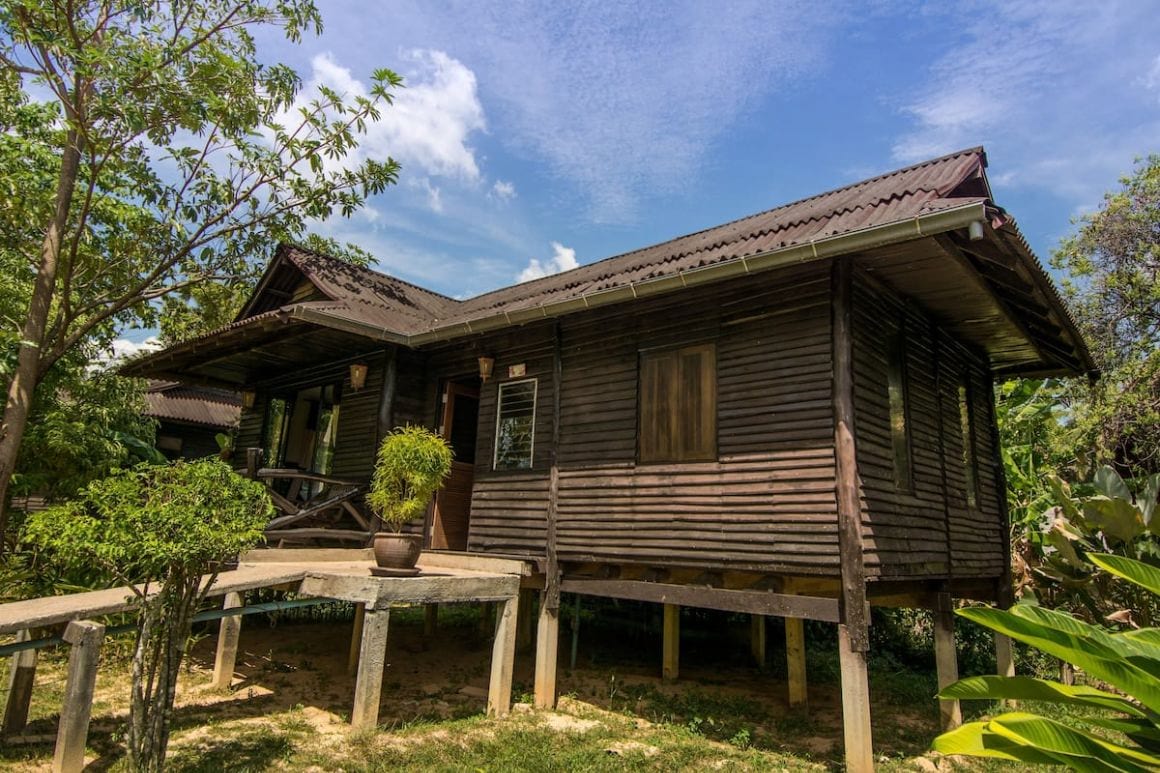
- Recycling programme and beach clean-ups
- Quiet secluded gardens
Mook Lanta is a traditional eco-resort located a short distance from the beach within a tropical garden. Plenty of beaches, bars, restaurants, and shops are conveniently located within easy reach of this unique accommodation in Thailand.
The traditional Thai-style wooden bungalows are raised on stilts above tropical gardens. Guests are encouraged to conserve electricity and water and keep their plastic usage to a minimum throughout their stay. The resort has regular beach clean-ups that guests can participate in.
The resort supports the Lanta Animal Welfare and guests are encouraged to visit and see the good work being done here. From the resort, you can set out on an island tour, go snorkeling, or try a Thai cooking class.
Best Eco-resort for Backpackers – Eco Resort Chiang Mai
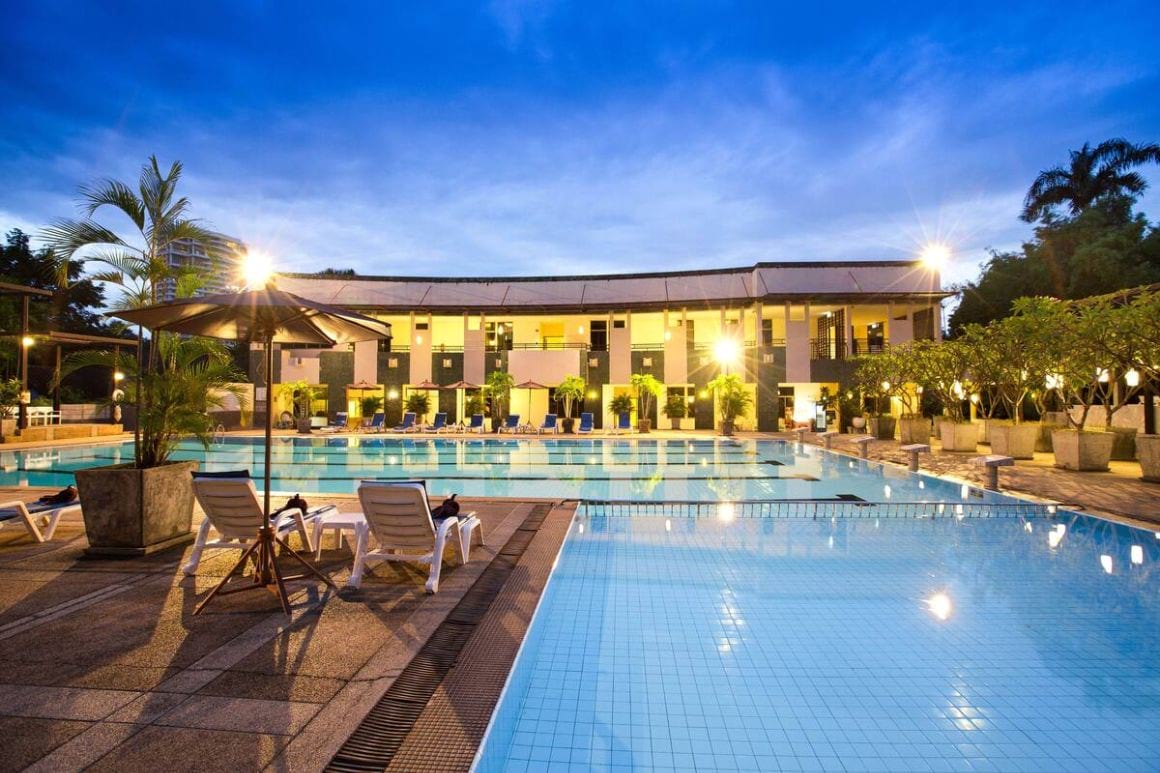
- Historic refurbished house
- Tranquil location outside of town
Dating back to 1935, Eco Resort Chiang Mai was originally a farm and later a kindergarten. The main building retains its original splendour, surrounded by an impressive variety of lush trees and gardens.
The resort has been lovingly upgraded over the years, preserving historic elements and reusing materials where possible. Guests can also enjoy breakfast made from locally sourced produce.
From the resort, you can rent a bicycle to head into town and explore Chiang Mai, or choose to relax beside the large swimming pool that was once used to train the Thai national swimming teams. You can also choose a book from the library or take a traditional cooking class. For those backpacking Chiang Mai , this is the ideal place to stay.
Amazing Luxury Eco-resort in Thailand – Jaiyen Eco Resort
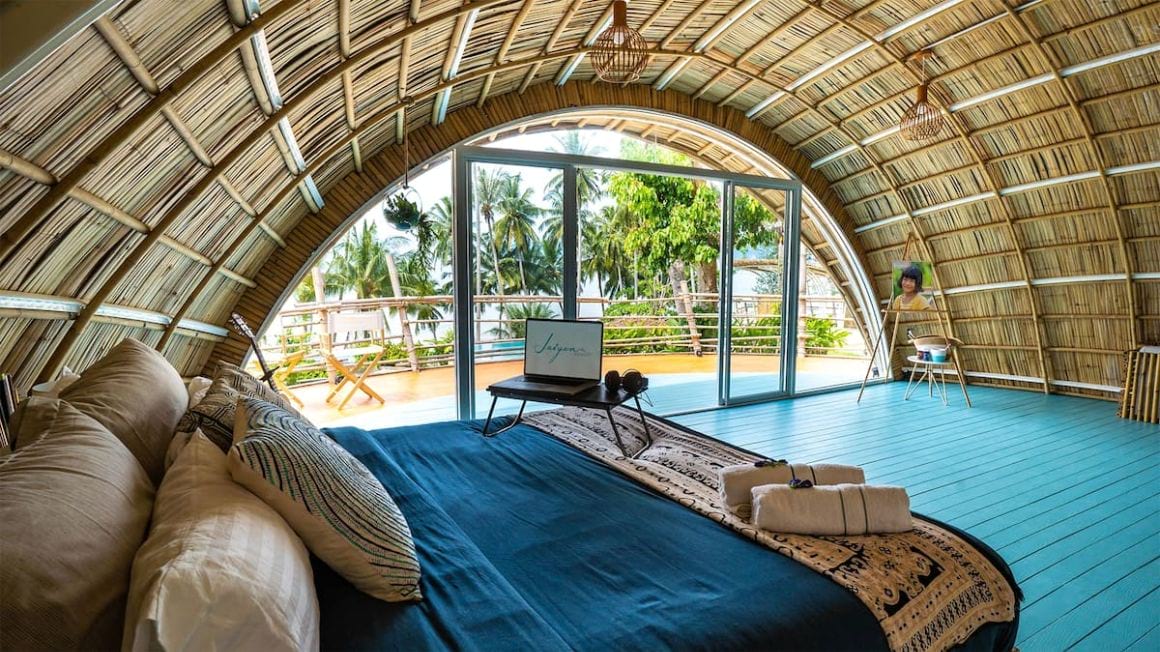
- Plant-based menu
- Unique bamboo cocoons
Situated on the North-Western side of Phang Nga, facing the picturesque Limestone Karsks of Phang Nga Bay. The island is blessed with fantastic natural beauty, from quaint fishing villages to amazing national parks . The world-renowned Big Tree, coconut plantations and rice paddies are also great features.
The resort can be used exclusively for groups seeking a tranquil space for reflection and reconnection. It also functions like a co-living/co-working space and every guest forms part of the greater ecosystem.
From here, you can head to the other side of the island for a variety of bars and restaurants, as well as Muay Thai camps, and even visit a local women’s community that sells and teaches local handicrafts.
Best Eco-resort for a Weekend in Thailand – Chiang Rai Private Bungalow
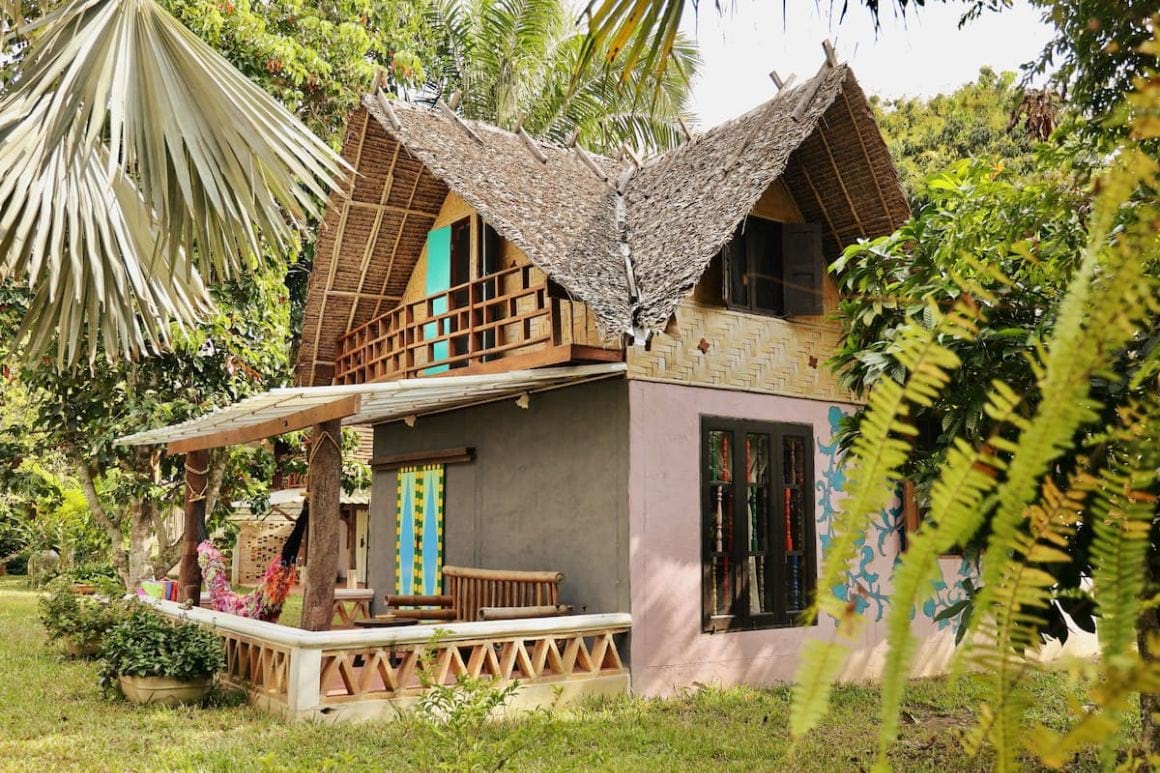
- Traditional local architecture
- Authenticity and simplicity
Chiang Rai Private Bungalow is one of the best eco-resorts in Thailand, situated in the quieter region of Chiang Rai in Northern Thailand, away from the more touristy areas. The resort is located on a hill, adjacent to a small lake in a lush tropical garden.
The bungalows are inspired by traditional local architecture for a truly authentic experience. All meals and products are organic and homemade.
From the resort, you can relax beside the large swimming pool, take a casual stroll through the garden, or head to the small lake nearby with some restaurants and coffee shops. You can also explore the nearby hot springs or visit the inspiring BaanDam museum.
Great Eco-resort for a Short-Stays in Thailand – Aonang Eco Villas
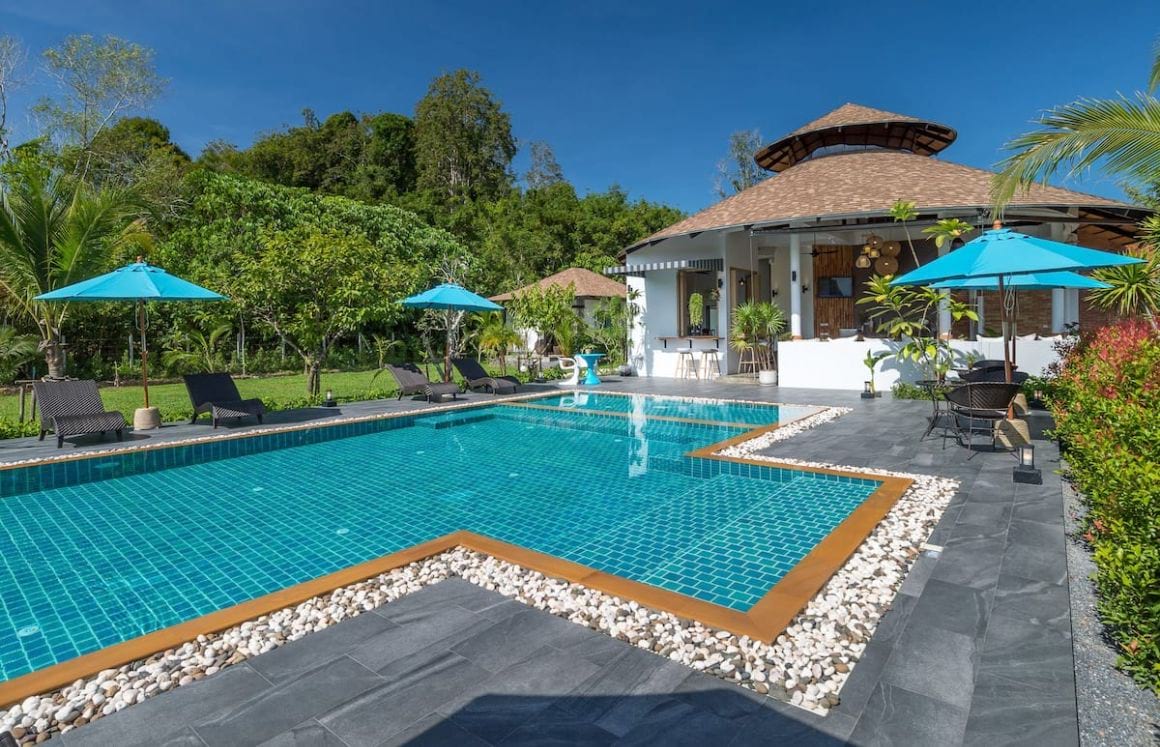
- On-site organic fruit farm
- Lush resort gardens and pool
Aonang Eco Villas are located just 10-minutes from one of the most popular beaches in Krabi, in a green area alongside a small canal. Surrounded by resort gardens, the villas offer a serene setting to return to after a day of exploring.
An organic fruit farm on-site provides plenty of fresh produce for guests to enjoy, as well as an opportunity to learn more about farming methods. The swimming pool at the resort is free of chlorine and is instead purified instead with salt.
There are numerous tours to embark on that take you around the surrounding sights, including tours of the city and jungle and even nearby Phi Phi Island and Hong Island. Activities on offer here range from snorkeling and diving to kayaking and rock climbing.
Eco-resort with an Epic Location – River Kwai Jungle Rafts Resort
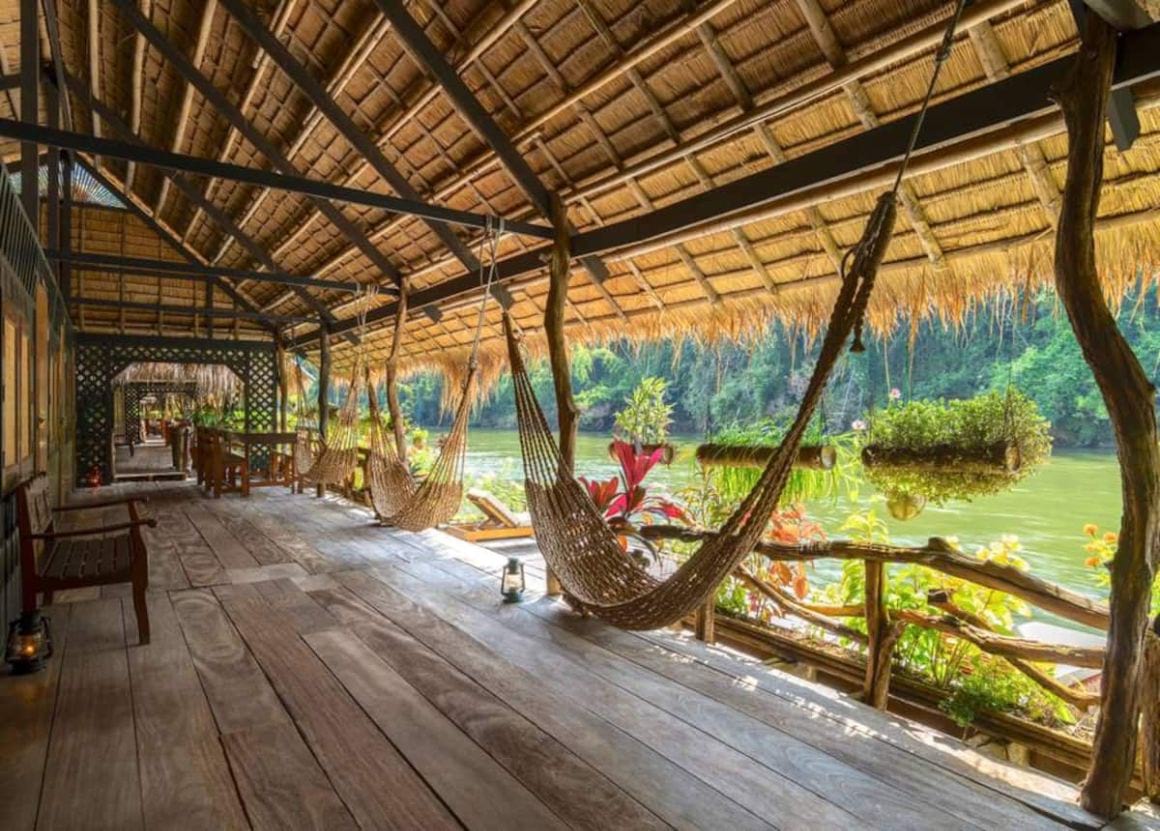
- Electricity-free stay
- Floating bamboo lodge
River Kwai Jungle Rafts is a floating hotel – a floatel – on the historic River Kwai Noi. The resort is moored in an idyllic setting of lush mountains and thick jungles.
The bamboo floatel is well decorated using furniture designed and made by local villagers. There’s no electricity, but rather lighting is provided by romantic kerosene lamps. Guests can visit a traditional Mon village, and experience the traditional Mon dance theatre.
Days here can be spent relaxing and sunbathing, swimming, and boating on the river in this idyllic setting or enjoying an indulgent massage. You can also head out to nearby temples and truly explore the local culture.
Best Off-The Beaten Path Eco-resort – Faasai Resort Agarwood Villa
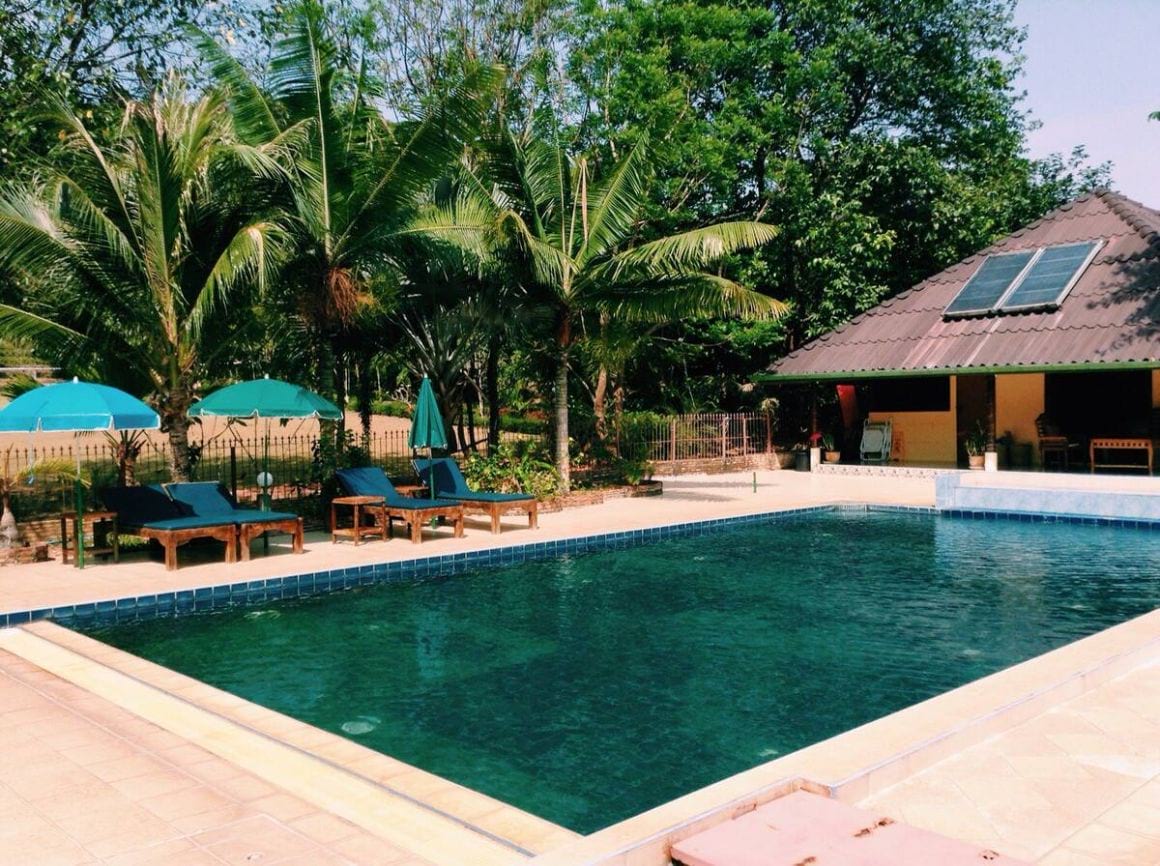
- White Water Lake Nature Sanctuary
- Traditional cultural immersion
Faasai Resort Agarwood Villa is a classical villa made with locally made bricks. Tucked in an idyllic hillside in the South Eastern region of Tambon Sanamchai, where the forest meets the sea, this unique accommodation in Thailand is a tranquil paradise just 10 minutes from the beach.
As part of the resort’s commitment to the environment, they’ve developed the White Water Lake Nature Sanctuary which protects freshwater springs, wetlands, and an area of local flora and fauna.
Visit this sanctuary to see the birdlife, go boating, and even learn about local farming techniques. You can also visit the local markets, take a Thai cooking class or head out on a bicycle to explore the surrounding area.
Best Eco-resort for Views – Poseidon Bungalows
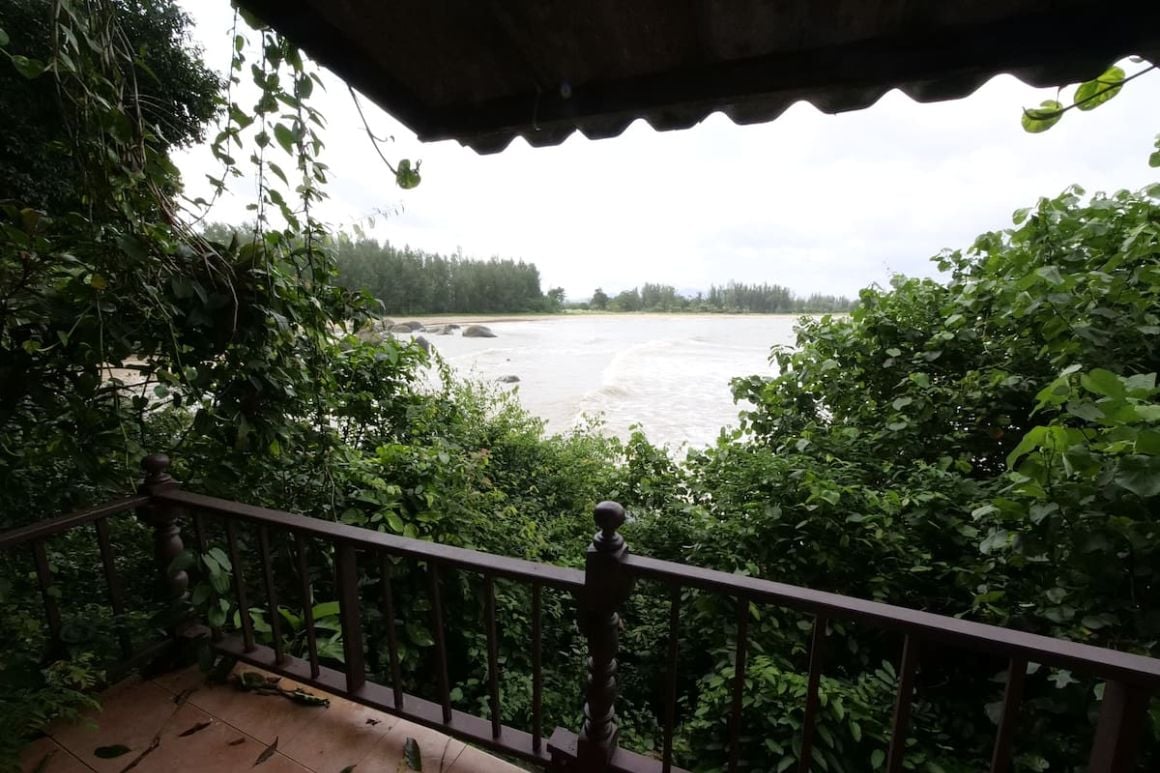
- Family-run eco-resort in a rare rainforest
- In a picturesque, sheltered cove
Poseidon Bungalows are located within a small, family-run eco-resort in a sheltered cove by the river mouth. This stunning nature retreat offers seclusion and incredible nature and biodiversity.
The rustic wooden beach hut is hidden in a lush forest setting and overlooks the private beach. Whether you choose to appreciate the setting from your balcony or head out into nature to fully appreciate the area’s rich biodiversity.
From the resort, you can go birdwatching, diving, and snorkeling, or go hiking in the park and swimming at a nearby waterfall. If you’re keen to head out on a longer day trip to Phang-Nha, hire a scooter and head off along the coastline.
Best Eco-resort for Long Term Travellers – Fern Resort
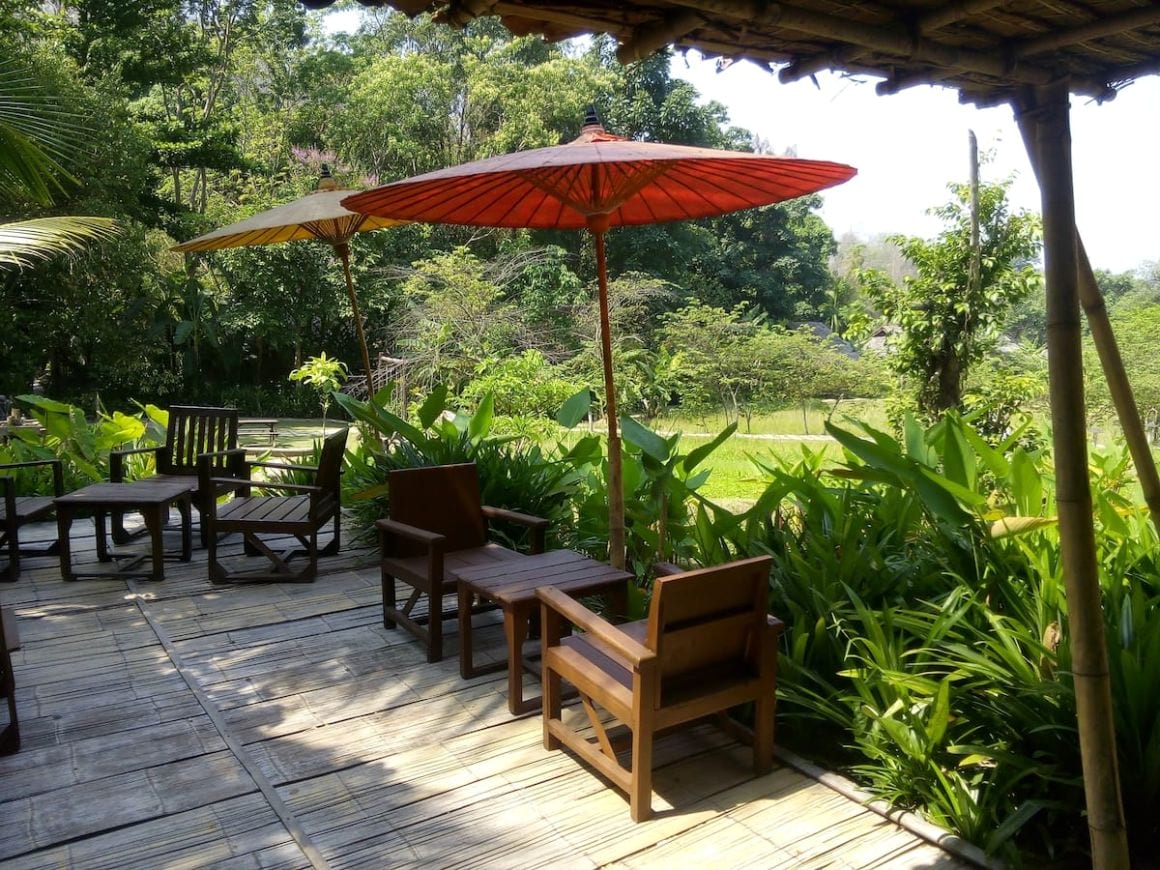
- All employees from the local village
- Peaceful jungle setting
Tucked in a lush valley in Northern Thailand outside the town of Mae Hong Son, Fern Resort offers a peaceful hideaway in the jungle. Surrounded by idyllic rice fields and running rivers, this is a beautiful setting to relax and unwind.
The resort is committed to supporting and partnering with surrounding local communities, providing employment to locals, partnering with other local businesses, and purchasing goods and ingredients from the local market.
Explore the pristine natural surroundings on walks along the nature trails, bird watching, biking, and participating in local agriculture in the rice fields. After a fun day exploring, return to the resort for a swim in the pool or a traditional meal in the restaurant.
Most Beautiful Eco-resort in Thailand – Our Jungle Resort
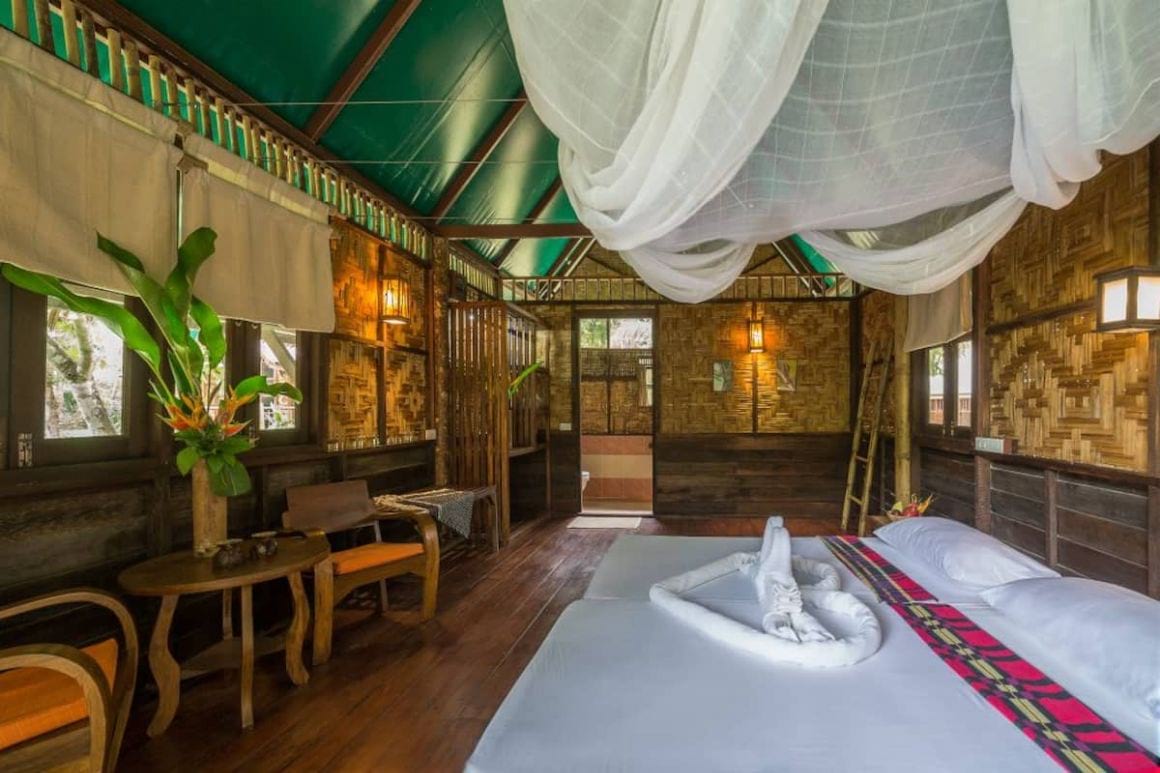
- Built from bamboo and renewable materials
- Overlooking the price fields and mountains
Located in an area of carefully preserved natural beauty, Our Jungle Resort is located in Khao Sok – an oasis for those seeking an authentic experience close to nature.
The resort is committed to sustainability by using bamboo and renewable materials in the construction of the resort as well as minimizing electricity, water and plastic usage. The resort also runs an educational organic farm. Your stay here assists in subsidizing an on-site nature camp for Thai children.
Activities at the resort include hiking excursions into the national park, cooking classes, boating on the lake, jungle yoga, birdwatching, and camping, among many others.
Don’t Forget Your Thailand Travel Insurance
ALWAYS sort out your backpacker insurance before your trip. There’s plenty to choose from in that department, but a good place to start is Safety Wing .
They offer month-to-month payments, no lock-in contracts, and require absolutely no itineraries: that’s the exact kind of insurance long-term travellers and digital nomads need.

SafetyWing is cheap, easy, and admin-free: just sign up lickety-split so you can get back to it!
Click the button below to learn more about SafetyWing’s setup or read our insider review for the full tasty scoop.
Thailand’s rich cultural heritage, deep spirituality, and incredible natural beauty make it the kind of destination that people return to time and again to explore more. From traditional Thai cuisine, bustling markets, and idyllic tropical beaches to lush jungles and mountains, Thailand is a varied destination with many places to visit .
And for those looking to travel sustainably, there are plenty of options for you among the best eco-resorts in Thailand. Whatever your budget or travel style, there is an eco-friendly resort for you.
- Check out our backpacking Thailand guide for in-depth info for your trip.
- Experience serenity in one of these Thai yoga retreats .
- And bring your travel camera to capture the breathtaking views Thailand has to offer!
- Let’s get you ready for your next destination with our Southeast Asia backpacking guide .

And for transparency’s sake, please know that some of the links in our content are affiliate links . That means that if you book your accommodation, buy your gear, or sort your insurance through our link, we earn a small commission (at no extra cost to you). That said, we only link to the gear we trust and never recommend services we don’t believe are up to scratch. Again, thank you!

Clair Cathryn
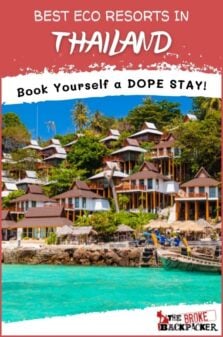
Share or save this post

Leave a Reply Cancel reply
Your email address will not be published. Required fields are marked *
Save my name, email, and website in this browser for the next time I comment.
Notify me of followup comments via e-mail.

Thailand works to preserve its natural wonders
Tourism authorities are encouraging visitors to leave "only their footprints and take only good memories".
Thailand is known for its warm hospitality, lush rainforests with spectacular waterfalls, pristine beaches, and spicy cuisine from the freshest ingredients. Yet, its surging global popularity as a tourism hotspot means the government has to work hard to preserve and conserve the country’s natural wonders.

Bearing this in mind, there are a number of initiatives designed to boost the sustainability of the local travel industry including one spearheaded by the Tourism Authority of Thailand (TAT) to reduce plastic garbage by up to 50% by 2020.
The federal collaboration, Travel Thailand in Style, Reduce Plastic Waste , involving hotels, Expedia and local communities encourages tourists and businesses to address waste problems generated by the country’s 32 million-plus visitors each year.

Provinces showcase conservation efforts
Tourism authorities are encouraging visitors to leave “only their footprints and take only good memories”.
The campaign encourages reusable or sustainable items including substituting plant-based drinking straws, using cotton bags instead of plastic bags, water tumblers instead of plastic bottles and reusable food utensils instead of single-use plastic or foam items.
While the initiative began in the eight million-strong megalopolis Bangkok, a number of the nation’s quieter, relatively unspoiled tourist destinations are leading the charge. For example, in Trat province, the island of Ko Mak, famous for its pure white sandy beaches and the popular diving isle Ko Tao, have embraced an environmental imperative.

Selected as Thailand’s first low-carbon destination, Ko Mak, with its bucolic fishing villages nestled among bendy palm trees, has established itself as a role model for surrounding islands.
The island’s residents, who are anxious to keep their home a laidback, natural destination have reached out for advice from the designers of other green initiatives after being selected for the honour by Designated Areas for Sustainable Tourism Administration (DASTA).
Their commitment includes using only locally sourced food, avoiding petroleum-based fuels, implementing water and waste management as well as preserving local activities and traditional ways of life.

Serene, romantic destination
Known as Thailand’s best kept secret, Ko Mak is a smaller island away from the bright lights and throbbing music of nearby Ko Chang. As one of Thailand’s more serene destinations, it is increasingly attracting couples and those with young families keen to get away from late-night bars and the party scene.
But what it does do, it does very well. A chance to rewind and recharge while staying on the beach, with some fantastic food options, including the popular breakfast haunt, The Food Art Hut, and deserted white sandy beaches are within arm’s reach.
Meanwhile on Ko Tao in Surat Thani Province, the azure waters that attract tourists including many divers from around the world, are being fiercely protected by local dive operators.

A group of dive centres have banded together to form Get Involved Ko Tao , a community-based conservation initiative to help preserve the natural resources and environment of the island by organising a monthly clean-up to remove waste and encouraging locals and tourists to "get involved" by saying no to the use of plastic straws, cups and bags.
The private sector has collectively embraced the "5Rs" dedicated to reducing, reusing, repairing, recycling and rejecting.
This involves reducing consumption; no-recyclable packaging, reusing items that can be used again like glass bottles, boxes or paper; repairing an item instead of buying a new one; recycling all materials that can be transformed into a new product and; finally, rejecting any item that pollutes or harms the environment.

From palm-fringed beaches to crisp mountain air
The eight-square mile island, with a permanent population of just over 1300, is known for its palm-lined beaches and coral reefs. Restaurants and bars are concentrated at Mae Hat Beach and near Sai Ri Beach.
If you are visiting Ko Tao, a day trip to Ko Nang Yuan is essential. This tiny island is only a brief speed boat ride away from the main island and, has a stunning beach and secluded places to take a swim.
A short hike to the island’s summit gives visitors views of the whole nearby island chain.
Moreover, Thailand not only boasts some of the best diving in the world, it is also one of the most affordable and best places to get your PADI diving certification, and Ko Tao just happens to be the most popular place in Thailand to get your credentials.

While the fragile island marine ecosystems are a focus of Thailand’s drive to promote sustainable tourism, some of the nation’s stunning natural landlocked destinations are also playing a significant role. A case in point is Loei province in the north-east, renowned for its cool mountain trails, rainforests and many waterfalls.
In May, Loei’s Phu Kradueng National Park—with its misty hiking trails up mountain crags—introduced the Go Green: Go Clean: Go Grow program which encouraged visitors to plant a tree and help clean up the area during a two-day event.

Stunning scenery and abundant wildlife
A key reason for cleaning up the National Park is that it is Thailand’s most popular trekking destination and parts of it were beginning to feel the pressure of having a continuous visitor presence.
The mountain park’s attraction to visitors is the top 23-square mile plateau of Phu Kradueng. It towers 3,000 feet above the valley floor and is blessed with beautiful scenery, lush pine forests and abundant wildflowers. For the lucky few who choose to camp overnight and away from the rainforest canopy, they can catch the spectacular mist-filtered first light of day or the crimson evening sun dipping below the horizon.
The Park’s cool climate can see temperatures drop to near freezing at night which contrasts with the balmy conditions many tourists associate with Thailand. Wandering along the mountain trails hikers may spy an array of wildlife, including sambar deer, the goat-like serow, foxes, squirrels, silver pheasant and (if lucky) the occasional elephant.

While a visit to Phu Kradueng is mostly about marvelling at Loei Province’s diverse natural wonders, it’s also important to recognise the conservation efforts currently being undertaken to preserve the fragile mountain habitat. Similar to the work being done to the marine ecosystems of Ko Mak and Ko Tao, these conservation initiatives serve as a reminder of our own responsibility to help preserve the environment for future generations.
Related Topics
- CULTURAL TOURISM
You May Also Like

Inside the northern Thailand town reviving indigo textile production for a new generation

Beach clean-ups, biking and art bars on a slow tour of Thailand's Koh Mak island

Cave meditiation to colonics: 5 ways to experience Thai wellness on Koh Samui and Koh Phangan

A UK break to Arnside and Silverdale, the little-known region of natural wonders

Meet the Thai women reviving ancient recipes for food-lovers in Bangkok

Carthage was Rome’s greatest rival. Go see its side of the story.

Canada's greatest natural wonders, from icebergs to the world's highest tides
- Terms of Use
- Privacy Policy
- Your US State Privacy Rights
- Children's Online Privacy Policy
- Interest-Based Ads
- About Nielsen Measurement
- Do Not Sell or Share My Personal Information
- Nat Geo Home
- Attend a Live Event
- Book a Trip
- Inspire Your Kids
- Shop Nat Geo
- Visit the D.C. Museum
- Learn About Our Impact
- Support Our Mission
- Advertise With Us
- Customer Service
- Renew Subscription
- Manage Your Subscription
- Work at Nat Geo
- Sign Up for Our Newsletters
- Contribute to Protect the Planet
Copyright © 1996-2015 National Geographic Society Copyright © 2015-2024 National Geographic Partners, LLC. All rights reserved
- Get involved
Community-Based Tourism: Empowering Local Champions for Sustainable Tourism in Thailand
November 6, 2022.

Pattamon Rungchavalnont
Head of Solutions Mapping, Accelerator Lab, Thailand
Thailand is among the world's top tourist destinations. The country’s diverse geographical settings and rich cultural capital provide a vast variety of tourism experiences from relaxing by beautiful sandy beaches of the South to exploring lush green forests of the mountainous North and enjoying local cultures in the Northeast. In 2019, Thailand welcomed a record high of 40 million visitors. For this reason, tourism is a major driver of Thailand’s economic development, providing around 20% of the national GDP and employing over 4.2 million people (11% of total employment). However, Thailand’s tourism industry is not without negative side effects. Unsustainable management of tourism has proven to cause environmental degradation and biodiversity loss as well as fuel uneven economic development. Oftentimes, economic benefits from tourism fall into the hands of large tour operators and investors from the outside while local communities gain minimum economic benefit and are left to suffer many social and environmental drawbacks.
While the COVID-19 pandemic has caused a major setback to the tourism industry, it also provides an opportunity for Thailand to rethink its tourism. Sustainable and resilient tourism has become a key theme for the country and is now one of UNDP Thailand’s focus areas. UNDP Accelerator Lab Thailand seized this opportunity to embark on a journey to support the growing momentum for sustainable tourism by contributing innovative approaches to the redefinition of the country’s tourism industry, specifically from the angle of community-based tourism.
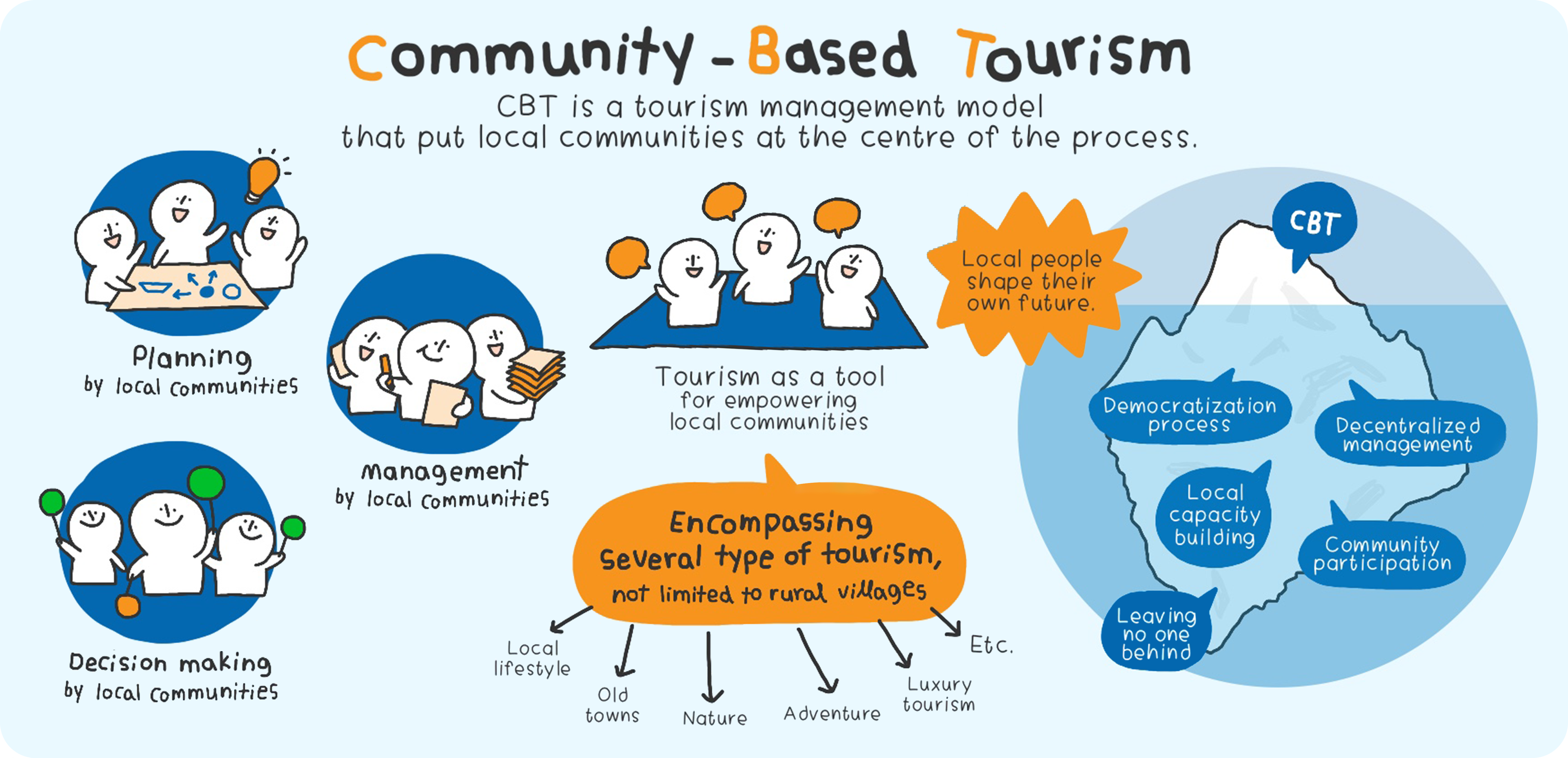
Why community-based tourism?
Emerged in Thailand in the 1990s, ‘community-based tourism (CBT)’ proposes the idea of ‘tourism by the local people for the local people’ . It is one of the solutions for sustainable tourism because, under this framework, local people are the key decision-makers of their tourism development and the ones to fully benefit from it. Being long-term residents of the areas, local communities are more incentivised to balance economic growth and socio-cultural and environmental impacts caused by tourism activities. At the end of the day, it is their home. However, it is crucial to clear the misconception that CBT refers to ‘village tourism,’ limited only to certain styles of tourism that take place in rural areas. CBT is a tourism management model that puts local communities at the center of the process and can encompass diverse tourism styles from rural tourism to urban tourism, nature tourism, or even luxury tourism. Essentially, CBT is about community empowerment as it is a process in which local people are empowered to uplift their own livelihood.
The pandemic has posed both challenges and opportunities for CBT. International travel restrictions caused a major drop in foreign visitors which used to make up a significant portion of visitors for CBT. Local communities needed to adjust themselves to the domestic tourism market and diversify their offers e.g. community products beyond tourism activities. On the other hand, the pandemic has shaped new tourist behaviours- traveling in smaller groups, choosing less crowded destinations, escaping to nature, and searching for unique experiences and activities for well-being, among others. Many of these new preferences match very well with what CBT can offer and can potentially pave way for a golden age of CBT. Moreover, pandemic-induced lockdowns in major cities led to a reverse in rural-urban migration. Many people working in the cities returned to their hometowns during the lockdown and some sought to find livelihood options at home. CBT provides an alternative and in turn benefits from increased human resources- the skilled workforce who have gained skills and exposure from their time working in the cities. All in all, it is an important time for CBT to take the next step to ensure its thrivability in this rapidly changing world.
Making sense of CBT and contemplating on the way forward
As a starting point, national-level workshops were co-organized by UNDP Accelerator Lab Thailand, Thailand Policy Lab, the Designated Areas for Sustainable Tourism Administration (DASTA) , and Local Alike (one of Thailand’s leading social enterprises working on CBT). Representatives from local communities, relevant governmental agencies, the private sector, civil society organizations, and academia exchanged views on trends and weak signals affecting CBT as well as discussed the desirable future and way forward. A few interesting points from the exercise include:
- CBT can go beyond leisure tourism and provide learning experiences for visitors, for example community-based environmental conservation and waste management and tap into opportunities from the rise of corporate social responsibility (CSR) and Thailand’s Bio-Circular-Green (BCG) Economy Model of the government.
- Communities need to build the next generation of CBT leaders. Involvement and incentives for the new generation are key for successful engagement and transition.
- Planning and decision-making should be a bottom-up and collaborative process between the government and local communities to avoid projects which do not fit local contexts or serve the real needs of stakeholders. For instance, many tourism applications were created but abandoned.
- Multisectoral support is crucial for CBT development e.g. support from the private sector on digital transformation, academia on CBT-related curriculum for young leaders, etc.
- Funding mechanisms must be further developed e.g. shifting from an informal arrangement to a social enterprise, setting up CBT development funds, etc.
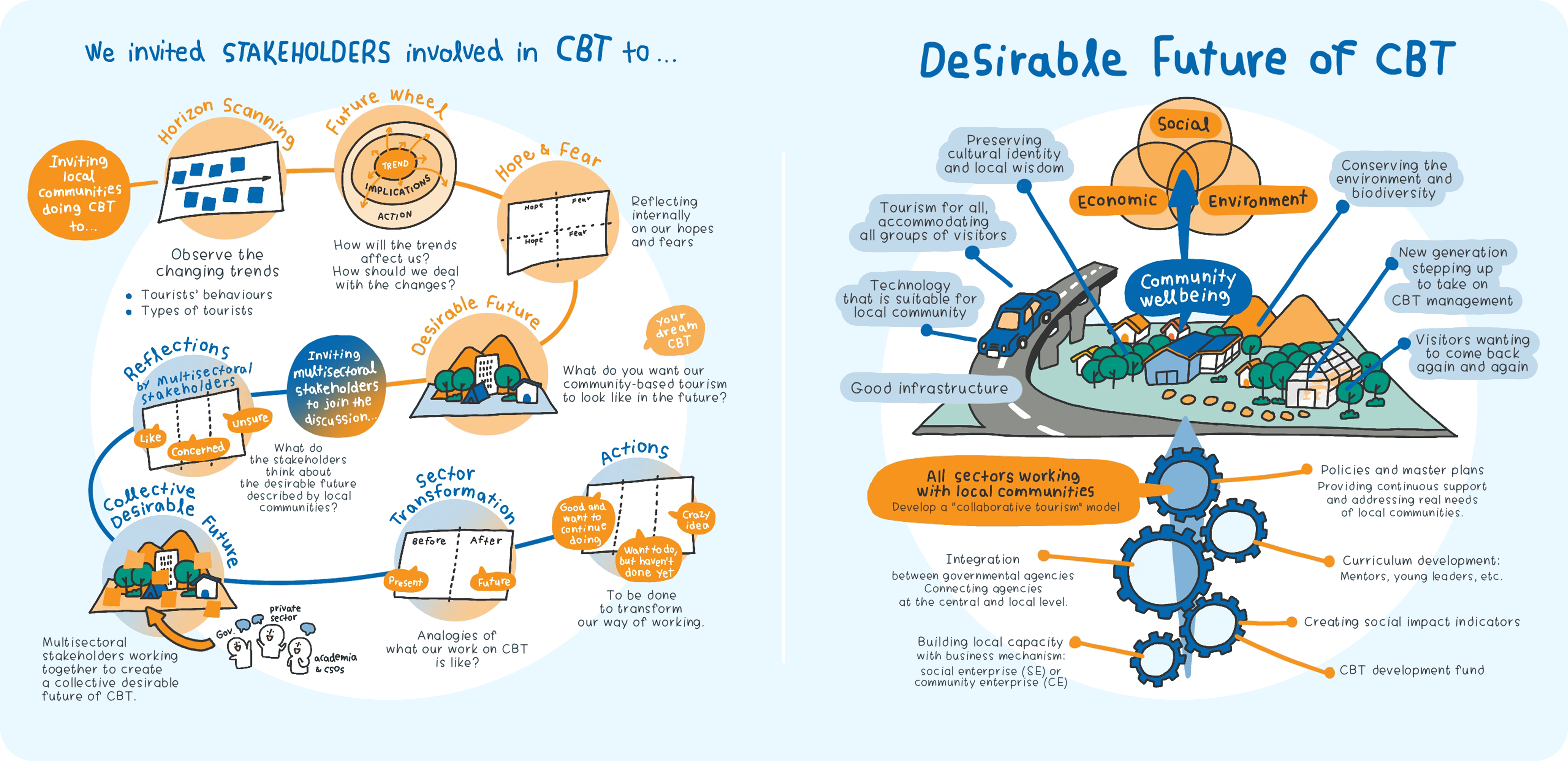
While the discussion revealed multiple areas for development, capacity building for local communities stood out as one of the prerequisites for success. Since local communities are the main drivers of CBT, they must be equipped with frameworks and tools that will enable them to flourish in the rapidly changing world. Existing capacity-building initiatives have been fairly successful in supporting local communities to begin their CBT journey, often focusing on building the foundation and taking a short/medium-term view. While such emphasis is essential, it might not be sufficient any longer. Especially once local communities manage to set up the basics of their CBT, they also need to start thinking about sustainability and being anticipatory. As a result, the Lab identified this as our area of work: how local communities can make their CBT become more sustainable.
Learnings with the locals
UNDP Accelerator Lab Thailand in collaboration with Local Alike joined hands with two pilot communities to start our learning journey. Social innovation tools were applied to invite local stakeholders to reflect on the becoming of their CBT and look forward through the lens of sustainability. Given the different nature of each community, the discussions and sustainability initiatives took on different directions. However, one commonality revealed itself. Community is never homogeneous; CBT development is an area of convergence for different groups to interact and build momentum toward sustainability. To elaborate, let’s take a closer look at each of the pilot communities…
Chulabhorn Pattana 9 community: A case of nature-based tourism from the South
As a neighbour of the world-famous Hala-Bala Wildlife Sanctuary, Chulabhorn Pattana 9 community of Yala province in Southern Thailand has attracted many nature lovers; some visited the village just to enjoy the serenity and beauty of the natural environment while others were excited by the rich biodiversity of the Hala-Bala Forest, not to mention the village’s charming cultural heritage from their Community Malaya time. The village is familiar with receiving visitors as they have been welcoming relatives and friends from Malaysia and Singapore (legacy of Community Malaya time) for decades. Eight years ago, the concept of CBT was introduced, and the new generation stepped up to lead CBT management. The intergenerational difference is reflected in the different views on tourism management- one hoping to increase the number of visitors while another seeking to keep the delicate balance. The new generation realizes that their main target group is nature lovers. Thus, nature is the main capital for their CBT and its conservation is of paramount importance. Hence, the discussion about limiting the number of visitors with consideration of the area’s carrying capacity was very well received by the CBT management team.
CBT at Chulabhorn Pattana 9 does not only aim to mitigate the negative effects of tourism activities but also inspires positive changes in the local community. In many cases, tourism may have resulted in waste management problems. On the contrary, for Chulabhorn Pattana 9 community, the visitors are the ones demanding that waste in the village needs to be better managed. Hearing these comments, the CBT management team was eager to start a waste management initiative with support from the Lab and Local Alike. Waste separation and organic compost-making have been pioneered by the CBT group and will be shared with fellow villagers to inspire more people to join the effort.
In addition, the CBT management team sought to further develop tourism activities that highlight the value of biodiversity and incentivize conservation. Birdwatching was identified as a viable option. Interestingly, apart from our support, birdwatching was born out of collaboration with a visitor who happens to be a bird expert, an ex-member of the Bird Conservation Society of Thailand. Feeling that Chulabhorn Pattana 9 is more than a touristic destination to him, this bird expert saw the potential and was more than willing to help provide training on birdwatching to local guides. Chulabhorn Pattana 9 is able to shift from selling their services to ‘tourists’ to building relationships with ‘visitors’, some of whom have become ‘friends’ to co-create a sustainable future for their CBT.
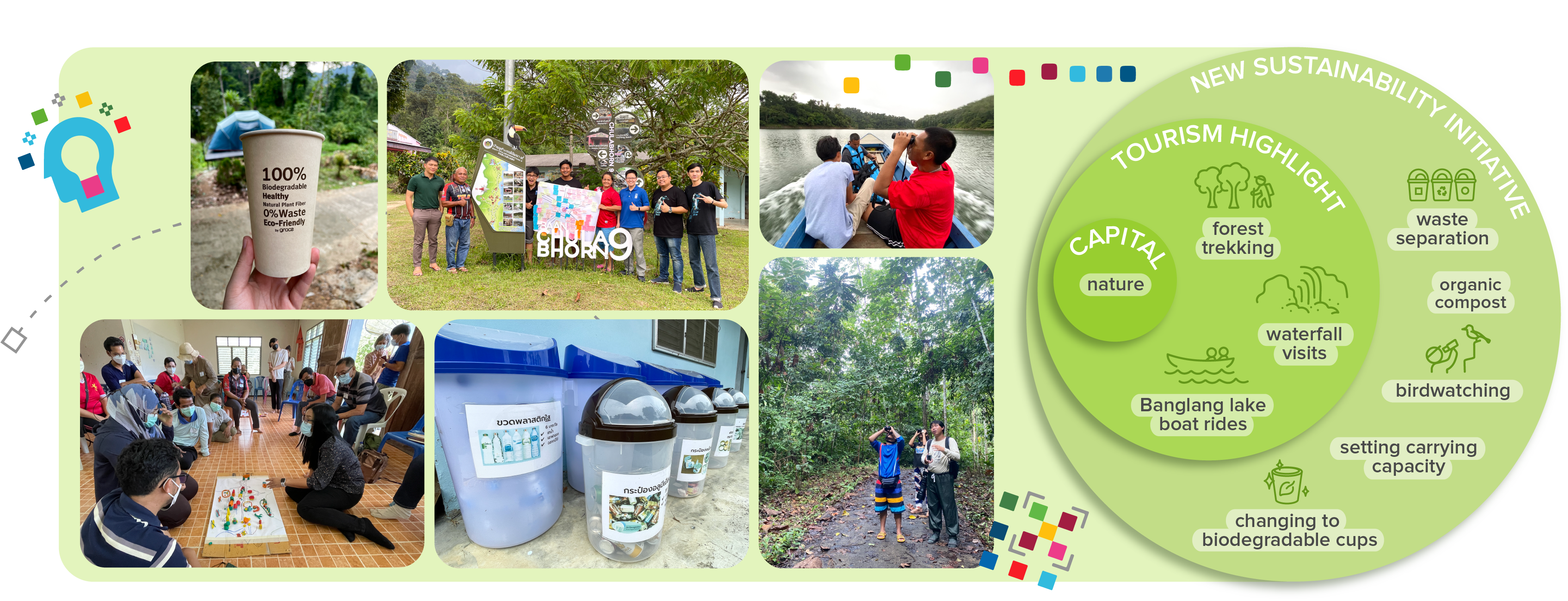
Nong San community: Local life and craft in the Northeast
Nong San community of Sakon Nakhon province in the Northeast of Thailand is famous for its indigo dye handicrafts. Traditional knowledge on indigo dye has been passed on from generation to generation at Nong San village. When combined with the skills of a new generation artist, Pornpimon Mingmitmee, this cultural capital becomes the starting point of Nong San CBT. Visitors, both craft lovers and chillax tourists, enjoy the simple slow life and recharge themselves with natural dye crafts, organic agriculture, and the beauty in the local lifestyle. However, the early days of Nong San CBT were not all easy. The community did not believe that CBT was viable at first, so Pornpimon had to start small and gradually showed other people the success to inspire more support from within the village and nearby community. Furthermore, with the COVID-19-induced lockdown, villagers who used to work in other cities returned to the village and joined force to expand Nong San CBT. However, unlike Chulabhorn Pattana 9 case, Nong San CBT opts for a more decentralized model where each member acts as an independent micro-entrepreneur and loosely connects to provide tour packages for visitors. Therefore, the work here was about business incubation for female micro-entrepreneurs to enhance the distribution of benefits from CBT among the local people. Entrepreneurial skills, including digital marketing, were provided to interested locals.
Circularity is another theme as Pornpimon has been trying to manage waste materials from textile crafts production e.g. left-over threads and fabric scraps. Drawing inspiration from India, the initial idea was to turn textile waste into paper. Local knowledge in Thailand provides a technique for turning natural fibers into handmade paper. Yet, from the prototyping phase, cotton textile waste has proven to be more difficult to handle than other fibers. An alternative was presented as Pornpimon connected with a company working on recycled textiles. The idea is to compile textile waste from the local community, turn it into recycled fabrics, and send it back to the community as raw materials for new products. At the time of writing, the discussion is still ongoing to develop a suitable model of collaboration. This case demonstrates the power of cross-sectoral collaboration in driving CBT toward sustainability.
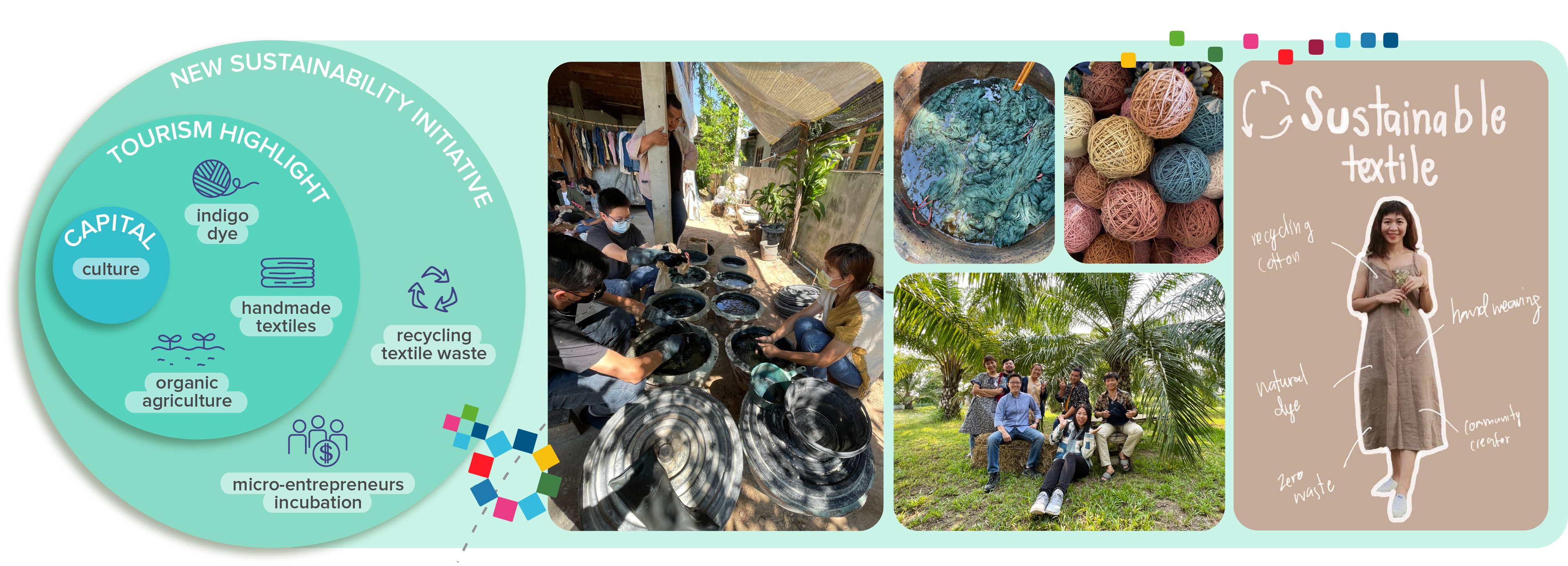
Sharing our experiences
Through the working process with our partners, UNDP Accelerator Lab Thailand was able to learn about CBT development as well as share our social innovation tools with key change agents like Local Alike and relevant governmental agencies. Realizing the value of these tools in facilitating processes towards sustainability and resilience, the Lab together with Local Alike co-produced the Community-Based Tourism Social Innovation Playbook to share with others the experience of Thailand. The Playbook emphasized that social innovation process is not linear. While the tools are categorized into three groups (making sense of the past and present; looking forward to the future; and taking actions), users can always jump back and forth between each category of tools to fill the gaps of knowledge as they surface. Case studies from our work with Chulabhorn Pattana 9 and Nong San communities demonstrate this non-linear journey as well as the fact that no two communities are alike; thus, the social innovation tools must be ultilized in consideration of specific local contexts.
In addition to the publication, the Accelerator Lab Thailand will be working with the Accelerator Lab Bangladesh on CBT development in their context. Follow our next blog to see how Thailand’s experiences can be adapted and what lessons we will learn on the journey to transform tourism into a vehicle for sustainable development.
The future of ethical elephant tourism in Thailand

Apr 25, 2024 • 5 min read
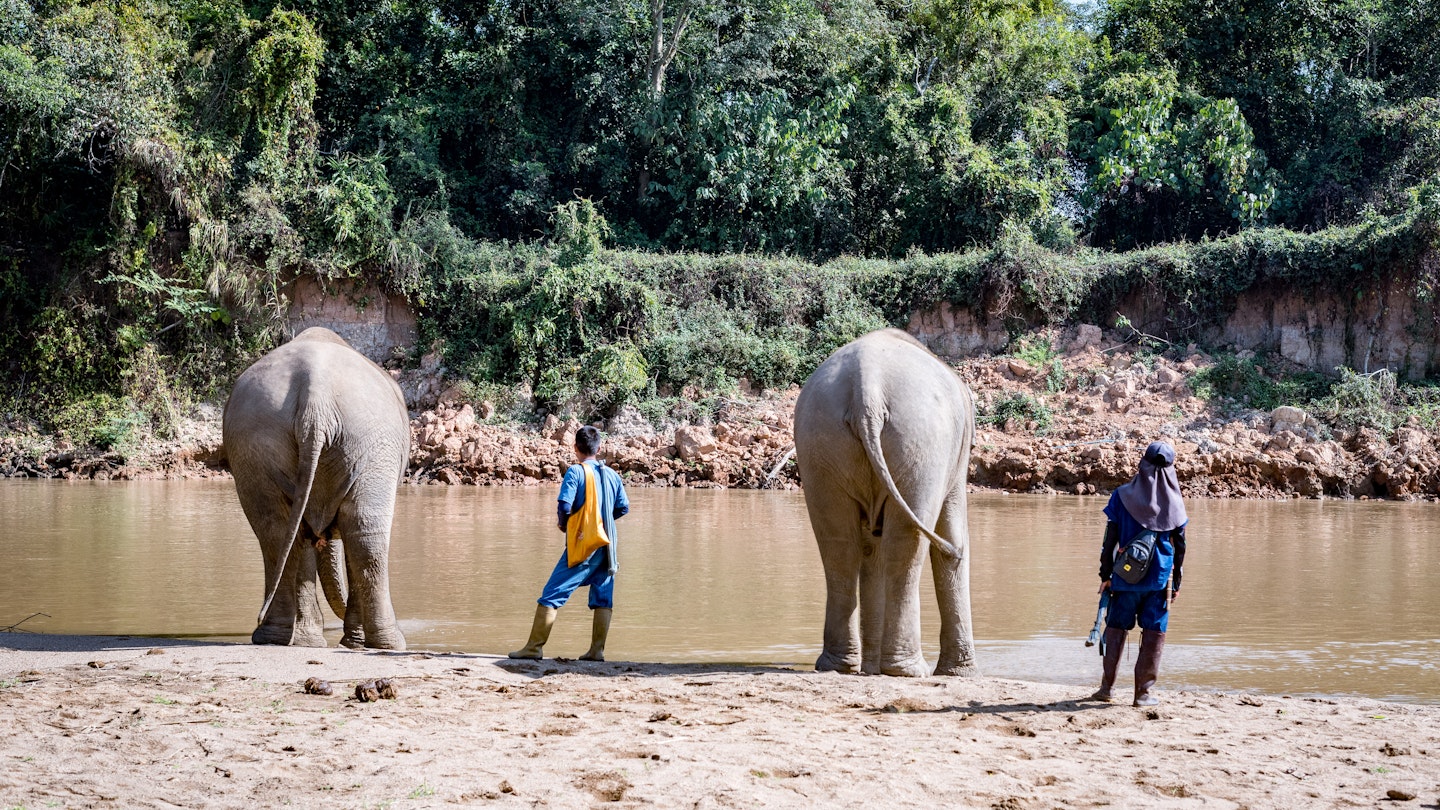
One resort is using this sustainable approach to securing the future of ethical elephant tourism in Thailand © Anna Haines / Lonely Planet
My most shameful moment as a traveler occurred in Thailand .
On my first backpacking trip at the age of 20, I sought out an elephant sanctuary in the Golden Triangle region of Northern Thailand hoping to see an elephant up close. I assumed “sanctuary” meant it was a refuge for elephants but I knew something was off when we were encouraged to climb atop the elephants that were chained to a post.
Ever since, whenever I see the image of an elephant, I see not Thailand’s national emblem, but a symbol of tourism gone wrong. Is it possible to engage in an ethical way with the gentle giant that has been an icon of Thailand for centuries? Determined to find out, I made my first trip back to Thailand.
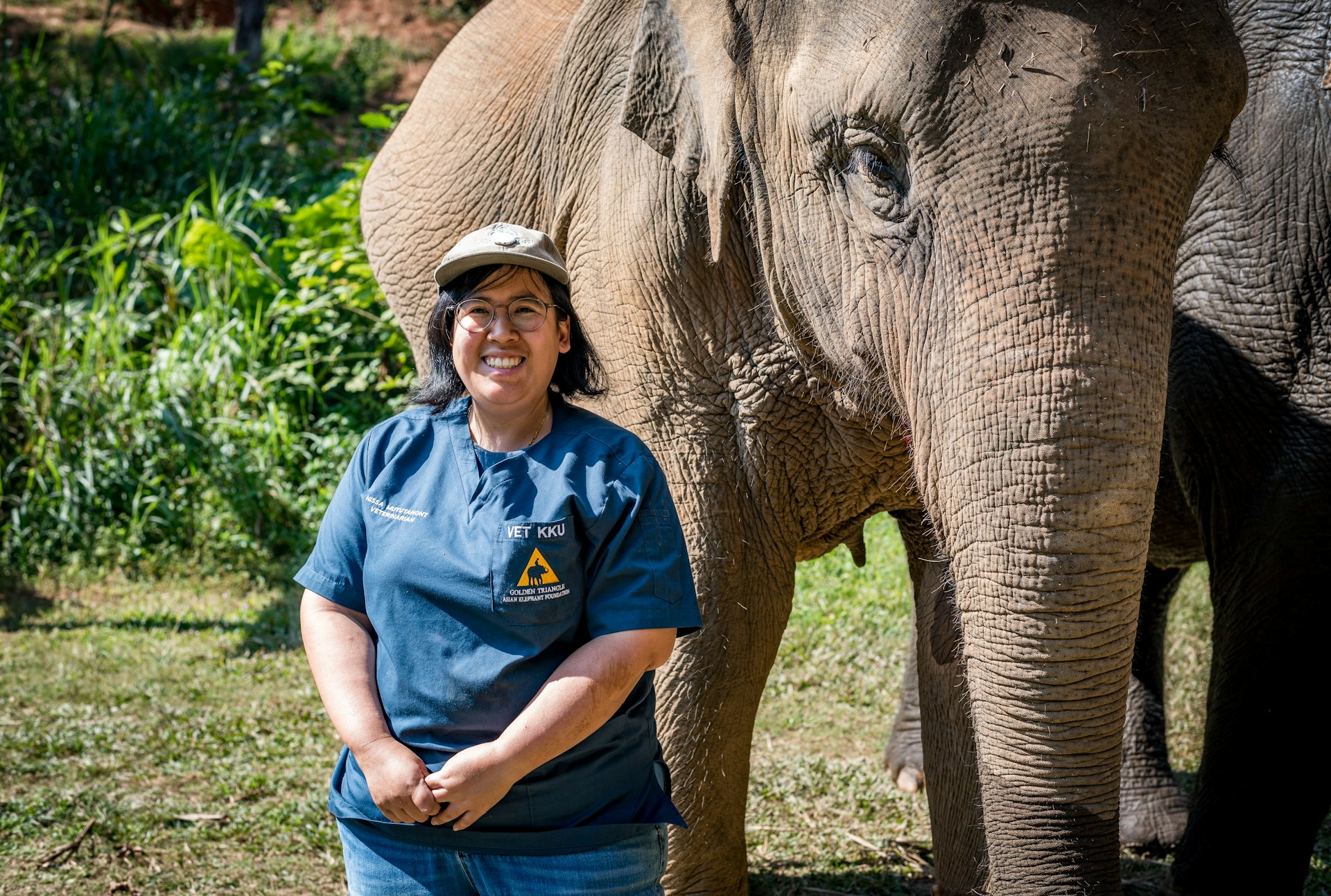
Finding a reputable elephant sanctuary
I planned to return to the Golden Triangle but this time I did my research. In my search for camps that are engaged in meaningful elephant rehabilitation, Anantara Golden Triangle Elephant Camp & Resort repeatedly came up as a reputable sanctuary. When, within 10 minutes of arriving at the resort, I spotted two elephants freely grazing near the Mekong River, I was eager to find out how the 20 elephants that live there are cared for.
Many of the estimated 3800 captive elephants in Thailand are not treated fairly. Despite being a protected animal under Wild Animal Reservation and Protection Act (WARPA) since 1975, many of the elephants living in tourist facilities are suffering. They often develop nervous habits from anxiety, which was something I witnessed firsthand here. The on-site vet, Dr Nissa Mututanont, explained that the repetitive circle-of-eight figure one elephant was making with their head is a self-soothing technique they continue to exhibit after captivity, even once they’re safe.
This lesson is one of many I learned from Dr Mututanont as she guided us through making elephant energy balls (a giant mound of bananas, tamarind and nutritional pellets we mold with our hands), to walking with the elephants, to showering them under the warm sun. I was relieved to find out there will be no elephant riding — this elephant camp cares more about the rehabilitation of elephants than providing Instagrammable moments to guests. The elephant encounters here are less interactional and more educational, a welcome shift in the nature of elephant tourism that meets the growing pressure from the travel industry and animal welfare groups to protect elephants from the harmful practices — such as caging and beating — traditionally involved in training elephants for tourism. Established in 2003, the Anantara camp works with The Golden Triangle Asian Elephant Foundation (GTAEF) to perform street rescues and provide a comfortable home for elephants, with Dr Mututanont overseeing their nutrition and medical care. To date, the camp has rescued more than 50 elephants, not only providing the gentle giants with a new home, but their mahouts too.
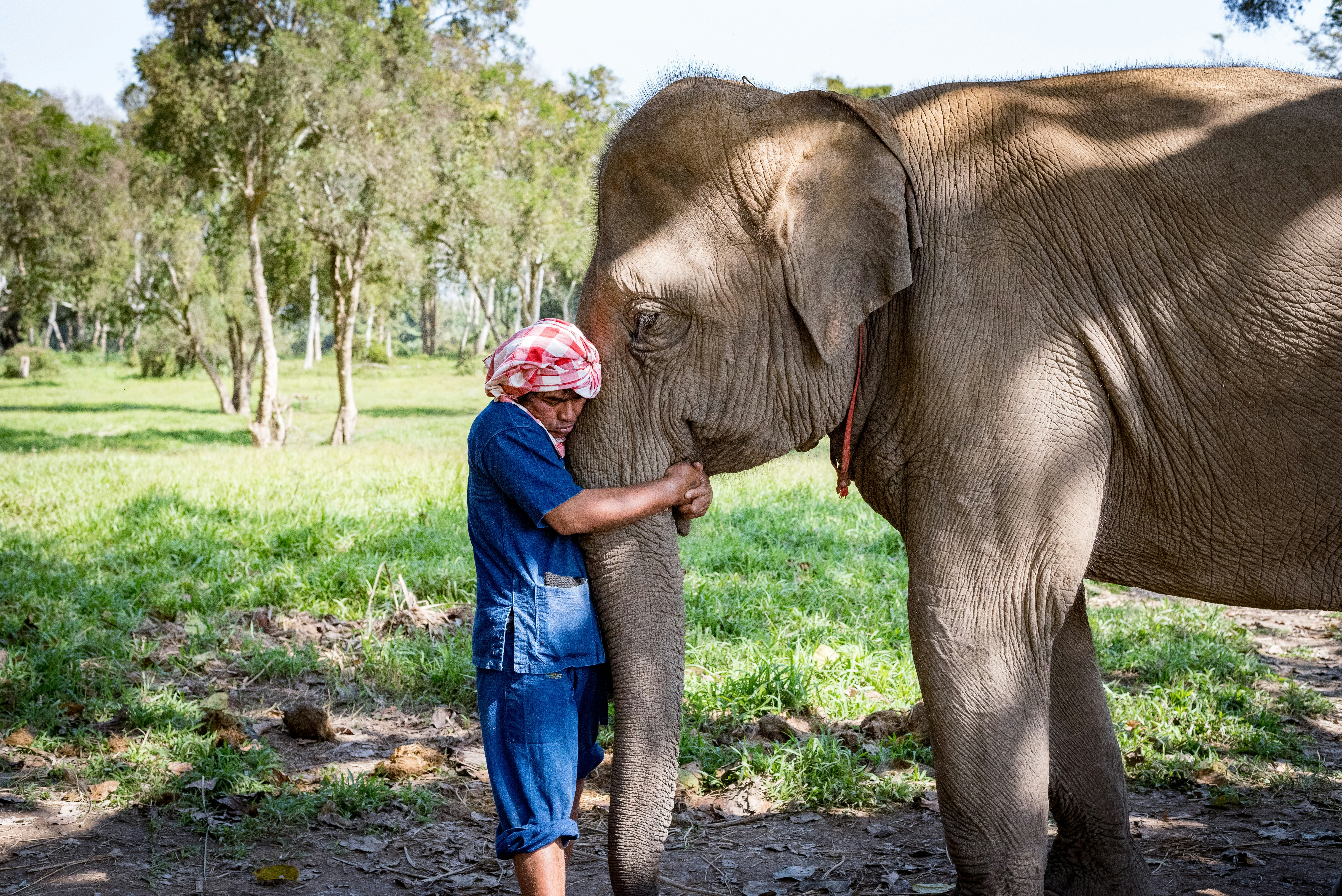
The importance of the elephant–mahout relationship
Despite the 4000-year-old tradition of handling elephants, the mahout is a dying profession. While unethical elephant camps should undoubtedly be closed, there is little consideration for what happens to the elephants and their mahouts afterward. During the pandemic, when travel to Thailand grinded to a halt, the income to take care of elephants dried up too. “Their caretakers need to find an approximate US$20 per day just to feed their elephant, let alone their own family, and meet all their other needs,” says John Roberts, Anantara’s Group Director of Elephants & Conservation. “Elephants consume between six and ten percent of their body weight daily, and it costs approximately US$18,000 a year to look after a single elephant.” Without the support of tourism dollars, mahouts struggle to take adequate care of their elephants.
The mahouts could easily abandon their elephants but they typically don’t, not only because the elephants are their primary source of income, but because they develop a deep bond with the gentle giants too. I sensed this connection when I saw a mahout hugging their elephant’s trunk in a moment of warm embrace. Learning that 70% of the mahouts here came with their elephant, it becomes apparent this is a lifelong relationship, one that plays a large role in determining the elephant’s wellbeing.
The mahout and elephant have their own dialect of commands which, once the elephant is acquainted with their own mahout, they don’t even need to use. The elephants develop such a close relationship with their mahout, they come to treat them like next of kin by, for example, instinctively providing shade over the mahout when they’re sitting in the sun. Rather than a domineering relationship of ownership, the mahout and elephant are more like family — one needs the other to survive.
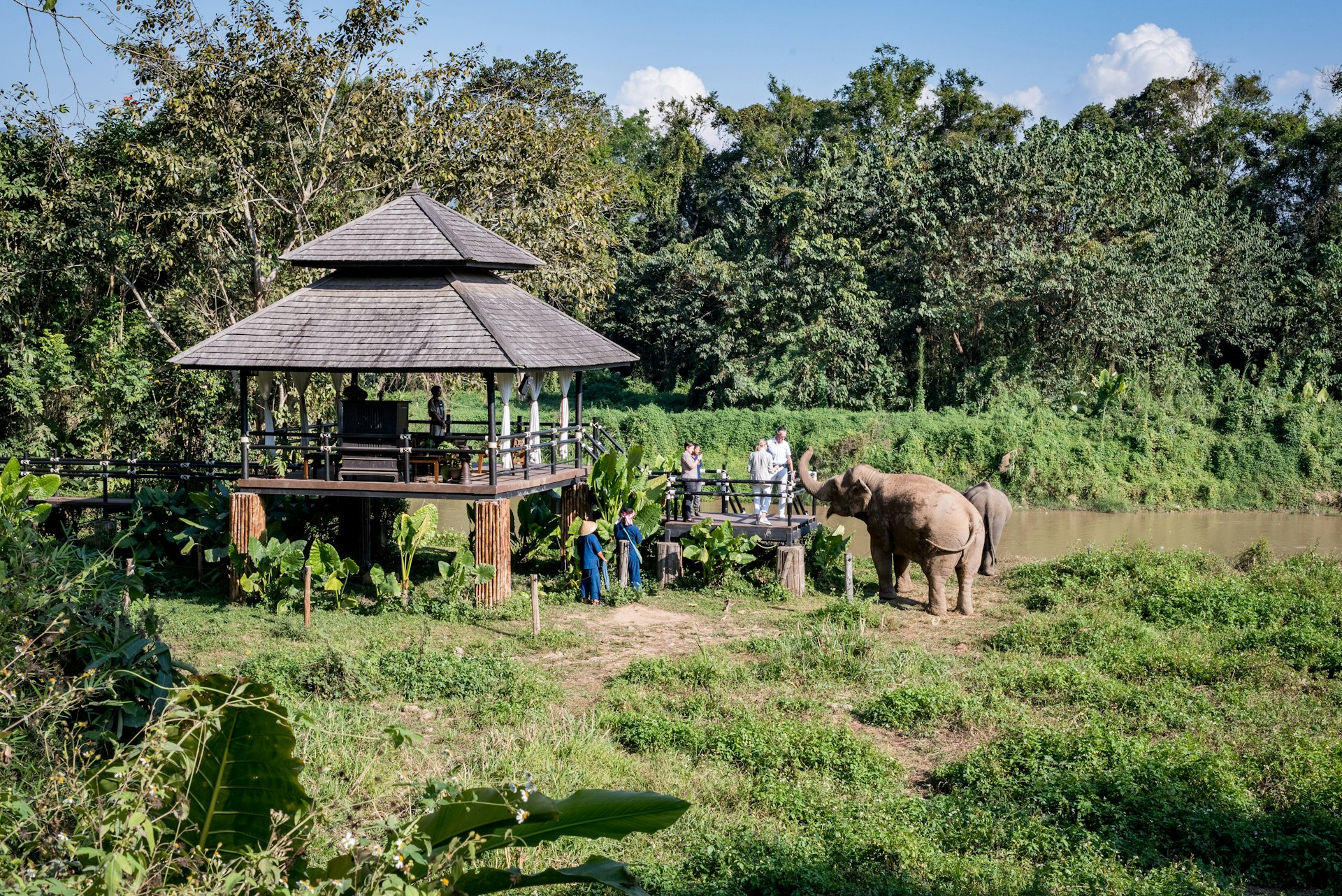
Supporting former mahouts
It’s why Anantara Golden Triangle Elephant Camp & Resort takes providing for their mahouts as seriously as the rehabilitation of their elephants. The mahouts live on-site and receive three meals a day. The GTAEF supports the mahouts’ families too, providing an education to their children in the nearby villages where they live. As a result of offering English instruction, these local schools have gone from last in the province for average English score to the top one hundred. Given that being a mahout is typically an inherited profession, improving the literacy and education levels of the next generation has the potential to safeguard the future of elephant caretaking too.
But it’s not just the mahouts’ children who receive an education, the mahouts do too, learning ethical elephant training techniques. One of the GTAEF’s most successful free courses has been the "Target Training Positive Reinforcement Workshop," in which elephants learn how to present parts of their body (for medical inspections like nail trimming and blood tests) by receiving their favorite treat as positive reinforcement. Now in its twelfth year, the training has been so effective the Foundation has expanded to offer it in the neighboring countries of Laos , Myanmar and Cambodia . “To date we have reached over 400 mahouts,” says Dr Mututanont. “The speed at which the new techniques have been adopted by mahouts is so uplifting to see.”
After my unethical elephant experience over a decade ago, I was eager to find an elephant sanctuary that lives up to the meaning of the word — a true place of refuge. I wasn’t surprised to find it exists at Anantara Elephant Camp. I was surprised, however, to discover that ethical elephant tourism in Thailand is as much about supporting the people behind the elephants — the mahouts who look after them — as the elephants themselves.
Explore related stories
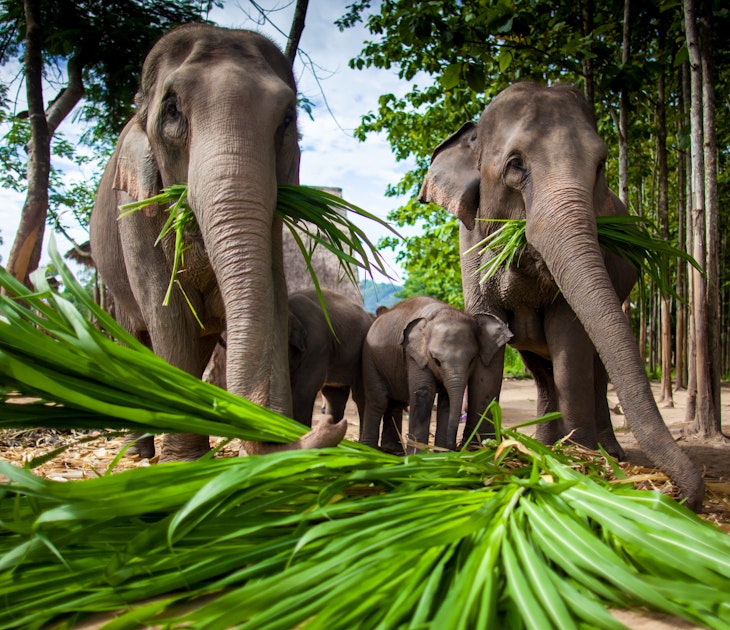
Wildlife & Nature
Jan 21, 2022 • 9 min read
Before you book that elephant encounter in Thailand, read on to find out how to put Thailand's elephants' welfare first.

Nov 18, 2021 • 5 min read

Nov 15, 2021 • 5 min read
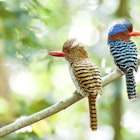
Sep 6, 2021 • 7 min read
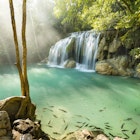
Jun 9, 2020 • 1 min read

Apr 2, 2020 • 6 min read
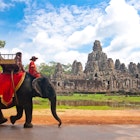
Nov 19, 2019 • 2 min read
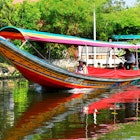
Oct 18, 2019 • 5 min read

Mar 15, 2018 • 7 min read

Jan 19, 2016 • 4 min read

Supporting Thai Gulf Communities and Environment
About EcoThailand Foundation
EcoThailand (นิเวศวิถี) is a not for profit NGO, with Thai registered Charitable Foundation Status, based in Surat Thani province Thailand. We have a strong Environmental and Community focus and are active on Koh Phangan, Koh Samui, nearby Gulf Islands, and the provincial Southern Thai mainland, including Surat Thani, Nakhon si Thammarat and Phuket.
Caring for our Environment
We endeavor to promote environmental sustainability, education, awareness, guardianship and direct action among children, youth, local adult groups and businesses in the Thai Gulf through the promotion and facilitation of co-working, co-ordination and networking, between ourselves and partners, to achieve locally agreed goals for the benefit of the local environment and all of its diverse communities.
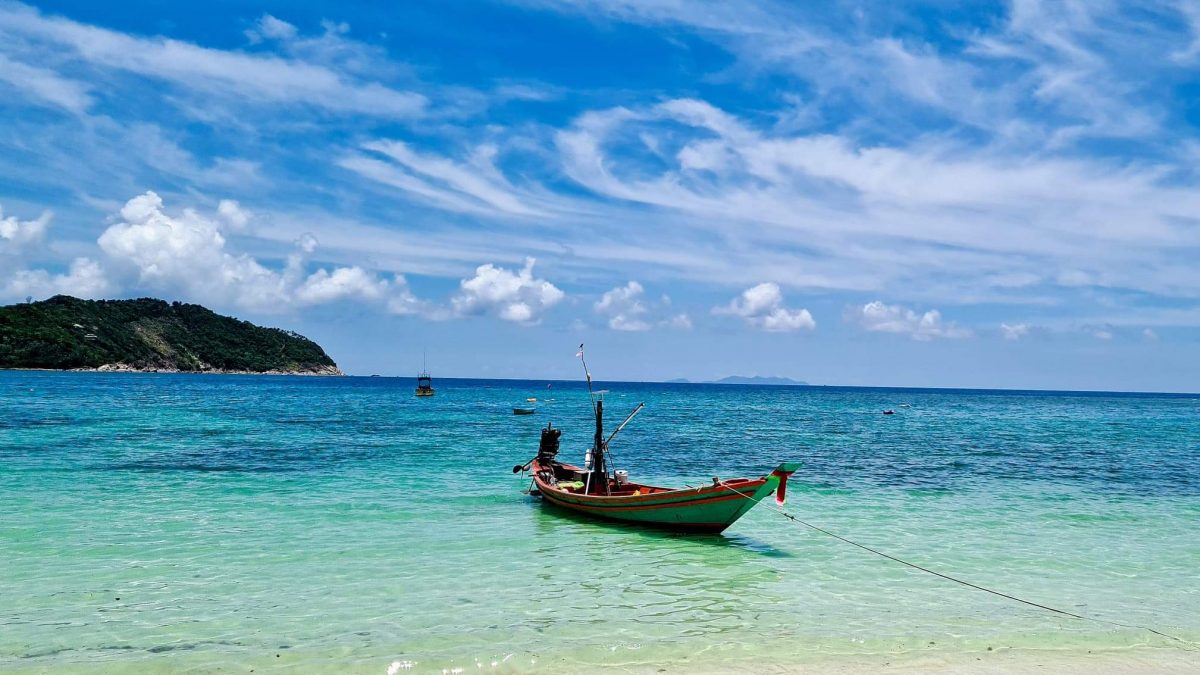
Supporting education within schools and communities
We believe in the power of change and that the best gift we can give to future generations, the most valuable legacy we can leave behind us, is to help empower students to be leaders and guardians for sustainability and positive change, by enhancing local education …. Engaging the youth of today to protect the planet of tomorrow .
Bringing communities together, supporting great ideas and sustainability.
Community foundations come in all shapes and sizes, but what we all have in a common is a commitment to making a difference to people’s lives and the places they live. We strive to be local champions, connecting people and organisations that want to improve their communities and environment. We invest in local people and organisations tackling the issues facing communities today and supporting some of society’s most disadvantaged people. You can Support Us , either financially or with your personal inputs or Contact Us for more information.
Inspiring local philanthropy
Community foundations provide help and advice to those who want to give at the heart of their communities, both now and in the long-term. We facilitate and help match donors and partners to important local causes, we can act as Fiscal Agent for non-registered organizations, and as both grantee, receiving Donations and grants, and as grantor via our MicroGrants program.
Our site provides extensive community and environmental information in the Thai Gulf, feel free to browse our Work , our Resources and related linked pages.
EcoThailand subscribes to, and supports, the UN Sustainable Development Goals .
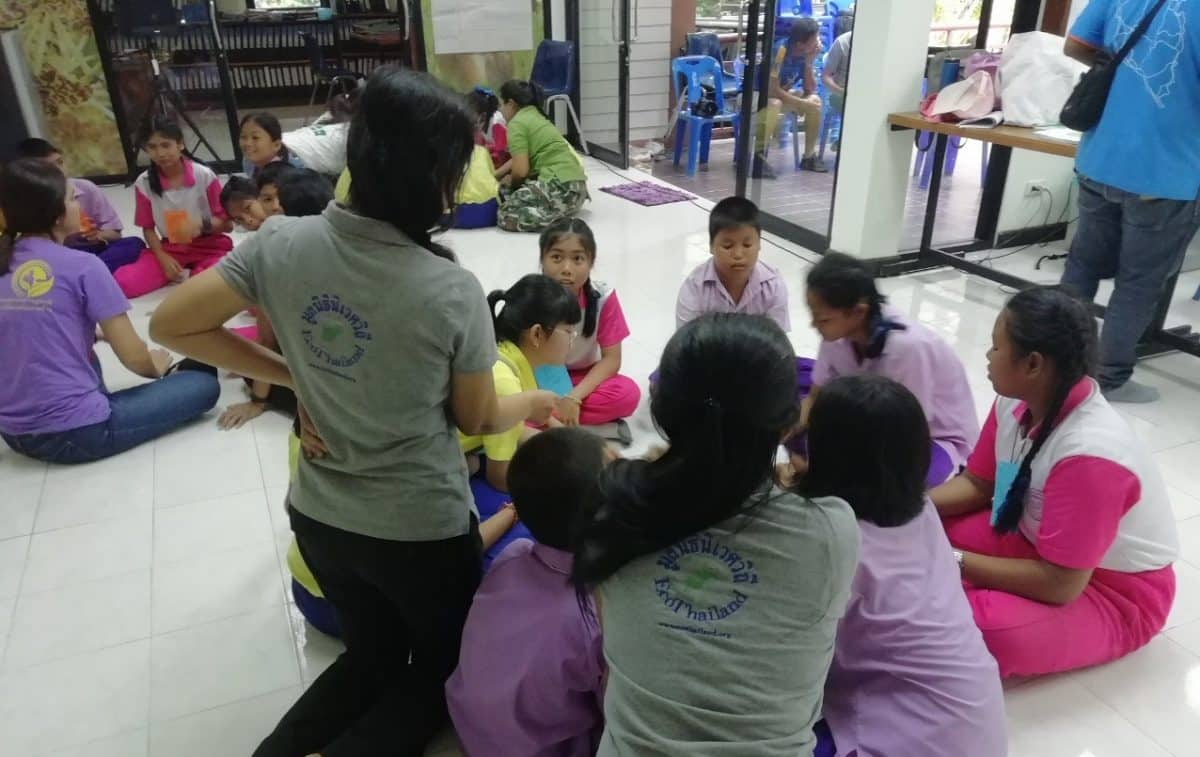
Our Partners
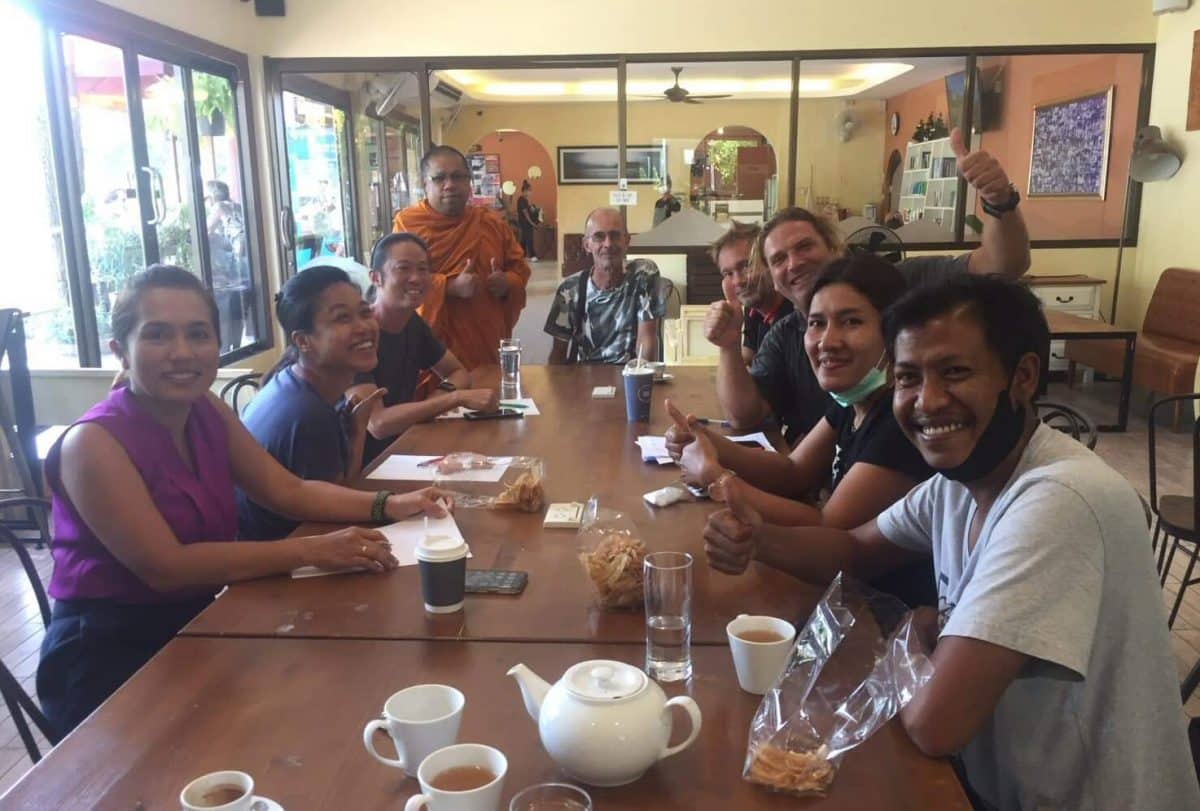
Our Funding
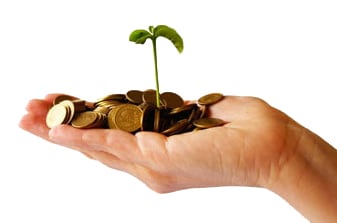
Investigating the relationship between environmental quality and tourism industry in Thailand
- Published: 23 August 2023
- Volume 26 , pages 12339–12365, ( 2024 )
Cite this article

- Helal Uddin 1 ,
- Sufian Ahammed 1 ,
- Md. Masud Rana 1 &
- Shapan Chandra Majumder ORCID: orcid.org/0000-0003-2756-436X 2
376 Accesses
6 Citations
Explore all metrics
This research intends to look into the connection between Thailand's tourist industry and environmental quality. This study specifically examines how tourism industry and trade sector affect the environmental quality in Thailand. The objectives of the study are to assess how trade and tourism affect the environment and to provide suggestions for environment friendly travel habits. The autoregressive distributed lag model was used in the research to analyze in both the long- and short-term links between environmental quality, tourism, and trade in Thailand. The study’s statistics, which span the years from 1995 to 2021, were taken from the World Bank database. According to the study’s results, Thailand’s trade and tourism are significantly inversely correlated with environmental quality. Based on this research, both the short- and long-term effects of increased trade and tourism are a reduction in the country’s environmental quality. By presenting factual proof of the damaging effects of commerce and tourism on Thailand's ecosystem, the research adds to the body of previous material. The report also emphasizes the need for decision-makers to implement environmental protection laws and sustainable tourism practices in order to lessen the damaging effects of trade and tourism on the environment. The study’s conclusions suggest that the Thai government gives concentration in implementing environment friendly tourist practices a higher priority. To further guarantee that the detrimental effects of trade and tourism on the environment are kept to a minimum, the government should think about enacting environmental protection measures. The paper concludes by recommending more research be conducted to examine how other elements, such as technology, may affect Thailand's environmental quality.
This is a preview of subscription content, log in via an institution to check access.
Access this article
Price includes VAT (Russian Federation)
Instant access to the full article PDF.
Rent this article via DeepDyve
Institutional subscriptions

Source: Authors own concept

Similar content being viewed by others

Impact of Environmental Factors on Tourism Industry in Pakistan: A Study from the Last Three Decades

Tourism Sector and Environmental Quality: Evidence from Top 20 Tourist Destinations
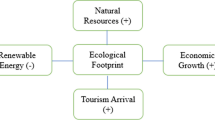
Do natural resources affect environmental quality in MINT Economies? The role of tourism and financial development
Data availability.
World Development Indicators (WDI) is the key secondary data source of this study. This study used time series data from 1995 to 2021 for Thailand.
Ahmad, N., Youjin, L., Žiković, S., & Belyaeva, Z. (2023). The effects of technological innovation on sustainable development and environmental degradation: Evidence from China. Technology in Society, 72 , 102184.
Google Scholar
Ali, S., & Anwar, A. (2021). Stock market efficiency in Pakistan: Evidence from Phillips Perron unit root test. Journal of Finance and Economics Research, 6 (1), 1–11.
Al-Mulali, U., Fereidouni, H. G., & Mohammed, A. H. (2015). The effect of tourism arrival on CO 2 emissions from transportation sector. Anatolia, 26 (2), 230–243.
Becken, S., & Hay, J. E. (2007). Tourism and climate change: Risks and opportunities (Vol. 1). Multilingual Matters.
Bekhet, H. A., & Matar, A. (2018). Testing for inflation persistence using Phillips–Perron unit root test for Egypt. Journal of Applied Economic Sciences, 13 (3), 602–608.
Butler, R. (1998). Sustainable tourism: A state-of-the-art review. Tourism Geographies, 1 (1), 7–25.
Chim-Miki, A. F., & Batista-Canino, R. M. (2017). The competition perspective applied to tourism destinations: A literature review. Anatolia, 28 (3), 381–393.
Chin, C. H., Lo, M. C., Songan, P., & Nair, V. (2014). Rural tourism destination competitiveness: A study on Annah Rais Longhouse Homestay, Sarawak. Procedia-Social and Behavioral Sciences, 144 , 35–44.
Dickey, D. A., & Fuller, W. A. (1981). Likelihood ratio statistics for autoregressive time series with a unit root. Econometrica: Journal of the Econometric Society, 49 , 1057–1072.
Dubois, G., & Ceron, J. P. (2006). Tourism/leisure greenhouse gas emissions forecasts for 2050: Factors for change in France. Journal of Sustainable Tourism, 14 (2), 172–191.
Dogan, E., & Aslan, A. (2017). The relationship between tourism and economic growth: The case of Turkey. Journal of Tourism and Cultural Change, 15 (1), 36–51.
Dritsakis, N. (2012). Tourism development and economic growth in seven Mediterranean countries: A panel data approach. Tourism Economics, 18 (4), 801–816.
Dwyer, L., Mellor, R., Mistilis, N., & Mules, T. (2003). Tourism and small business: Development, growth and entrepreneurship . Channel View Publications.
Elkington, J. (1997). Cannibals with forks: The triple bottom line of 21st century business . Capstone.
Elkington, J. (1998). Cannibals with forks: The triple bottom line of 21st century business . New Society Publishers.
Fofana, I. S., & Kargbo, J. M. (2018). Tourism development, energy consumption, CO 2 emissions and environmental quality in Sierra Leone. Journal of Cleaner Production, 187 , 1203–1213.
Font, X., & Buckley, R. (2001). Tourism ecolabelling: Certification and promotion of sustainable management . CABI Publishing.
Freeman, R. E. (1984). Strategic management: A stakeholder approach . Pitman.
Grossman, G. M., & Krueger, A. B. (1995). Economic growth and the environment. The Quarterly Journal of Economics, 110 (2), 353–377.
Gursoy, D., Jurowski, C., & Uysal, M. (2002). Resident attitudes: A structural modeling approach. Annals of Tourism Research, 29 (1), 79–105.
Hall, C. M. (2010). Tourism and regional development: New pathways . Routledge.
Hall, C. M., Amelung, B., Cohen, S., Eijgelaar, E., Gössling, S., Higham, J., & Weaver, D. (2015). No time for smokescreen skepticism: A rejoinder to Shani and Arad. Tourism Management, 47 , 341–347.
Harrigan, P., Evers, U., Miles, M., & Daly, T. (2017). Customer engagement with tourism social media brands. Tourism Management, 59 , 597–609.
Higham, J. E. (2007). Critical issues in ecotourism: Understanding a complex tourism phenomenon . Routledge.
Jafari, Y., Rashidi, H., & Ramezani, H. (2019). Investigating the relationship between tourism development and economic growth in Iran: The role of exports, international tourism receipts and energy consumption. Current Issues in Tourism, 22 (10), 1182–1202.
Katircioğlu, S. (2010). Research note: Testing the tourism-led growth hypothesis for Singapore–an empirical investigation from bounds test to cointegration and Granger causality tests. Tourism Economics, 16 (4), 1095–1101.
Katircioglu, S. T. (2014). International tourism, energy consumption, and environmental pollution: The case of Turkey. Renewable and Sustainable Energy Reviews, 36 , 180–187.
Katircioglu, S. T., Feridun, M., & Kilinc, C. (2014). Estimating tourism-induced energy consumption and CO 2 emissions: The case of Cyprus. Renewable and Sustainable Energy Reviews, 29 , 634–640.
Katircioğlu, S., & Katircioğlu, S. (2018). Testing the role of urban development in the conventional environmental Kuznets curve: Evidence from Turkey. Applied Economics Letters, 25 (11), 741–746.
Kasim, A. (2019). Tourism and environmental degradation in Thailand. Tourism, environment and sustainable development (pp. 73–88). Springer.
Khanna, R., & Sharma, C. (2021). Do technological investments promote manufacturing productivity? A firm-level analysis for India. Economic Modelling, 105 , 105672.
Kwiatkowski, D., Phillips, P. C., Schmidt, P., & Shin, Y. (1992). Testing the null hypothesis of stationarity against the alternative of a unit root: How sure are we that economic time series have a unit root? Journal of Econometrics, 54 (1–3), 159–178.
Lee, J. W., & Brahmasrene, T. (2013). Investigating the influence of tourism on economic growth and carbon emissions: Evidence from panel analysis of the European Union. Tourism Management, 38 , 69–76.
Lee, C. K., Taylor, T., Lee, Y. K., & Lee, B. (2005). The impact of a sport mega-event on destination image: The case of the 2002 FIFA World Cup Korea/Japan. International Journal of Hospitality & Tourism Administration, 6 (3), 27–45.
León, C. J., Arana, J. E., & Hernández Alemán, A. (2014). CO 2 emissions and tourism in developed and less developed countries. Applied Economics Letters, 21 (16), 1169–1173.
Majumder, S. C. (2016). Inflation and its impacts on economic growth of Bangladesh. American Journal of Marketing Research, 2 (1), 17–26.
Mbaiwa, J. E. (2002). Environmental impacts of tourism development in the Okavango. Botswana Notes and Records, 34 (1), 67–78.
Mowforth, M., & Munt, I. (2008). Tourism and sustainability: Development, globalisation and new tourism in the third world . Rutledge.
Nahrin, R., Rahman, M. H., Majumder, S. C., & Esquivias, M. A. (2023). Economic growth and pollution nexus in Mexico, Colombia, and Venezuela (G-3 Countries): The role of renewable energy in carbon dioxide emissions. Energies, 16 (3), 1076.
Paramati, S. R., Shahbaz, M., & Alam, M. S. (2017). Does tourism degrade environmental quality? A comparative study of Eastern and Western European Union. Transportation Research Part D: Transport and Environment, 50 , 1–13.
Pesaran, M. H., Shin, Y., & Smith, R. J. (2001). Bounds testing approaches to the analysis of level relationships. Journal of Applied Econometrics, 16 (3), 289–326.
Rahman, M. H., & Majumder, S. C. (2022). Empirical analysis of the feasible solution to mitigate the CO 2 emission: Evidence from Next-11 countries. Environmental Science and Pollution Research, 29 , 73191–73209. https://doi.org/10.1007/s11356-022-20908-5
Article Google Scholar
Raza, S. A., & Aqeel, M. (2019). Does tourism promote economic growth in Pakistan? A time series analysis. Journal of Tourism and Cultural Change, 17 (3), 307–324.
Raza, S. A., Sharif, A., Wong, W. K., & Karim, M. Z. A. (2017). Tourism development and environmental degradation in the United States: Evidence from wavelet-based analysis. Current Issues in Tourism, 20 (16), 1768–1790.
Robaina-Alves, M., Moutinho, V., & Costa, R. (2013). Change in energy-related CO 2 (carbon dioxide) emissions in Portuguese tourism: A decomposition analysis from 2000 to 2008. Journal of Cleaner Production , 111 , 520–528. https://doi.org/10.1016/j.jclepro.2015.03.023
Saenz-de-Miera, O., & Rosselló, J. (2014). Modeling tourism impacts on air pollution: The case study of PM10 in Mallorca. Tourism Management, 40 , 273–281.
Scott, D., Hall, C. M., & Gössling, S. (2016). A review of the IPCC Fifth Assessment and implications for tourism sector climate resilience and decarbonization. Journal of Sustainable Tourism, 24 (1), 8–30.
Sethi, N. (2017). Environmental impacts of tourism. International Journal of Research in Management, Science & Technology, 5 (2), 70–75.
Shito, A., Tanaka S., & Suetsugu, D. (2012). Real feature of seismicity around Palau trench region, western Pacific: Is Palau trench aseismic silent plate boundary?. In AGU Fall Meeting Abstracts (Vol. 2012, pp. T53A–2686).
Sharpley, R., & Telfer, D. J. (2014). Tourism and development: Concepts and issues.
Simpson, M. C., Gössling, S., Scott, D., Hall, C. M., & Gladin, E. (2008). Climate change adaptation and mitigation in the tourism sector: Frameworks, tools and practices.
Smith, K. V., Loughran, J., Berry, A., & Dimitrakopoulos, C. (2012). Developing scientific literacy in a primary school. International Journal of Science Education, 34 (1), 127–152.
Solarin, S. A. (2014). Tourist arrivals and macroeconomic determinants of CO 2 emissions in Malaysia. Anatolia, 25 (2), 228–241.
Tang, C., Zhong, L., & Ng, P. (2017). Factors that influence the tourism industry’s carbon emissions: A tourism area life cycle model perspective. Energy Policy, 109 , 704–718.
TAT. (2021). Tourism in numbers. Tourism authority of Thailand. Retrieved from https://www.tatnews.org/tourism-in-numbers/
Uddin, H., Rahman, M. H., & Majumder, S. C. (2022). The impact of agricultural production and remittance inflows on economic growth in Bangladesh using ARDL technique. SN Business & Economics, 2 (4), 32.
UNWTO. (2012). Global report on tourism and sustainable development. World Tourism Organization.
UNWTO. (2015). Sustainable tourism for development. World Tourism Organization.
UNWTO. (2017). UNWTO tourism highlights, 2017 edition. World Tourism Organization.
UNWTO. (2019). Tourism and the sustainable development goals: Good practices in the Asia Pacific region. United Nations World Tourism Organization.
Voumik, L. C., Nafi, S. M., Majumder, S. C., & Islam, M. A. (2023). The impact of tourism on the women employment in South American and Caribbean countries. International Journal of Contemporary Hospitality Management, 35 (9), 3095–3112. https://doi.org/10.1108/IJCHM-04-2022-0449
Wang, D., Chen, J., & Huang, B. (2020). Tourism development and environmental quality: A case study of China. Journal of Cleaner Production, 254 , 120153.
WID. (2023). World development indicator . Washington DC, USA.
Zhang, L., & Gao, J. (2016). Exploring the effects of international tourism on China’s economic growth, energy consumption and environmental pollution: Evidence from a regional panel analysis. Renewable and Sustainable Energy Reviews, 53 , 225–234.
CAS Google Scholar
Download references
There is no institutional funding for this research.
Author information
Authors and affiliations.
Department of Economics, Hamdard University, Munshiganj, Bangladesh
Helal Uddin, Sufian Ahammed & Md. Masud Rana
Department of Economics, Comilla University, Cumilla, 3506, Bangladesh
Shapan Chandra Majumder
You can also search for this author in PubMed Google Scholar
Contributions
HU, SA, and MMR dealt with data analysis and developed econometric models and background of this study, and SCM dealt with substantial writing, revision, and proofreading and improved the draft.
Corresponding author
Correspondence to Shapan Chandra Majumder .
Ethics declarations
Conflict of interest.
The authors have declared that they have no known competing financial interests or personal relationships that could have appeared to influence the work reported in this paper.
Consent for publication
We have no contradiction to publish and this paper only submitted to this journal only.
Ethical approval
This study ensures that the ethnical approval is maintained; thus, there is no ethnical contradiction.
Consent to participate
This study ensures that the consent to participate is maintained and no contradiction.
Additional information
Publisher's note.
Springer Nature remains neutral with regard to jurisdictional claims in published maps and institutional affiliations.
Rights and permissions
Springer Nature or its licensor (e.g. a society or other partner) holds exclusive rights to this article under a publishing agreement with the author(s) or other rightsholder(s); author self-archiving of the accepted manuscript version of this article is solely governed by the terms of such publishing agreement and applicable law.
Reprints and permissions
About this article
Uddin, H., Ahammed, S., Rana, M.M. et al. Investigating the relationship between environmental quality and tourism industry in Thailand. Environ Dev Sustain 26 , 12339–12365 (2024). https://doi.org/10.1007/s10668-023-03801-0
Download citation
Received : 17 April 2023
Accepted : 13 August 2023
Published : 23 August 2023
Issue Date : May 2024
DOI : https://doi.org/10.1007/s10668-023-03801-0
Share this article
Anyone you share the following link with will be able to read this content:
Sorry, a shareable link is not currently available for this article.
Provided by the Springer Nature SharedIt content-sharing initiative
- Carbon dioxide emission
- Environmental quality
- Tourism industry
- Find a journal
- Publish with us
- Track your research

IMAGES
COMMENTS
Sustainable Tourism in Thailand - Ecotourism, Wildlife and Culture Guide. Thailand, the Land of Smiles, has firmly cemented itself as one of the most popular tourist destinations on the planet. With 39 million people visiting the Southeast Asian nation in 2019, the word is well and truly out on just how magical Thailand really is.
Ko Yo Homestay. While hilltribe village visits in the North are currently all the rage, the community on Ko Yo Island in Southern Thailand offer inclusive activities to tourists that demonstrate their incredible nature-oriented history and cultural harmony with its natural resources. The local community's economy revolves around sustainable ...
4. Pai. 5. Koh Yao Islands. Rising global environmental concerns, like climate change, have led to an increase in the popularity of eco-tourism, as many travelers now look for opportunities to explore natural areas with as little impact on the environment as possible. For reasons which you'll soon see, Thailand as a prime tourist destination ...
With the growing availability of eco-friendly tourist accommodations and activities, given its environmental sustainability and enhanced travel experiences, the global ecotourism market is expected to reach an astounding USD526.16bn by 2027 with a compound annual growth rate (CAGR) of 14.24%. Ecotourism in Thailand and the Bio-Circular-Green ...
As eco-tourism takes centre stage in the global travel agenda, Thailand emerges as a shining example of how natural beauty and sustainability can be harmoniously balanced.With a dedication to preserving its rich ecosystems and cultural heritage, Thailand offers eco-conscious travellers a plethora of destinations that cater to a sense of adventure, while minimizing the impact on the environment.
Sustainable travel has become increasingly popular in Thailand in recent years, thanks to its stunning natural destinations. Certain areas of Thailand, such as Koh Phangan, Bangkok, and Phuket, have been crowded with tourists for decades. The Thai government has even taken measures to reduce overcrowding in the country, closing the popular Maya ...
I've listed the 12 best eco resorts in Thailand below, including a table with current prices. Following that, is a section with a detailed review of each property. ACCOMMODATION. Price. Paradise Koh Yao. $160. KC Grande Resort & Spa. $120. The Shore At Katathani.
Sustainable Travel & Ecotourism in Thailand. Unfortunately, Thailand is way behind much of the world in general eco-awareness; conflicts between economic and ecological interests generally work out in favor of the former. Environmental problems include deforestation, air and water pollution, flooding, habitat loss, and consequent species loss.
Reducing environmental impact. In Thailand, sustainable tourism is an important priority. Measures have been implemented to reduce environmental impact and ensure a safe and green future, such as detecting vehicles that produce black exhaust smoke, prohibiting open burning, and cooperating with vehicle manufacturers to reduce air pollution.
About EJS. Elephant Jungle Sanctuary is an ethical and sustainable eco-tourism project based in Thailand. Founded in July 2014, it began as a joint initiative between members of the Karen hill-tribes of Northern Thailand and Chiang Mai locals who were concerned about the welfare of elephants in Thailand. We currently care for elephants at ...
Ban Laem. Ban Laem Mangroves | Thailand Insider. Twenty kilometers from downtown Nakhon Si Thammarat, the peaceful riverside community of Ban Laem is the perfect place to experience community-based tourism and sustainable tourism in Thailand. Some sustainable measures that the Ban Laem Mangrove Forest Conservation Community is taking to ...
Ecotourism has been diligently promoted by the Thai government and the Tourism Authority of Thailand for more than 20 years. The fastest growing sector of the travel business for the last decade, ecologically minded tourism now accounts for about 25% of the industry. Long the nucleus of eco-tourism in Southeast Asia, Thailand has been going ...
Keemala, Phuket. Keemala is a luxurious eco-resort nestled in the rainforest hills of Phuket. The resort's unique design incorporates sustainable elements, and it actively supports the local community through its charity initiatives. There you have it - the 12 best eco resorts in Thailand.
The Sarojin - Khao Lak. Image by The Sarojin. The Sarojin is a luxury boutique eco resort in Thailand, secluded amidst nature and by 11 kilometers of white sand beach. This award-winning hotel in Khao Lak features its residences in 7 separate buildings, ensuring privacy for each guest among the tropical gardens.
Best Eco-resort for a Weekend in Thailand - Chiang Rai Private Bungalow. $. 4 Guests. Traditional local architecture. Authenticity and simplicity. Chiang Rai Private Bungalow is one of the best eco-resorts in Thailand, situated in the quieter region of Chiang Rai in Northern Thailand, away from the more touristy areas.
Photo courtesy of Tourism Authority of Thailand From palm-fringed beaches to crisp mountain air The eight-square mile island, with a permanent population of just over 1300, is known for its palm ...
Chulabhorn Pattana 9 community: A case of nature-based tourism from the South. As a neighbour of the world-famous Hala-Bala Wildlife Sanctuary, Chulabhorn Pattana 9 community of Yala province in Southern Thailand has attracted many nature lovers; some visited the village just to enjoy the serenity and beauty of the natural environment while others were excited by the rich biodiversity of the ...
My most shameful moment as a traveler occurred in Thailand.. On my first backpacking trip at the age of 20, I sought out an elephant sanctuary in the Golden Triangle region of Northern Thailand hoping to see an elephant up close. I assumed "sanctuary" meant it was a refuge for elephants but I knew something was off when we were encouraged to climb atop the elephants that were chained to a ...
Ecotourism is now defined as "responsible travel to natural areas that conserves the environment, sustains the well-being of the local people, and involves interpretation and education" (TIES, 2015). Education is meant to be inclusive of both staff and guests. Ecotourism is about uniting conservation, communities, and sustainable travel.
This paper investigates the impact of economic growth, energy consumption, tourism, trade openness, and population density on the ecological footprints in Thailand over the period from 1974 to 2016. We applied the augmented Dickey-Fuller and Zivot-Andrews unit root tests to check the stationary properties of the data. The ARDL bounding test approach and VECM Granger causality were used to ...
The push towards eco-tourism and the emphasis on quality over quantity in tourist arrivals have started to reshape perceptions and promise lasting benefits for the local economy and the populace. How Thailand ranks in the world. As Thailand's tourism industry soared in 2023 and continues its upward trajectory in 2024, its influence on ...
About EcoThailand Foundation. EcoThailand (นิเวศวิถี) is a not for profit NGO, with Thai registered Charitable Foundation Status, based in Surat Thani province Thailand. We have a strong Environmental and Community focus and are active on Koh Phangan, Koh Samui, nearby Gulf Islands, and the provincial Southern Thai mainland ...
This research intends to look into the connection between Thailand's tourist industry and environmental quality. This study specifically examines how tourism industry and trade sector affect the environmental quality in Thailand. The objectives of the study are to assess how trade and tourism affect the environment and to provide suggestions for environment friendly travel habits. The ...
Thailand's introduction of astro-tourism visas caters to stargazers and space enthusiasts. This move puts Thailand on the map as a premier destination for astronomical observations, attracting a niche group of travellers. Home swapping and long-term visas. Thailand jumps on the home-swapping trend, facilitating cultural exchanges and longer ...
3 life. Ultimately, the constant pollution of marine systems has led Thailand to close down some of its beaches, like Maya Bay, in 2018 (Israngkura, 2022). The second environmental degradation caused by tourism in Thailand is destroying the natural environment to build more restaurants, hotels, and shops. Due to the increasing number of individuals visiting the country, Thailand has focused on ...